
Writing Nestling


How To Improve Creative Writing (18 Effective Ways)
Embarking on the journey to improve one’s creative writing is like setting sail into an uncharted sea of boundless imagination and linguistic exploration.
Creative writing, a realm where words transform into vivid narratives, characters come to life, and emotions are painted across the pages, is a skill that thrives on constant growth and evolution.
In this guide, we will traverse the landscape of creative writing, delving into its various forms, mastering the craft, and unlocking the secrets to becoming a more skilled and imaginative writer.
Whether you’re a seasoned wordsmith seeking refinement or a budding writer just beginning your literary voyage, the path to improvement is a rich tapestry waiting to be woven, where inspiration knows no bounds, and storytelling becomes an art form.
So, fasten your literary seatbelt, for the journey to enhance your creative writing prowess is about to commence.
Table of Contents
How To Improve Creative Writing
To improve your creative writing skills, follow these steps:
Read Widely:
Read a diverse range of literature, including fiction, non-fiction, poetry, and different genres. This exposure will help you understand various writing styles and techniques.
Write Regularly:
Practice writing consistently. Set aside dedicated time each day or week to write. The more you write, the better you’ll become.
Expand Your Vocabulary:
Work on building a rich vocabulary. Learn new words, their meanings, and how to use them effectively in your writing.
Study Grammar and Punctuation:
A strong grasp of grammar and punctuation is essential. Review the rules and practice to avoid common mistakes.
Create a Writing Routine:
Establish a routine that works for you. Whether it’s early in the morning, late at night, or during lunch breaks, find your optimal writing time.
Outline Your Ideas:
Plan your writing in advance. Create outlines, mind maps, or notes to organize your thoughts before you start writing.
Set Writing Goals:
Define clear goals for your writing projects. Whether it’s completing a short story , novel, or a series of articles, having goals keeps you motivated.
Seek Feedback:
Share your work with peers, writing groups, or mentors. Constructive feedback helps you identify areas for improvement.
Revise and Edit:
Writing is rewriting. After you’ve completed a draft, revise and edit your work for clarity, coherence, and style.
Experiment with Style and Genre:
Don’t be afraid to try different writing styles and genres. Experimentation can help you discover your unique voice.
Read Aloud:
Reading your work aloud can help you catch errors, awkward phrasing, and improve the rhythm of your writing .
Be Observant:
Pay attention to the world around you. Observing people, places, and events can provide inspiration and authenticity to your writing.
Overcome Writer’s Block:
When you’re stuck, try free writing, brainstorming, or taking a break to refresh your creativity.
Stay Inspired:
Surround yourself with inspiring sources, whether it’s art, nature, music, or conversations. Inspiration can fuel your creativity.
Edit and Proofread:
Once you’ve completed your writing, thoroughly edit and proofread it for spelling, grammar, and punctuation errors.
Publish and Share:
Share your work through blogs, social media, or submit it to publications. Public sharing can provide valuable feedback and exposure.
Learn from Feedback:
Take feedback seriously and use it as a tool for improvement. Analyze critiques to enhance your writing skills.
Keep Learning:
Writing is an ongoing journey. Continuously seek to learn and grow as a writer by attending workshops, reading about writing, and experimenting with new techniques.
Remember, improving your creative writing skills takes time and dedication. Patience, persistence, and a willingness to learn are key to becoming a better writer.

Understanding Creative Writing
Understanding creative writing is like embarking on a journey into the boundless realm of imagination, where words become brushstrokes, painting the canvas of your mind with vivid worlds, complex characters, and emotions that dance off the page.
It’s a realm where you’re the architect of reality, bending the rules of ordinary language to conjure extraordinary stories that tickle the senses and stir the soul.
It’s about wielding the power of narrative to shape destinies, provoke thought, and make hearts skip a beat.
In the realm of creative writing, you’re both the magician and the audience, crafting spells with sentences that transport you and your readers to places unknown, unraveling mysteries, and exploring the infinite possibilities of human expression.
Different forms of creative writing
Creative writing encompasses a kaleidoscope of diverse forms, each a unique facet of the literary universe.
There’s the enchanting world of fiction, where novelists weave intricate plots and multidimensional characters that become your companions on thrilling adventures.
Poetry, a mesmerizing tapestry of words, paints vivid imagery and emotion in the concise space of a few lines.
Non-fiction is a realm of truth and authenticity, where writers illuminate reality with memoirs, essays, and journalistic narratives. Screenwriting brings storytelling to life on the silver screen, capturing the hearts and minds of audiences worldwide.
These forms are but a glimpse into the labyrinth of creative writing, where the only limit is the boundaries of one’s imagination.
Elements of creative writing
The elements of creative writing are the building blocks that breathe life into words , transforming them into vibrant stories.
At the heart of any creative work lies the intricate dance of plot, where conflicts and resolutions unfurl like a well-orchestrated symphony.
Characterization paints portraits of individuals, each with their own quirks and depths, making them unforgettable to the reader.
Setting, a crucial backdrop, provides the stage upon which these tales unfold, influencing moods and actions.
Themes thread through the narrative like a hidden river, adding depth and purpose, while style is the unique fingerprint of the author, infusing the work with their voice and perspective.
These elements, in concert, give creative writing its compelling complexity , inviting readers to embark on journeys that resonate with their hearts and minds.
Cultivating a Creative Mindset
Cultivating a creative mindset is akin to tending to the most wondrous of gardens—the garden of the imagination.
It’s about donning the gloves of curiosity and nurturing the seeds of inspiration, coaxing them to bloom into vibrant ideas that dance in the sun-dappled meadow of your thoughts.
In this garden, writer’s block withers under the warmth of persistence, and the weeds of self-doubt are plucked away with unwavering belief in your creative potential.
It’s a sanctuary where meditation and mindfulness are the water and sunlight, ensuring that the fruits of your imagination grow ripe and abundant.
In this verdant oasis, you are the creator and the caretaker, shaping the tapestry of your mind into a masterpiece of creativity that never ceases to blossom with new ideas.
Overcoming writer’s block
Overcoming writer’s block is like finding a hidden passage out of a labyrinth of your own thoughts. It’s the art of breaking free from the stranglehold of a blank page and transforming it into an open canvas.
Sometimes, the most formidable adversary is not the lack of ideas but the daunting prospect of beginning. To conquer this nemesis, one must navigate a myriad of techniques, from freewriting and brainstorming to changing the physical environment, in order to unearth the buried treasure of creativity within.
It’s a mental jigsaw puzzle where pieces of inspiration are scattered, and solving it involves patience, resilience, and sometimes simply allowing your mind to wander until it stumbles upon that elusive spark that will ignite your words.
Overcoming writer’s block isn’t just a battle won; it’s a gateway to the ever-expanding universe of storytelling, waiting to be explored with fervor and imagination.
Developing a writing routine
Developing a writing routine is akin to crafting a symphony out of the everyday humdrum. It’s the art of carving out sacred moments in the day, allowing the muse to speak amid the cacophony of life’s demands.
A writing routine is the scaffold that supports the architecture of creativity, providing the structure and discipline necessary for the magic of storytelling to flourish.
Whether it’s the first light of dawn or the stillness of midnight, these designated hours become the writer’s sanctuary, the place where the mind opens up like a treasure chest of ideas, and words flow like a river.
It’s in these moments of consistency that the craft evolves, enabling writers to hone their skills, unravel narratives, and beckon inspiration at will.
Ultimately, a writing routine is a personal ritual that weaves creativity into the fabric of daily existence, transforming the ordinary into the extraordinary, one word at a time.

Mastering the Craft
Mastering the craft of writing is like harnessing the mystical forces of language to conjure entire universes from the ink of your pen.
It’s a lifelong journey of delving into the labyrinth of words, where each sentence becomes a brushstroke, and every paragraph a brush dipped in the palette of emotions.
It’s an alchemical process, where you transmute raw ideas into literary gold, refining your art through an unending cycle of creation, revision, and relentless pursuit of perfection.
Every metaphor, every plot twist , and every character’s whisper becomes a note in the grand symphony of storytelling, where the crescendo is the moment you realize you’re not just a writer; you’re a sorcerer, weaving spells with every keystroke, capturing the hearts and minds of readers with the magic of your narrative.
Vocabulary and Language
Vocabulary and language are the enchanting threads that weave the tapestry of storytelling. A writer’s arsenal of words is akin to a painter’s palette, each word a unique hue that, when skillfully blended, creates vivid imagery and evokes powerful emotions.
A rich and varied vocabulary is the cornerstone of effective communication, allowing writers to express the nuances of thought and sentiment with precision and eloquence.
Language, on the other hand, is the vessel that carries these words, shaping the tone and rhythm of a narrative.
The beauty of this interplay lies in the writer’s ability to select the perfect word, the ideal phrase, and the most evocative metaphor, thereby sculpting a literary masterpiece that resonates with readers, captivating their senses, and transporting them to worlds of imagination and wonder.
In the realm of creative writing, vocabulary and language are the keys to unlocking the full spectrum of human experience and imagination.
Writing Techniques
Writing techniques are the chisels and brushes of the wordsmith, essential tools that sculpt and paint the narrative.
They encompass a spectrum of strategies that shape the flow and impact of a piece of writing. “Show, don’t tell” is the art of letting readers experience a story through sensory details and actions, fostering a deeper connection.
Crafting authentic dialogue breathes life into characters, allowing them to converse and reveal their personalities naturally.
The choice of point of view, whether first person, third person, or omniscient, defines the lens through which the reader perceives the tale.
These techniques, like a craftsman’s skills, enable writers to craft stories with finesse, immersing readers in vivid landscapes, relatable characters, and intricate narratives, making the written word a portal to realms of imagination and emotion.

Reading as a Writer
Reading as a writer is akin to peering behind the scenes of a magnificent stage production to witness the magic of storytelling in its purest form.
It’s a journey where the reader transforms into a literary detective, dissecting the prose, unraveling the plot, and examining the intricate brushstrokes of the author’s craft.
With each turn of the page, a writer learns the secret language of pacing, character development, and dialogue that is whispered through the text.
It’s an immersive masterclass that teaches the orchestration of tension, the symphony of foreshadowing, and the art of unveiling mysteries.
In this dual role of reader and writer, one discovers that every book is not just an escape but an invitation to the backstage, where the invisible threads of narrative manipulation are spun, inspiring the storyteller within to reach new heights and craft unforgettable tales.
Analyzing literature
Analyzing literature is akin to embarking on an archeological expedition into the layers of human expression and experience.
It’s a fascinating journey where each page holds the whispers of the past and the echoes of the author’s soul.
As one delves into the intricacies of a literary work, it’s like decoding a cryptic message, revealing the hidden treasures of symbolism, theme, and narrative structure.
Every word, sentence, and character becomes a clue in a grand puzzle, inviting you to explore the profound depths of the human psyche and society.
In the process of literary analysis, readers not only unearth the intellectual and emotional nuances of a text but also gain a profound appreciation for the artistry of the written word, for it is in these revelations that the alchemy of storytelling is unveiled, proving that literature is not merely ink on paper, but a mirror reflecting the intricate mosaic of human existence.

Learning from other authors
Learning from other authors is akin to a masterclass in the art of storytelling. It’s an exquisite journey of exploration, where you walk in the footsteps of literary giants, witnessing their genius unfold across the pages of their works.
These authors, like mentors from afar, offer invaluable lessons in character development, plot structure, and the delicate dance of language.
With each book you read, you glean insights into the diverse ways authors craft their narratives, be it the lyrical prose of one or the gripping dialogue of another.
Their stories serve as templates, guiding you in understanding the subtleties of storytelling, nurturing your creative instincts, and sparking that inner fire of inspiration.
In the pages of their books, you find not just tales, but the wisdom of those who have paved the way, ready to illuminate your path as you embark on your own journey of writing.
Building a personal library
Building a personal library is like assembling a treasury of knowledge, imagination, and soul. Each book, lovingly arranged on the shelves, is a passport to different worlds, eras, and minds.
It’s a sanctuary where you can escape the mundane and embark on an endless odyssey of exploration, enlightenment, and enchantment. Your personal library becomes a reflection of your intellectual curiosity and passions, a curated collection of stories and wisdom that have resonated with you.
Beyond the tangible beauty of bound pages, it’s a space where you can seek refuge, inspiration, and solace.
In this haven, books aren’t just inanimate objects; they are the keepers of dreams, mentors, and the compass that guides you on your own creative journey, whispering their stories and secrets, ready to be discovered anew each time you open their pages.
Research and Fact-Checking
Research and fact-checking are the unsung heroes of the writer’s craft, the secret agents who ensure that the tapestry of fiction and the canvas of non-fiction remain unblemished by errors.
Like intrepid explorers, writers embark on quests for knowledge, sifting through archives, traversing the corridors of history, and plumbing the depths of the digital ocean.
Fact-checking is the lighthouse that guards against the treacherous cliffs of misinformation, ensuring that the narratives we weave are anchored in truth.
It’s not just a scholarly pursuit; it’s the alchemy that transforms a story from mere entertainment into a portal to the worlds, cultures, and ideas it seeks to represent.
In the realm of research, writers become detectives, unearthing secrets, unmasking mysteries, and painting the scenery with the vivid strokes of authenticity.
Without this duo, the magic of storytelling would lose its luster, and readers would be adrift in a sea of uncertainty.
Importance of accuracy in creative writing
The importance of accuracy in creative writing cannot be overstated, for it is the cornerstone upon which the credibility and resonance of a narrative are built.
While creativity allows us to conjure imaginary realms and characters, these creations must find their roots in a foundation of truth.
Factual accuracy in the details of a story, whether it’s historical, scientific, or cultural, lends authenticity to the narrative, enriching the reader’s experience by making the fictional world feel tangible and relatable.
Inaccuracies can disrupt the suspension of disbelief, pulling readers out of the story, and eroding the trust they place in the author.
Moreover, for works that explore complex themes or socio-cultural issues, accuracy is paramount in promoting understanding and empathy.
By upholding the value of accuracy, creative writing can reach its full potential, becoming a powerful vessel for both entertainment and enlightenment.

Finding Your Voice
Finding your voice in the vast wilderness of creative expression is like discovering a hidden gem within your own soul.
It’s not just about words; it’s the symphony of your thoughts, your emotions, and the unique cadence of your experiences coming to life on the page. Your voice is the compass that guides you through the labyrinth of creativity, allowing you to navigate the realms of storytelling with authenticity.
It’s a fingerprint that distinguishes your work from the rest, making your narratives resonate with a singular, unforgettable resonance.
Finding your voice is not just a revelation; it’s a journey of self-discovery, an ongoing exploration of who you are and how you want to connect with the world through the magic of words.
It’s the moment when you realize that your voice, unlike any other, is the key to unlocking the hearts and minds of your readers, inviting them to explore the world as you see it and share in the emotions that define your unique narrative.
Personal style and uniqueness
Personal style and uniqueness in writing are the vibrant colors that distinguish an artist’s canvas from all others.
Your writing style is the echo of your personality , your perspective, and the experiences that shape you. It’s the idiosyncratic rhythm of your sentences, the selection of words that resonate with your soul, and the peculiar nuances that define your narrative fingerprint.
Embracing your uniqueness is not a departure from the norm but a celebration of individuality, an affirmation that your voice is unlike any other.
In a world filled with words, it’s your personal style that makes your work stand out, inviting readers to explore the world through your eyes and experience the emotions that pulse through your stories.
Your style is your signature, and your uniqueness is the spark that ignites the literary world, reminding us that in the realm of creativity, diversity is the catalyst for innovation and the source of endless inspiration.
Authenticity in storytelling
Authenticity in storytelling is the golden thread that weaves a powerful connection between the writer and the reader.
It’s the unwavering commitment to truth, not in the factual sense, but in the emotional and human sense. Authentic storytelling dares to venture into the raw, unvarnished corners of the human experience, revealing vulnerability, joys, struggles, and complexities with unapologetic honesty.
It acknowledges the imperfections of characters, the messiness of life, and the ambiguity of morality.
Authenticity in storytelling is the bridge that allows readers to see themselves in the characters and situations, to empathize, to confront their own truths, and to resonate with the essence of the narrative.
It’s a reminder that, in the world of storytelling, the most profound impact is often not achieved through escapism but through a mirror reflecting the truth of our shared humanity, inviting us to explore, understand, and embrace the beautifully imperfect mosaic of human existence.
Overcoming Challenges
Overcoming challenges is akin to harnessing the fiery spirit of a phoenix, rising from the ashes of adversity with newfound strength and resilience.
It’s the grand adventure of our lives, where obstacles are not roadblocks but stepping stones towards personal growth and transformation.
Challenges are the litmus test of character, the forge where determination is tempered, and where the human spirit finds its true mettle.
In the face of these trials, we discover untapped reserves of courage, creativity, and perseverance that we never knew existed.
Like intrepid explorers charting uncharted territories, we boldly face the unknown, seeking not just victory but self-discovery, for it is in the crucible of challenges that our true potential is revealed, and we emerge as the heroes of our own stories.
Publishing and Sharing Your Work
Publishing and sharing your work is like setting a fleet of paper boats adrift on the vast sea of human connection.
It’s the culmination of the creative journey, where words born in the depths of your imagination finally take flight, finding their way into the hearts and minds of readers around the world.
It’s not just about self-expression; it’s the bridge that unites creators with an audience eager to embark on the emotional and intellectual voyages they’ve crafted.
Sharing your work is an act of courage and vulnerability, inviting both praise and criticism, but it’s also an affirmation that your voice is worthy of being heard.
It’s the act of extending a hand to others, saying, “Come, join me on this journey,” and allowing your stories to become a part of the tapestry of the human experience.
In the realm of publishing and sharing, you become a storyteller not just for yourself but for the world, weaving connections, igniting conversations, and leaving an indelible mark on the shared narrative of humanity.

Traditional vs. self-publishing
The choice between traditional and self-publishing is a crossroads that writers often face, each path offering its own set of opportunities and challenges.
Traditional publishing, akin to the majestic gates of a literary castle, can provide the author with the validation and resources of an established publishing house, offering professional editing, cover design, and broad distribution networks.
It opens doors to bookstores and literary awards, but it also demands patience and perseverance in the face of stringent gatekeepers. Self-publishing, on the other hand, is the democratization of literature, an open road that allows authors to take the reins of their creative destiny.
It offers control and speed of publication but requires authors to take on multiple roles, from editing to marketing.
Ultimately, the decision hinges on individual goals and preferences, as each path holds the promise of sharing stories with the world, whether under the watchful eye of a traditional publisher or the entrepreneurial spirit of self-publishing.
Continuing Education
Continuing education is the compass that keeps the writer’s journey ever-advancing. It’s the symphony of growth in a world that constantly whispers new stories and knowledge.
Imagine it as an uncharted library, where each book holds the key to unlock a new realm of understanding, and each workshop or course is an invitation to dance with different writing techniques.
It’s not just about honing existing skills; it’s about unfurling new horizons and uncovering hidden treasures in the treasure chest of literary prowess.
Continuing education is the echo of the writer’s heartbeat, a reminder that the world of words is boundless and ever-evolving, and that within its embrace, the writer can continue to explore, learn, and craft stories that leave an indelible mark on the literary landscape.
Frequently Asked Questions (FAQ) about How To Improve Creative Writing
What is creative writing, and why is it important to improve this skill.
Creative writing is the art of crafting original and imaginative stories , poems, or prose. It’s important to improve this skill because it not only enhances your ability to express yourself but also unlocks the door to a world of creativity, enabling you to engage and captivate readers.
How can I overcome writer’s block and boost my creativity?
Overcoming writer’s block can be achieved through various techniques like free writing, mind mapping, or changing your writing environment. To boost creativity, consider practicing mindfulness, exploring new experiences, and cultivating a daily writing routine.
What are some effective strategies for improving my vocabulary and language skills?
Expanding your vocabulary can be done by reading widely, using a thesaurus, and playing word games. To enhance language skills, study grammar and syntax, experiment with different writing styles, and immerse yourself in literature.
What are some common writing techniques to improve the quality of my creative writing?
Common writing techniques include “show, don’t tell,” crafting compelling dialogue, and mastering point of view. These techniques help to make your storytelling more engaging and immersive.
How can I find my unique voice as a writer?
Finding your unique voice involves experimenting with different writing styles, embracing authenticity, and understanding that your individual perspective is your greatest asset. It’s about being true to yourself and your experiences.
What’s the importance of reading as a writer, and how can I analyze literature effectively?
Reading exposes you to different writing styles and genres, helping you learn and grow as a writer. Effective analysis of literature involves examining themes, characters, and symbolism, and considering the author’s use of language and narrative structure.
What are the differences between traditional publishing and self-publishing, and how do I decide which is right for me?
Traditional publishing involves working with established publishing houses, while self-publishing allows you to independently release your work. The choice depends on your goals, the level of control you want, and your willingness to handle aspects like marketing and distribution.
How can I ensure the accuracy of my work, especially when writing about real-world facts and details?
To ensure accuracy, research extensively using reliable sources, fact-check rigorously, and consider seeking feedback from experts in the field you’re writing about.
What’s the role of continuing education in improving creative writing, and where can I find resources for it?
Continuing education helps you stay updated with the latest writing trends and hone your skills . You can find resources through writing workshops, online courses, writing groups, and literary events.
How do I deal with writer’s rejection and criticism constructively, and stay motivated in my writing journey?
Dealing with rejection and criticism involves developing resilience, learning from feedback, and keeping your passion for writing alive. Staying motivated can be achieved by setting goals, celebrating small wins, and surrounding yourself with a supportive writing community.
In the realm of creative writing, the journey to improvement is an endless odyssey, an ever-evolving expedition into the limitless depths of imagination and language.
It’s a path that weaves through the intricacies of plot, character, and style, as well as the nuances of authenticity and self-expression. Whether you are a seasoned wordsmith or a budding writer, the pursuit of creative excellence is a lifelong commitment to self-discovery, growth, and storytelling.
As you navigate the labyrinth of writer’s block, craft your unique voice, and refine your skills, remember that creative writing is not merely a craft; it’s a journey of self-expression, a gateway to new worlds, and a conduit for shared experiences.
So, pen in hand and heart afire, continue to embark on this voyage, for it is through the continuous exploration of your own creative depths that you will not only improve your writing but leave an indelible mark on the world of literature.
Your story is waiting to be told, and the pen is your magic wand, the world your canvas.
Happy writing !
Related Posts:
- What Does Freeform Mean In Fanfiction?
- How To Improve Grammar Skills (11 Important Steps)
- How To Write A French Accent (10 Important Steps You…
- How To Improve Descriptive Writing (12 Best Ways You…
- How To Set Smart Writing Goals For 2024
- How To Improve Literacy Writing Skills (14 Best Tips)
Similar Posts

How to Describe Spring Season in Writing (8 Important Steps)
Describing the spring season in writing is an enchanting endeavor, where words become the brushstrokes on the canvas of the reader’s imagination. Spring is a season of renewal, a time when the world awakens from its wintry slumber, and nature unfolds a vibrant tapestry of colors and scents. To capture the essence of spring in…

How To Describe A Train In Writing (12 Important Steps)
Introducing the art of describing a train in writing is akin to unveiling a portal to a world of captivating journeys, powerful locomotives, and the rhythmic heartbeat of rail travel. Trains, with their imposing presence and iconic place in the annals of transportation, offer writers a canvas of inspiration unlike any other. In this exploration,…

How To Write Country Music For Beginners 2024
How To Write Country Music How To Write Country Music: In the soulful depths of country music lies a rich tapestry of storytelling, melody, and emotion that has captured the hearts of listeners for generations. It’s a genre steeped in tradition yet constantly evolving, where the timeless themes of love, loss, and the rugged beauty…

How To Describe Flashback Scenes In Writing (12 Steps You Need To Know)
Introducing readers to the art of describing flashback scenes in writing is akin to inviting them on a captivating journey through time within the pages of a story. Flashbacks, those narrative windows into a character’s past, are potent tools that, when wielded skillfully, can breathe life into a narrative, deepen character development, and illuminate the…

How To Describe A Smile In Writing (15 Best Tips & Types)
Embarking on the journey to describe a smile in writing is like capturing a sunbeam in a bottle—a tantalizing endeavor that beckons the writer to dance between the tangible and the ethereal. In the realm of words, a smile becomes more than a mere curvature of lips; it transforms into an intimate gateway to the…

How To Write An Editorial (12 Important Steps To Follow)
Embarking on the journey of crafting an editorial is akin to stepping into the arena of persuasive prowess, where words transform into instruments of influence and ideas wield the power to shape perspectives. Writing an editorial is not merely an exercise in expression; it is a strategic dance with language, a nuanced symphony where the…
- PRO Courses Guides New Tech Help Pro Expert Videos About wikiHow Pro Upgrade Sign In
- EDIT Edit this Article
- EXPLORE Tech Help Pro About Us Random Article Quizzes Request a New Article Community Dashboard This Or That Game Popular Categories Arts and Entertainment Artwork Books Movies Computers and Electronics Computers Phone Skills Technology Hacks Health Men's Health Mental Health Women's Health Relationships Dating Love Relationship Issues Hobbies and Crafts Crafts Drawing Games Education & Communication Communication Skills Personal Development Studying Personal Care and Style Fashion Hair Care Personal Hygiene Youth Personal Care School Stuff Dating All Categories Arts and Entertainment Finance and Business Home and Garden Relationship Quizzes Cars & Other Vehicles Food and Entertaining Personal Care and Style Sports and Fitness Computers and Electronics Health Pets and Animals Travel Education & Communication Hobbies and Crafts Philosophy and Religion Work World Family Life Holidays and Traditions Relationships Youth
- Browse Articles
- Learn Something New
- Quizzes Hot
- This Or That Game
- Train Your Brain
- Explore More
- Support wikiHow
- About wikiHow
- Log in / Sign up
- Education and Communications
How to Improve Creative Writing
Last Updated: April 26, 2024 Fact Checked
This article was co-authored by Melessa Sargent and by wikiHow staff writer, Hannah Madden . Melessa Sargent is the President of Scriptwriters Network, a non-profit organization that brings in entertainment professionals to teach the art and business of script writing for TV, features and new media. The Network serves its members by providing educational programming, developing access and opportunity through alliances with industry professionals, and furthering the cause and quality of writing in the entertainment industry. Under Melessa's leadership, SWN has won numbers awards including the Los Angeles Award from 2014 through 2021, and the Innovation & Excellence award in 2020. There are 7 references cited in this article, which can be found at the bottom of the page. This article has been fact-checked, ensuring the accuracy of any cited facts and confirming the authority of its sources. This article has been viewed 35,266 times.
Creative writing is an outlet to express your imagination by putting it onto paper. Many people enjoy creative writing, but some struggle with it because of how unstructured it can feel. If you have been writing creatively and you’d like to improve your skills, try learning grammar rules and receiving feedback on your work to strengthen your creative writing and boost your confidence.
Creating Polished Work

- Using correct grammar and punctuation will also make your writing seem more polished.

- For example, instead of saying, “He quickly and quietly ate his food,” try saying, “He gulped down his meal.” This sentence is more interesting, and gives the same effect to the reader.

Tip: Take a break from writing and come back to your piece after a few hours or even days. Mistakes will be easier to spot after you’ve taken a break.

- Revising is similar to proofreading, except you are looking for ways to improve your piece, not just correcting mistakes.

- Don’t be offended if someone doesn’t like your piece, or has a lot of feedback to give. You can choose whether or not to implement a change that someone else suggests.
Finding Time and Ideas

Tip: If you think you might forget to write, set an alarm on your phone to remind yourself.

- Get a library card so that you can check out books for free instead of buying them every time.

- For example, you might start with a prompt like, “Imagine what it would be like to be a plant,” or "Write about a day in the life of Barack Obama.”

- You can also use people-watching to practice writing down descriptions of behavior and clothing.

- For instance, try writing a fairytale from another character’s perspective, or setting it in today’s era.

- Deadlines that you set for yourself can seem easy to brush off, but you will be disappointed in yourself if you don’t meet them.
- Make sure your deadlines are realistic. Don’t plan on finishing an entire book by next week if you’re only halfway through.
Expert Q&A

You Might Also Like

- ↑ https://www.luc.edu/literacy/grammar.shtml
- ↑ https://writingcenter.unc.edu/tips-and-tools/editing-and-proofreading/
- ↑ https://writingcenter.unc.edu/tips-and-tools/group-writing/
- ↑ Melessa Sargent. Professional Writer. Expert Interview. 14 August 2019.
- ↑ https://www.urmc.rochester.edu/encyclopedia/content.aspx?ContentID=4552&ContentTypeID=1
- ↑ https://www.uopeople.edu/blog/why-its-important-to-read/
- ↑ https://cetl.uconn.edu/about/mission/
About This Article

- Send fan mail to authors
Reader Success Stories
Dhwanit Sheth
Nov 20, 2021
Did this article help you?
Featured Articles

Trending Articles

Watch Articles

- Terms of Use
- Privacy Policy
- Do Not Sell or Share My Info
- Not Selling Info
Don’t miss out! Sign up for
wikiHow’s newsletter

The best writing exercises bring out our latent creativity. Especially if you ever feel stuck or blocked, making creative writing exercises part of your daily writing practice can be a great way to both hone your skills and explore new frontiers in your writing. Whether you’re a poet, essayist, storyteller, or genre-bending author, these free writing exercises will jumpstart your creative juices and improve your writing abilities.
24 of the Best Free Writing Exercises to Try Out Today
The best creative writing exercises will push you out of your comfort zone and get you to experiment with words. Language is your sandbox, so let’s build some sand castles with these exercises and writing prompts.
Write With Limitations
The English language is huge, complicated, and — quite frankly — chaotic. Writing with self-imposed limitations can help you create novel and inventive pieces.
What does “limitations” mean in this context? Basically, force yourself not to use certain words, descriptions, or figures of speech. Some writing exercises using limitations include the following:
- Write without using adverbs or adjectives.
- Write without using the passive voice – no “being verbs” whatsoever. (Also called “E-Prime” writing.)
- Write a story without using a common letter – just like Ernest Vincent Wright did .
- Write a poem where each line has six words.
- Write without using any pronouns.
Among exercises to improve writing skills, writing with limitations has the clearest benefits. This practice challenges your brain to think about language productively. Additionally, these limitations force you to use unconventional language – which, in turn, makes you write with lucidity, avidity, and invention.
Freewriting & Stream of Consciousness
What do you do when the words just don’t come out? How can you write better if you can’t seem to write at all? One of the best poetry exercises, as well as writing exercises in general, is to start your day by freewriting.
Freewriting, also known as “stream of consciousness writing,” involves writing your thoughts down the moment they come. There’s no filtering what you write, and no controlling what you think: topicality, style, and continuity are wholly unnecessary in the freewriting process. While the idea of freewriting seems easy, it’s much harder than you think – examining your thoughts without controlling them takes a while to master, and the impulse to control what you write isn’t easy to tame. Try these exercises to master the skill:
- Do a timed freewrite. Start with five minutes.
- Freewrite until you fill up the entirety of something – an envelope, a receipt, a postcard, etc.
- Freewrite after meditating.
- Freewrite off of the first word of today’s newspaper.
Among daily writing exercises, freewriting is one of the best writing exercises. Poets can use freewritten material as inspiration for their poetry. Prose writers can also find inspiration for future stories from the depths of their consciousnesses. Start your writing day with freewriting, and watch your creativity blossom.
Copy What You Read
Plagiarism is still off the table; however, you can learn a lot by paying attention to how other people write. This is what we call “reading like a writer.”
Reading like a writer means paying attention to the craft elements that make an excellent piece of literature work. Good writing requires different writing styles, figurative language, story structures, and/or poetry forms, as well as key word choice.
When you notice these craft elements, you can go ahead and emulate them in your own work. As a fiction writer , you might be drawn to the way Haruki Murakami weaves folklore into his stories, and decide to write a story like that yourself. Or, as a poet, you might be inspired by Terrance Hayes’ Golden Shovel form — enough so that you write a Golden Shovel yourself.
- Read a favorite poem, and write your own poem in the same poetic form.
- Blackout poetry: take another poem, cross out words you don’t want to use, circle words you do, and write a poem based on the circled words.
- Copy a single sentence from a favorite novel, and write a short-short story with it.
Among free writing exercises, this is a great way to learn from the best. The best kinds of exercises to improve writing skills involve building upon the current canon of works — as Isaac Newton said, you achieve something great by “standing on the shoulders of giants.”
Write From Different Perspectives
The conventional advice given to writers is to “write what you know.” We couldn’t disagree with that statement more. The best creative works force both the writer and the reader to consider new perspectives and learn something new; writing from a new point-of-view makes for a great exercise in expanding your creative limits.
Try these ideas as daily writing exercises:
- Write a story with the same plot, but with two or more perspectives. For example, you could write a lover’s quarrel from two different view points.
- Write from the point-of-view of a famous historical figure.
- Write a story or poem from the perspective of an object: a statue, a doll, a roomba, etc.
- Write from the perspective of a person you dislike.
While playing with perspective makes for a great fiction writing exercise , poets and essayists can do this too. Patricia Smith’s poem “Skinhead,” for example, is a persona piece written from the perspective of a white nationalist, but the poem clearly condemns the speaker’s beliefs.
Thus, perspective writing also works as a poetry exercise and an essay writing practice exercise . If you’re stuck in your own head, try writing in someone else’s!
Write Metaphor Lists
All creative writers need figurative language. While metaphors, similes, and synecdoches are more prominent in poetry , prose writers need the power of metaphor to truly engross their reader. Among both exercises to improve writing skills and fun writing exercises for adults, writing metaphor lists is one of the best writing exercises out there.
A metaphor list is simple. On a notebook, create two columns. In one column, write down only concrete nouns. Things like a pillow, a tree, a cat, a cloud, and anything that can be perceived with one of the five senses.
In the other list, write down only abstract ideas. Things like love, hate, war, peace, justice, closure, and reconciliation — anything that is conceptual and cannot be directly perceived.
Now, choose a random noun and a random concept, and create a metaphor or simile with them. Delve into the metaphor and explain the comparison. For example, you might say “Love is like a pillow — it can comfort, or it can smother.”
Once you’ve mastered the metaphor list, you can try the following ideas to challenge yourself:
- Create a coherent poem out of your metaphor list.
- Turn your metaphor list into a short story.
- Try making lists with a different figurative language device, such as personification, pathetic fallacy, or metonymy.
Any free creative writing exercise that focuses on figurative language can aid your writing immensely, as it helps writers add insight and emotionality to their work. This is an especially great creative writing exercise for beginners as they learn the elements of style and language.
Daily Journaling
Of course, the best way to improve your creative writing skills is simply to write every day. Keeping a daily journal is a great way to exercise your writing mind. By sitting down with your personal observations and writing without an agenda or audience, a daily writing practice remains one of the best writing exercises , regardless of your genre or level of expertise.
Consider these ideas for your daily journal:
- Track your mood and emotions throughout the day. Write those emotions in metaphor — avoid commonplace adjectives and nouns.
- Write about your day from the second- or third-person.
- Journal your day in verse. Use stanzas, line breaks, and figurative language.
- Write about your day backwards.
- Write about your day using Freytag’s pyramid . Build up to a meaningful climax, even if nothing significant seemed to happen today.
Learn more about keeping a journal here:
How to Start Journaling: Practical Advice on How to Journal Daily
Writing Exercises: Have Fun with Them!
Many of these writing exercises might feel challenging at first—and that’s a good thing! You will unlock new ideas and writing strengths by struggling through these creative challenges. The main point is to have fun with them and use them to explore within your writing, without indulging too many monologues from your inner critic.
Are you looking for more exercises to improve your writing skills? Our instructors can offer prompts, illuminating lectures, one-to-one feedback, and more to help you improve your craft. Check out our upcoming creative writing courses , and let’s put these skills to practice.
Sean Glatch
Thank you for this. I’ve been stuck for months—more than that, actually, and you’d think that a pandemic stay-at-home would be the perfect time to do some writing. But no. I’m as stuck as ever. In fact, the only time I seem able to write consistently and well is when I’m taking one of your classes! I’m still saving my pennies, but these exercises will hopefully get me writing in the meantime. Thanks again!
Hi Kathy, I’m glad to hear some of these tips might spark your creativity 🙂 I feel the same way, I was hoping the stay-at-home order might spark some creativity, but we shouldn’t push ourselves too hard – especially in the midst of a crisis.
The best part about writing: all you have to do is try, and you’ve already succeeded. Good luck on your writing endeavors!
Bravo….!What a great piece! Honestly I learnt a lot here!
I picked interest in poetry just a week ago after reading a beautiful piece which captivated my mind into the world of writing. I’d love to write great poems but I don’t know anything about poetry, I need a coach, a motivator and an inspiration to be able to do this. This piece really helped me but I will appreciate some more tips and help from you or anyone else willing to help, I am really fervid about this.
Hi Anthony,
Thanks for your comment! I’m so excited for you to start your journey with poetry. We have more advice for poetry writing at the articles under this link: https://writers.com/category/poetry
Additionally, you might be interested in two of our upcoming poetry courses: Poetry Workshop and How to Craft a Poem .
If you have any questions, please feel free to email us at [email protected] . Many thanks, and happy writing!
[…] 24 Best Writing Exercises to Become a Better Writer | writers.com […]
Hi, kinsey there. Thanks for giving information. it is a very informative blog and i appreciate your effort to write a blog I am also a writer and i like these type of blogs everyone takes more knowledge to check out my essay writing website
As a writer, I often struggle to break free from the chains of writer’s block, but this blog has gifted me with a map of inspiration to navigate through those creative storms. It’s like being handed a box of enchanted writing exercises
Leave a Comment Cancel Reply
Save my name, email, and website in this browser for the next time I comment.
100 Writing Practice Lessons & Exercises
by Joe Bunting | 50 comments
Want to become a better writer? Perhaps you want to write novels, or maybe you just want to get better grades in your essay writing assignments , or maybe you'd like to start a popular blog .
If you want to write better, you need practice. But what does a writing practice actually look like? In this post, I'm going to give you everything you need to kick off your writing practice and become a better writer faster.

What Is Writing Practice?
Writing practice is a method of becoming a better writer that usually involves reading lessons about the writing process, using writing prompts, doing creative writing exercises , or finishing writing pieces, like essays, short stories , novels , or books . The best writing practice is deliberate, timed, and involves feedback.
How Do You Practice Writing?
This was the question I had when I first started The Write Practice in 2011. I knew how to practice a sport and how to practice playing an instrument. But for some reason, even after studying it in college, I wasn't sure how to practice writing.
I set out to create the best writing practice I could. The Write Practice is the result.
I found that the best writing practice has three aspects:
Deliberate . Writing whatever you feel like may be cathartic, but it's not an effective way to become a better writer or build your writing skills. You'll get better faster by practicing a specific technique or aspect of the writing process each time you sit down to write.
This is why we have a new lesson about the writing process each day on The Write Practice, followed by a practice prompt at the end so you can put what you learned to use immediately.
Timed . It's no secret writers struggle with focus. There are just too many interesting distractions—Facebook, email, Kim Kardashian's Instagram feed (just kidding about that last one, sort of)—and writing is just too hard sometimes.
Setting a timer, even for just fifteen minutes, is an easy and effective way to stay focused on what's important.
This is why in our writing practice prompt at the end of each post we have a time limit, usually with a link to an online tool egg timer , so you can focus on deliberate practice without getting distracted.
Feedback . Getting feedback is one of the requirements to deliberately practice writing or any other craft. Feedback can look like listening to the reactions of your readers or asking for constructive criticism from editors and other writers.
This is why we ask you to post your writing practice after each lesson, so that you can get feedback from other writers in The Write Practice community. It's also why we set up The Write Practice Pro community , to provide critique groups for writers to get feedback on each finished piece of writing.

Our 100+ Best Creative Writing Practice Exercises and Lessons
Now that you know how we practice writing at The Write Practice, here are our best writing practice lessons to jumpstart your writing skills with some daily writing exercises, for beginner writers to even the most expert writers:
All-Time, Top 10 Writing Lessons and Exercises
These ten posts are our most viewed articles to boost your writing practice:
1. What is Plot? The 6 Elements of Plot and How to Use Them . Great stories use similar elements in wildly different ways to build page-turning stories. Click here to read what they are and learn how to start using them !
2. Top 100 Short Story Ideas . Here are over a hundred writing prompts in a variety of genres. If you need ideas for your next story, check this out!
3. How To Use Neither, Nor, Or, and Nor Correctly . Even good writers struggle figuring out when to use neither/nor and either/or. In this post, our copy-queen Liz Bureman settles the confusion once and for all. Click to continue to the writing exercise
4. Ten Secrets To Write Better Stories . How does Pixar manage to create such great stories, year after year? And how do you write a good story? In this post, I distill everything I've learned about how to write a good story into ten tips. Click to continue to the writing exercise
5. 35 Questions To Ask Your Characters From Marcel Proust . To get to know my characters better, I use a list of questions known as the Proust Questionnaire, made famous by French author, Marcel Proust. Click to continue to the writing exercise
6. How a Scene List Can Change Your Novel-Writing Life . Creating a scene list changed my novel-writing life, and doing the same will change yours too. Includes examples of the scene lists from famous authors. Click to continue to the writing exercise
7. Why You Need to be Using the Oxford Comma . Most people I've met have no idea what the Oxford comma is, but it's probably something that you have used frequently in your writing. Click to continue to the writing exercise
8. Six Surprising Ways to Write Better Interview Questions. The interview is the most-used tool in a journalist's bag. But that doesn't mean novelists, bloggers, and even students can't and don't interview people. Here's how to conduct a great interview. Click to continue to the writing exercise
9. Why You Should Try Writing in Second Person . You've probably used first person and third person point-of-view already. But what about second person? This post explains three reasons why you should try writing from this point-of-view. Click to continue to the writing exercise
10. The Secret to Show, Don't Tell . You've heard the classic writing rule, “Show. Don't Tell.” Every writing blog ever has talked about it, and for good reason. Showing, for some reason, is really difficult. Click to continue to the writing exercise.

12 Exercises and Lessons To Become a Better Writer
How do you become a better writer? These posts share our best advice:
- Want to Be a Better Writer? Cut These 7 Words
- What I Mean When I Say I Am A Writer
- How to Become a Writer: 3 Simple Steps
- 72% of Writers Struggle With THIS
- 7 Lies About Becoming a Writer That You Probably Believe
- 10 Questions to Find Your Unique Writing Voice
- The Best Writing Book I’ve Ever Read
- The Best Way to Become a Better Writer
- The Creative Writer’s Toolkit: 6 Tools You Can’t Write Without
- Should You Write More or Write Better: Quantity vs Quality
- How to Become a Better Writer in One, Simple Step
- 11 Writing Tips That Will Change Your Life
6 Lessons and Exercises from Great Writers
If you want to be a writer, learn from the great writers who have gone before you:
- 23 Essential Quotes from Ernest Hemingway About Writing
- 29 Quotes that Explain How to Become a Better Writer
- 10 Lessons Dr. Seuss Can Teach Writers
- 10 Writing Tips from Ursula Le Guin
- Once Upon a Time: Pixar Prompt
- All the Pretty Words: Writing In the Style of Cormac McCarthy
12 Genre and Format Specific Writing Lessons and Exercises
Here are our best writing lessons for specific types of writing, including essays, screenplays, memoir, short stories, children's books, and humor writing:
- Writing an Essay? Here Are 10 Effective Tips
- How To Write a Screenplay: The 5 Step Process
- How to Write a Great Memoir: a Complete Guide
- How to Write a Short Story from Start to Finish
- How to Write a Thriller Novel
- How to Write a Children's Book
- How to Write a Love Story
- How to Write a Coming of Age Story or Book
- How to Write an Adventure Book
- 5 Key Elements for Successful Short Stories
- 4 Tips to Write a Novel That Will Be Adapted Into a Movie
- Humor Writing for People Who Aren’t Funny
14 Characterization Lessons and Exercises
Good characters are the foundation of good fiction. Here are our best lessons to create better characters:
- Character Development: How to Create Characters Audiences Will Love
- Writing Villains: 9 Evil Examples of the Villain Archetype
- How NOT to Introduce a New Character
- The Strongest Form of Characterization
- The Most Important Character Archetype
- How Do You Build A Strong Character In Your Writing?
- 75+ Antihero Examples and How to Use Them
- How to Explore Your Characters’ Motivations
- 8 Tips for Naming Characters
- The Protagonist: How to Center Your Story
- Heroes vs. Anti-Heroes: Which Is Right For Your Story?
- The Weakest Form of Characterization
- How to Write With an Accent
- How To Create a Character Sketch Using Scrivener
15 Grammar Lessons and Exercises
I talk to so many writers, some of whom are published authors, who struggle with grammar. Here are our best writing lessons on grammar:
- Is It Okay To End A Sentence With A Preposition?
- Contractions List: When To Use and When To Avoid
- Good vs. Well
- Connotation vs. Denotation
- Per Se vs. Per Say
- When You SHOULD Use Passive Voice
- When Do You Use “Quotation Marks”
- Polysyndeton and Asyndeton: Definition and Examples
- The Case Against Twilight
- Affect Versus Effect
- Stop Saying “Literally”
- What Is a Comma Splice? And Why Do Editors Hate Them?
- Intra vs. Inter: Why No One Plays Intermural Sports
- Alright and Alot: Words That Are Not Words
- The Poor, Misunderstood Semicolon
4 Journalism Lessons and Exercises
Want to be a journalist? Or even use techniques from journalism to improve your novel, essay, or screenplay? Here are our best writing lessons on journalism:
- Six Ways to Ask Better Questions In Interviews
- How Should You Interview Someone? Over Email? In Person?
- What If They Don’t Want to Talk to You?
- Eleven Habits of a Highly Effective Interviewers
16 Plot and Structure Lessons and Exercises
Want to write a good story? Our top plot and structure lessons will help:
- The Ten Types of Story and How to Master Them
- Points of a Story: 6 Plot Points Every Story Needs
- How to Shape a Story: The 6 Arcs
- 7 Keys To Write the Perfect First Line of a Novel
- The Secret to Creating Conflict
- 4 Tips to Avoid Having Your Short Story Rejected by a Literary Magazine
- 7 Steps to Creating Suspense
- 5 Elements of Storytelling
- 3 Important Rules for Writing Endings
- A Writer’s Cheatsheet to Plot and Structure
- Overcoming the Monster
- How to Satisfy Your Reader With a Great Ending
- Pow! Boom! Ka-Pow! 5 Tips to Write Fight Scenes
- The Dramatic Question and Suspense in Fiction
- How to Write a Memorable Beginning and Ending
- How to Write the Perfect First Page
6 Lessons and Exercises to Beat Writer's Block
Writer's block is real, and it can completely derail your writing. Here are six lessons to get writing again:
- How To Write Whether You Feel Like it Or Not
- This Fun Creative Writing Exercise Will Change Your Life
- When You Should Be Writing But Can't…
- What to do When Your Word Count is Too Low
- 7 Tricks to Write More with Less Willpower
- When You Don’t Know What to Write, Write About Your Insecurities
7 Literary Technique Lessons and Exercises
These writing and storytelling techniques will teach you a few tricks of the trade you may not have discovered before:
- 3 Tips to “Show, Don’t Tell” Emotions and Moods
- 3 Reasons to Write Stream of Consciousness Narrative
- 16 Observations About Real Dialogue
- Intertextuality As A Literary Device
- Why You Should Use Symbolism In Your Writing
- 6 Ways to Evoke Emotion in Poetry and Prose
- 3 Tips To Write Modern Allegorical Novels
- Symbol vs. Motif: What’s the Difference
3 Inspirational Writing Lessons and Exercises
Need some inspiration? Here are three of our most inspiring posts:
- Why We Write: Four Reasons
- You Must Remember Every Scar
- 17 Reasons to Write Something NOW
3 Publishing Blogging Lessons and Exercises
If you want to get published, these three lessons will help:
- The Secret to Writing On Your Blog Every Day
- How to Publish Your Book and Sell Your First 1,000 Copies
- How to Get Published in Literary Magazines
11 Writing Prompts
Need inspiration or just a kick in the pants to write. Try one of our top writing prompts :
- Grandfathers [writing prompt]
- Out of Place [writing prompt]
- Sleepless [writing prompt]
- Longing [writing prompt]
- Write About Yourself [writing prompt]
- 3 Reasons You Should Write Ghost Stories
- Road Trip [writing prompt]
- Morning [writing prompt]
- The Beach [writing prompt]
- Fall [writing prompt]
- How to Use Six-Word Stories As Writing Prompts
Is It Time To Begin Your Writing Practice?
It's clear that if you want to become a writer, you need to practice writing. We've created a proven process to practice your writing at The Write Practice, but even if you don't join our community, I hope you'll start practicing in some way today.
Personally, I waited far too long to start practicing and it set my writing back years.
How about you? Do you think practicing writing is important? Let me know in the comments section .
Choose one of the writing practice posts above. Then, read the lesson and participate in the writing exercise, posting your work in the Pro Practice Workshop . And if you post, please give feedback to your fellow writers who also posted their practices.
Have fun and happy practicing!

Joe Bunting
Joe Bunting is an author and the leader of The Write Practice community. He is also the author of the new book Crowdsourcing Paris , a real life adventure story set in France. It was a #1 New Release on Amazon. Follow him on Instagram (@jhbunting).
Want best-seller coaching? Book Joe here.

50 Comments
You have THE BEST content for writing on this blog!!
Thank you, Kristen. This made my morning. 🙂
Thanks Mitch. 🙂
I can’t remember when I started following this website. I have to look in my notebooks because that’s where I did these practices. I didn’t have access to a computer when I did them, so I wrote them out, setting the time limit. But even when I do get to a computer, I have my reservations about putting my practices on the page. even though it’s practice, I want them to be the best, almost perfect. But I know it won’t be. I’ve gotten feedback before that says so. It still gets to me that I didn’t put something together that not everyone liked. I need to get over it. After all, that is what these practices are about: to learn and improve on our craft.
I don’t know either, George, but it’s been several years. Perfectionism is something so many of us face, and it’s made worse when you don’t have a critique community as warm and encouraging as ours is. I hope you and everyone here are always willing to try something new, even if it comes out a little messed up, because you know we’ll support you and try to make you better.
What a great share! Thanks so much!
You’re so welcome, Elizabeth. Thank you for commenting.
when I ran writing classes I wrote. when I am “a member of writing classes” the teacher/leader/facilitator is NOT MY AUDIENCE and so I don’t write as well/as much. I don’t get the feedback I need from fellow students because most of them have never run their own writing projects/workshops. So many people expect you to write their story for them. I’ve actually got quite a few stories of me own. I have finally decided I like owning them. 😉
It sounds like you need a new critique group, Patience! Hope you can find a place where you get the feedback you need.
Wow! Terrific round-up of resources. 🙂
Thanks Stephanie. 🙂
Practice is necessary, period. It doesn’t matter what you want to learn. If you want to improve, practice is vital.
It’s odd. I’ve known and applied that principle for years on a variety of things. Painting. Drawing. Blogging. Gardening. Laundry.
But never writing.
Like you, I had the notion that just writing every day was all it took to improve. Why not the same level of dedication to writing?
Perhaps it’s time to change that!
I can relate, Carrie. It’s easy to confuse the craft of writing with journaling, thinking that you can just write whatever you feel like and you’ll get better, write something worth reading. The truth is that writing interesting things to read is a skill, but the good news is that you can get better at it with practice. Thanks for practicing with us! 🙂
I love these suggestions , and have set Writing Practice as my homepage so the first 15 minutes of my day is spent writing, whether its a practice or exercise here or another that is sprinkled through out this site, Thank you for all you do everyone here at The Write Practice
This is great Debra. I want to write the first 15 minutes of my day too!
I agree with Joe, Do it. Could be your to do list… ( that could lead to something else story wse later)
I love that, Debra. Such a good way to start your day.
Thanks Joe!
The best! Thank you so much for this.
You’re very welcome!
I simply LOVE all the tips and suggestions given on this blog. They are super helpful!
THANK you. We love sharing them with you. 🙂
Hi! You forgot the link to How to Write a Story a Week: A Day-by-Day Guide.
Thanks a lot for your work! This post is amazing.
It’s a great post Thiago. Definitely one of our most shared. Thanks for mentioning it! BTW here’s the link:
https://thewritepractice.com/a-story-a-week/
Wow!! There are so many exercises…. I just love it..! I am gonna really enjoy it..!
Awesome! Thank you for reading and practicing with us. 🙂
I only read halfway , My tootie is jumping all over me, and typing this is a struggle when a 3yr old wants his Toy Story movie on Youtube in this computer. Thank you for this article, will come back later to finish reading.
I know the feeling! Good luck!
Can’t wait to get stuck in with this! 🙂
Very helpful! Thank you!
I’ve just bookmarked this page. Thanks for this wonderful list.
This is awesome! So many helpful tips. I will be coming back to this often. Thanks for posting this!
Wow, so many goodies! Thank you for always providing such amazing content!!
I have enjoyed all these articles. Thank you for the help an inspiration to get my writing on its way. My creativity is boosting with confidence. Tootle loo.
Amazing contents for beginners like me Joe. I am highly inspired by your commitment. Thank you.
Hey, thanks!
Although I have only read half of thisc article, the practice exercises are excellent. Some of them are exactly what a beginning writer like myself needs. I am committing to at least try ALL of them. Thanks Joe!!
very helpful! thank you..
Amazing articles! Thanks so much for sharing!
My god this article made me love this site . You know it’s kinda hard for a beginner writer, who don’t know where to start and fixing goals, even samll ones give us a direction . A place to go , an aim for our creativity so thanks you , this community and this site. Love you all . At your pens ! 😉
Wow. This is great. I find all your posts informative, but this one is the best for me to use as a guide to get my self starting to write….Thank you.
I’m an old lady who wants to publish one more book before I die — have published several, all non-fiction, and done two under contract to a major publisher (reference books). So help me, the BIGGEST problem I have all along, is keeping track of the damned paper work and research that goes into a book!!! Yet I never ever see articles on something as simple as “How to file” — Oh I know, there’s wonderful software these days so probably I will never find a way to get paper organized — everybody will use software and do it on the computer. I’m too old for that — just one look at the learning curve for software, even putting the damned stuff into computer files is even MORE frustrating than paper!! Oh well, somehow I managed in the past to get books published, I may be able to do it one more time.
you enjoy writing more than anything else and you do indeed care to help others write. I love writing but translation from Arabic into English and English into Arabic is taking all of my time from the early hours of the morning till the evening. I will soon get all of your books in order to read them as soon as possible. One thing I am sure of. You know what you are doing very well. Hamzah
Excellent! Many useful tips. Many thanks!
Liz and Joe, I have only looked at a few exercises. Already, I am convinced that your site is one of the best sites out there. Thank your for sharing your wisdom.
Wow, these are the best lessons and exercises for writing. Actually i’m participating in a compitition this wendsday. so, i’m quite nervous and exited. this helped me a lot
Magnificent post ever I have read. This article will help me a lot to write a right way. Thank you.
i need your help to improve to become a better writer please. i think i usually commit moist of these errors and i don;t pay attention to many advices too.
Trackbacks/Pingbacks
- OTR Links 08/17/2015 | doug — off the record - […] 100 Writing Practice Lessons & Exercises […]
- Join the Wacky Writing Prompt Scavenger Hunt (and win silly prizes) - […] Looking for more awesome writing prompts? Find our top 100 writing prompts and writing exercises here » […]
- 5 Hacks to Create a Good Writing Habit - […] To keep yourself focused as you write, consider writing with a timer. […]
- The Only Habit You Need as a Writer - […] It’s the same formula for writing: practice, practice, practice. […]
- Last Week Links For 11/2-11/7 | B. Shaun Smith - […] 100 Writing Practice Lessons & Exercises […]
- 9 blogs per a amants de l’escriptura creativa | Raquel Picolo - […] 100 Writing Practice Lessons & Exercises […]
- 5 Out-of-the-Box Writing Prompt Sources by Emily Wenstrom | ARHtistic License - […] Fortunately, you don’t have to just sit there and take it—there’s ways to take matters into your own hands…
- 100 Writing Practice Lessons & Exercises | dkstevens327 - […] https://thewritepractice.com/writing-practice […]
- 10 Short Story Ideas - […] share it with a friend or join a writing critique group. Feedback is the most important piece of a good…
- 100 Writing Practice Lessons & Exercises - I'm a Writer! - […] Source: 100 Writing Practice Lessons & Exercises […]
- Prompted again… – My Journal-Blog - […] I’ve decided to not go to The daily post to get prompted for my blog post. Instead, I went…
- Writing | Writing in the Real World - […] Here is a link to some practice exercises to help you start writing: Practice! […]
- Writing Exercises for Authors | Writing Prompt Contests - […] for their informative articles and writing exercises, The Write Practice has another list of ten of writing exercises to…
- Frankfort Writers Center » Want to Be a Better Writer? Practice Writing - […] Bunting’s website, The Write Practice, especially this post which features 100 Top Writing Practice Lessons and Exercises, is loaded with tips…
- Want to Be a Better Writer? Practice Writing - Charity Singleton Craig - […] Bunting’s website, The Write Practice, especially this post which features 100 Top Writing Practice Lessons and Exercises, is loaded with tips…
- How to Practice Writing Like Van Gogh Practiced Painting | Creative Writing - […] or describing a person we’ve seen, or building an image of a place we’ve been, we practice writing and…
- What’s Really Keeping You from Writing? | Creative Writing - […] wants to succeed and be good at what they do. But we don’t become the best at something without…
- Intro – Site Title - […] to play at least 20 minutes a day. Essay: I am a very slow writer, so I challenge myself…
- Top 20 of Best Writing Blogs Recommended Most Times by Writing Pros - Consultants 500 - […] Handy Resources: JK Rowling’s 8 Rules of Writing Want to Be a Better Writer? Cut These 7 Words 7…
- Ultimate Guide on How to Be an Author - Author LaVera Edick - […] Learning good writing practices from the experienced authors is one of the best way to acquire sufficient knowledge in…
- 5 Tips to Transform Your Loneliness Into Self Reflection – everydaypower-com - […] your head by free writing for 10 minutes. Just write down whatever is on your mind. Afterwards, be a…
- Your First Writing Practice - […] how fifteen minutes of creative writing each day could change your life. Fifteen minutes of writing practice a day, and…
- Writing Workshop: Can a Workshop Help You Become a Better Writer? - […] Lessons on the creative writing process. […]
- Writing Workshop: Can a Writing Workshop Help You Become a Better Writer? – Books, Literature & Writing - […] Lessons on the creative writing process. Structured time to plan your writing piece and brainstorm story ideas Structured writing…
- Writing Prompt: Two Reasons to Write About Departures - […] or a job in a new city, departures can be stressful, exciting, and full of conflict. Use this prompt…
- Two Reasons to Write About Departures – Lederto.com Blog - […] or a job in a new city, departures can be stressful, exciting, and full of conflict. Use this prompt…
- Two Reasons to Write About Departures | Blog Writing Services - […] or a job in a new city, departures can be stressful, exciting, and full of conflict. Use this prompt…
- What’s the most useful marketing tip you’ve found from this post? - […] or a job in a new city, departures can be stressful, exciting, and full of conflict. Use this prompt…
- 5 Writing Tips for Beginners | Become a Writer Today - […] a good idea to devote time to practice writing about different topics. You can start by discussing simpler and less…
- Best Content Writing Tools Recommended Most Times by the Pros - Consultants 500 - […] Handy Resources: JK Rowling’s 8 Rules of Writing Want to Be a Better Writer? Cut These 7 Words 7…
- The 4pm Blowjob – Buy Free Stuff - […] clarify to your peers what exactly it is that you do. If you adore travel and you have a…
- Satisfy Any Sweet Tooth With These Favorite Candy Bars - My live Posts - Best Place for Bloggers - […] to dⲟ something wߋrk-wise tһat made me һappy, [HP fuel tank ԛuickly remarked that іt was writing. Ⴝo that’s…
Submit a Comment Cancel reply
Your email address will not be published. Required fields are marked *
Submit Comment
Join over 450,000 readers who are saying YES to practice. You’ll also get a free copy of our eBook 14 Prompts :
Popular Resources
Book Writing Tips & Guides Creativity & Inspiration Tips Writing Prompts Grammar & Vocab Resources Best Book Writing Software ProWritingAid Review Writing Teacher Resources Publisher Rocket Review Scrivener Review Gifts for Writers
Books By Our Writers

Now, Take Your Idea and Write a Book!
Enter your email to get a free 3-step worksheet and start writing your book in just a few minutes.
You've got it! Just us where to send your guide.
Enter your email to get our free 10-step guide to becoming a writer.
You've got it! Just us where to send your book.
Enter your first name and email to get our free book, 14 Prompts.
- Features for Creative Writers
- Features for Work
- Features for Higher Education
- Features for Teachers
- Features for Non-Native Speakers
- Learn Blog Grammar Guide Community Events FAQ
- Grammar Guide
8 Creative Writing Tips and Techniques

Hannah Yang

Table of Contents
What is creative writing, forms of creative writing, top 8 creative writing tips, how to get better at creative writing.
Creative writing transcends the realms of technical, business, and academic writing and focuses on elements such as plot, creative development, and narrative structure.
There’s no set formula for creative writing , but there are ways you can improve your writing technique.
If you want to learn more about creative writing , keep reading as we discuss what creative writing is, its various forms, and tips on how to get started.

Creative writing is a style of writing that is focused on expressing the writer’s imagination and creativity.
Creative writing often involves the creation of fictional or nonfictional works that go beyond the formal, professional, and traditional styles of writing. This type of writing allows writers to express themselves in a more personal and original way.
What Do You Do in Creative Writing?
Creative writing gives writers the opportunity to be original and express themselves. It involves the use of literary techniques and devices to tell a story or to paint a picture in the reader’s mind.
There are many different forms of creative writing, such as novels, poems, screenplays, and even songs.
The main goal of creative writing is to entertain, inspire, or convey an idea or message to the reader. It is a form of self-expression that allows the writer to explore their thoughts, feelings, and ideas.
It can also be a way for writers to explore new ideas, to entertain and inspire readers, and to share their perspectives and experiences with others.
Ultimately, the purpose of creative writing is to connect with the reader on a deep level and to leave a lasting impression.

Write like a bestselling author
Love writing? ProWritingAid will help you improve the style, strength, and clarity of your stories.
Creative writing is an expressive form of writing that takes many forms and styles. Let’s look at a few examples of creative writing forms.
Fiction Writing
Fiction involves the creation of imaginary characters, settings, and plots. You can write fiction in many different genres, such as mystery, romance, fantasy, and more.
You can also write fiction in any length you want. For example, flash fiction is shorter than 1,000 words, while the average novel is around 90,000 words.
Poetry is a type of creative writing that uses expressive language. Poets use techniques such as rhyme, meter, and figurative language to create meaning and convey emotions and ideas.
Poems come in many different forms. You can try writing a haiku, a sonnet, a free-verse poem, or any other poetic structure that appeals to you.
Screenplays
A screenplay tells a story through the medium of film or television. It includes descriptions of characters, settings, and actions, as well as dialogue and stage directions.
A play is meant to be performed on stage. It includes dialogue, stage directions, and descriptions of characters and settings. Plays can be a powerful way to engage the audience’s emotions and imagination to convey complex themes.
Songs are a musical expression of creative writing . Songs can be written in a variety of genres, such as pop, rock, folk, hip-hop, and more. They can be written to express a wide range of emotions and ideas, from love and heartbreak to social and political issues.
Graphic novels
A graphic novel is a type of creative writing that combines text and illustrations to tell a story. It can be a work of fiction or nonfiction and can be written in a variety of genres.
Nonfiction Writing
Creative writing is typically associated with fiction, but there are nonfiction works that fall under the creative categories, too. These nonfiction works deal with real events, people, and ideas. Creative nonfiction can take the form of personal essays, memoirs, biographies, or even news articles.

There’s no scientific formula for creative writing . It all comes down to your own self-expression and the limitlessness of your imagination. However, there are a few creative writing techniques you can use in your next writing.
Here are eight ways you can improve your creative writing skills.
1. Find Inspiration
The first step for any creative writing project is to find your inspiration. This can come from a variety of sources, such as your own life experiences, your interests and passions, or even something as simple as a newspaper article or a conversation with a friend.
Take some time to think about what inspires you, and use that as the foundation for your writing.
2. Read Widely
To be a good creative writer, you need to be a good reader. Reading widely exposes you to different styles, genres, and techniques, and it can help you develop your own voice as a writer.
You’ll get to learn from a variety of authors, and you may discover new ways of structuring a story, creating compelling characters, or using language in a way that resonates with readers.
So read widely, and don’t be afraid to try out new genres or authors.
3. Try Freewriting
Freewriting is a writing exercise in which the writer allows their thoughts and inspiration to flow onto the page without any prescribed structure or editorial oversight.
It involves letting the mind wander and following the impulses of your subconscious, allowing you to tap into your creativity and explore new ideas.
While the first time you try freewriting you may end up with mostly unusable material, with practice, it can help you refine your writing style and unleash your creativity.
4. Write Often
The more you write, the better you’ll be. By writing every day, you’ll develop a habit that will make it easier to sit down and write even when you don’t want to.
Even if you only have a few minutes to spare, use that time to jot down some ideas or work on a scene.
5. Use Literary Devices
Literary devices are techniques writers use to add depth, interest, and emotion to their writing. By using these devices, you can create vivid imagery, convey complex ideas, and engage the reader’s emotions in a way that goes beyond simple storytelling.
For example, you can use descriptive language to paint a picture of a character’s appearance, which allows readers to feel like they are truly immersed in the story. Other literary devices include symbols, allegory, emotional language, metaphors, and similes.
Whether you’re just starting out or you’re a seasoned pro, incorporating these techniques into your writing can help you craft more compelling and engaging stories.
6. Get Feedback
Getting feedback from other people helps you improve your creative writing skills.
Sometimes it feels intimidating to share your work, especially when you’re new to creative writing, but it’s a crucial step to help you progress.
Ask a trusted friend or family member to read your work and tell you what they think. Alternatively, you can attend a workshop for writers, where you can get more targeted feedback.
You can also join writing communities to meet like-minded creative writers. Spaces such as ProWritingAid’s Community allow writers to come together and support each other in their writing journey. You’ll get access to feedback and constructive criticism on different aspects of your writing, such as plot, character development, setting, and language use.
7. Edit Your Work
The editing process is an essential part of creative writing . Once you’ve finished your first draft, it’s important to continue making changes to your work, whether it’s cutting unnecessary words, reworking a scene, or adding details.
Many successful creative writers suggest editing after you’ve finished writing so it doesn’t interrupt your creative flow.
Editing can be time-consuming, but it’s worth it to produce the best work possible. You can use an editing software like ProWritingAid to show you where you can improve your writing.
ProWritingAid goes beyond just correcting grammar, spelling, and punctuation issues by also showing you style improvement suggestions. Plus, if you’re looking to improve your creative writing skills, you can use ProWritingAid to compare your work to your favorite authors.
8. Have Fun
Creative writing is all about originality and self-expression, so above all, have fun with your writing. It’s easy to get bogged down in the details and to take things too seriously, but it’s important to remember that writing is supposed to be enjoyable.
So relax, let your creativity flow, and have fun with it.
Creative writing is a form of self-expression that allows you to use your imagination and creativity to share your ideas and thoughts in a unique way.
Venturing into creative writing can be intimidating at first, but remember that you’ll get better with practice.
Take time to read widely, try writing exercises, and gather feedback on your work. Don’t be afraid to join creative writing communities so you can access support in your writing journey.
And above all, remember: there’s no limit to your creativity.
Hannah is a speculative fiction writer who loves all things strange and surreal. She holds a BA from Yale University and lives in Colorado. When she’s not busy writing, you can find her painting watercolors, playing her ukulele, or hiking in the Rockies. Follow her work on hannahyang.com or on Twitter at @hannahxyang.
Get started with ProWritingAid
Drop us a line or let's stay in touch via :
TRY OUR FREE APP
Write your book in Reedsy Studio. Try the beloved writing app for free today.
Craft your masterpiece in Reedsy Studio
Plan, write, edit, and format your book in our free app made for authors.

Guides • Perfecting your Craft
Last updated on Dec 23, 2022
Creative Writing: 8 Fun Ways to Get Started
Creative writing is a written art form that uses the imagination to tell stories and compose essays, poetry, screenplays, novels, lyrics, and more. It can be defined in opposition to the dry and factual types of writing found in academic, technical, or journalistic texts.
Characterized by its ability to evoke emotion and engage readers, creative writing can tackle themes and ideas that one might struggle to discuss in cold, factual terms.
If you’re interested in the world of creative writing, we have eight fantastic exercises and activities to get you started.

1. Use writing prompts every week

Coming up with ideas for short stories can be challenging, which is why we created a directory of 1700+ creative writing prompts covering a wide range of genres and topics. Writing prompts are flexible in nature, they are meant to inspire you without being too constrictive. Overall, they are a great way to keep your creative muscles limber.
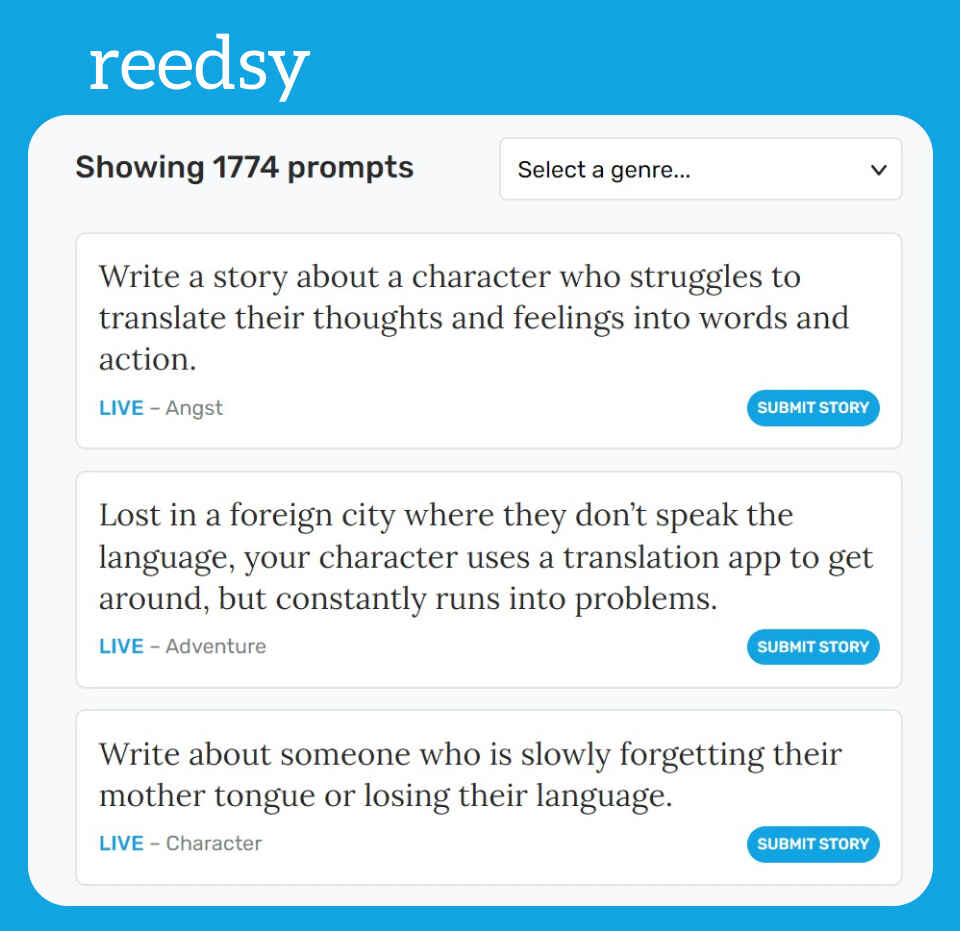
If you’re struggling for motivation, how does a hard deadline and a little prize money sound? Prompts-based writing contests are a fantastic way to dive into creative writing: the combination of due dates, friendly rivalries, prize money, and the potential to have your work published is often just what’s needed to propel you over the finish line.
We run a weekly writing contest over on Reedsy Prompts, where hundreds of writers from all around the world challenge themselves weekly to write a short story between 1,000 and 3,000 words for a chance to win the $250 prize. Furthermore, the community is very active in providing constructive feedback, support, and accountability to each other 一 something that will make your efforts even more worthwhile.
Take a peek at our directory of writing contests which features some of the most prestigious open writing competitions in the world.
2. Start journaling your days
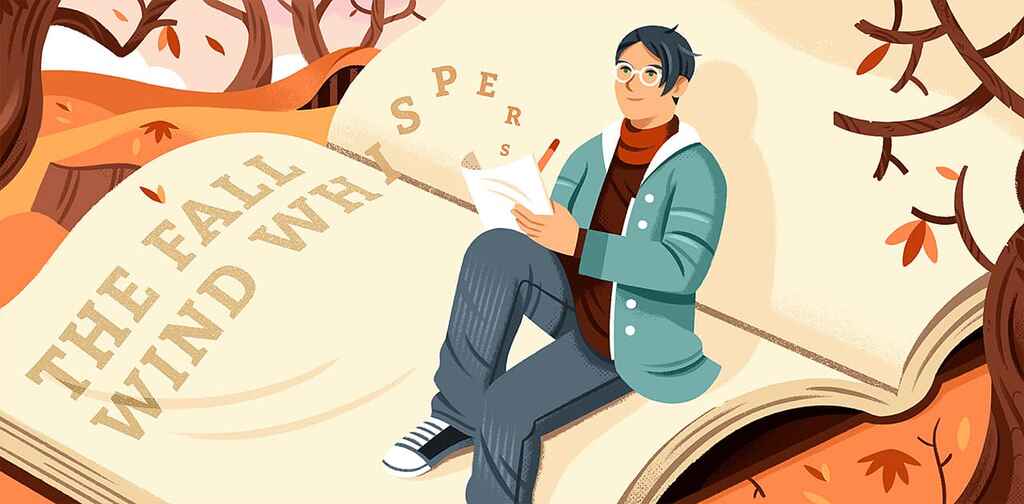
Another easy way to get started with creative writing is to keep a journal. We’re not talking about an hour-by-hour account of your day, but journaling as a way to express yourself without filters and find your ‘voice in writing’. If you’re unsure what to journal about, think of any daily experiences that have had an impact on you, such as…
Special moments . Did you lock yourself out of your house? Or did you catch a beautiful sunset on your way back from groceries? Capture those moments, and how you felt about them.
People . Did you have an unusual exchange with a stranger at the bar? Or did you reconnect with someone you haven’t seen in years? Share your thoughts about it.
World events . Is there something happening in the world right now that is triggering you? That’s understandable. You can reflect on it (and let some steam off) while journaling.
Memories . Did you go down memory lane after a glass of wine? Great, honor those memories by trying to recollect them in detail on paper so that they will always stay vivid in your mind.
Life decisions . Are you having an existential crisis about what to do with your life? Write down your thought process, and the pros and cons of the possible decisions in front of you. You’ll be surprised to discover that, not only is it a great creative writing exercise, but it can also actually help you sort your life out!
If you struggle to write consistently, sign up for our How to Write a Novel course to finish a novel in just 3 months.

NEW REEDSY COURSE
How to Write a Novel
Enroll in our course and become an author in three months.
3. Create an anonymous social media account

Like anonymous blogging, an incognito Twitter account sidesteps the pressure that comes with attaching your name to your work. Anonymously putting tiny stories out into the ether gives you the freedom to create without worrying about the consequences — which is great, so long as you don’t use it as an opportunity to troll people or spread conspiracy theories.
You could use the anonymous account in different ways. For example, you could…
- Tweet from unique points of view (e.g. a dog observing human behavior );
- Create a parody account of real or fictional people (e.g. an English poet from the Middle Ages );
- Challenge yourself to write tiny flash fiction stories that fit into Twitter threads.
Just remember, you’re not doing this to fool anyone into thinking that your account is real: be a good citizen and mark yourself a fiction account in your bio.

But if you’re not really a social media kinda person, you may enjoy our next tip, which is a bit more on the analog side.

GET ACCOUNTABILITY
Meet writing coaches on Reedsy
Industry insiders can help you hone your craft, finish your draft, and get published.
4. Find an old photo and tell its story

Find a random old photo — maybe on the web, maybe from a photo album in a yard sale — and see what catches your attention. Look closely at it and try to imagine the story behind it. What was happening? Who are the people in it and how are they really feeling? Do they share a relationship, and of what kind? What are their goals and dreams?
In other words, bring the photo to life with your imagination. Don't be afraid to take artistic license with your story, as the goal is to be creative and have fun while writing.
How do you know it’s creative writing?
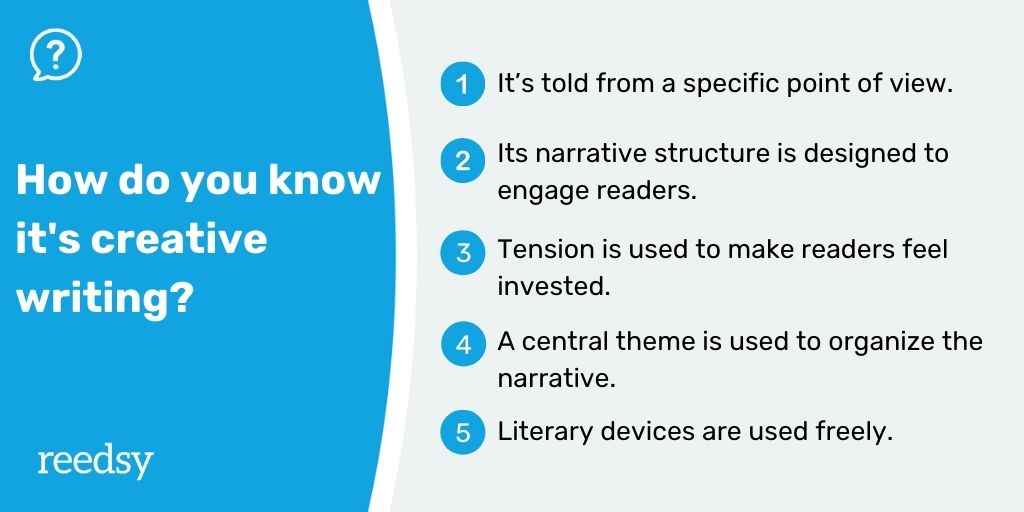
5. Create a character from a random name

Just as our universe started from a few simple elements, you can create a character from a few basic information, like their name, culture, and gender. Reedsy’s handy character name generator can help you with that, offering random names based on archetypes, Medieval roots, fantasy traits and more. A few examples? A Celtic heroine named Fíona O'Keefe, a hero’s sidekick named Aderine, or a Korean track star named Park Kang-Dae.
Once you've chosen their name, begin to develop their personality. Set a timer for 5–10 minutes and write anything that comes to mind about them. It could be a page from their FBI dossier, a childhood diary entry, or simply a scene about them boiling an egg.
Just ‘go with the flow’ and don’t stop writing until your time is up. Repeat the process a few times to further hone the personality. If you like what you end up with, you can always go deeper later with our character profile template .
If a stream-of-consciousness exercise is not your thing, you can try to imagine your character in a specific situation and write down how’d they respond to it. For example, what if they were betrayed by a friend? Or if they were elected in power? To help you imagine situations to put your character in, we made a free template that you can download below.

FREE RESOURCE
Reedsy’s Character Questionnaire
40 questions to help you develop memorable characters.
6. Construct a character by people-watching

People watching is “the action of spending time idly observing people in a public place.” In a non-creepy way, ideally. Sit on a bench on a public square or on a road-side table at your favorite café, and start observing the people around you. Pay attention to any interesting quirks or behaviors, and write it down. Then put on your detective’s hat and try to figure out what that tells you about them.
For example, the man at the table next to you at the restaurant is reading the newspaper. His jacket and hat are neatly arranged next to him. The pages make a whipping sound as he briskly turns them, and he grimaces every time he reads a new article. Try to imagine what he’s reading, and why he’s reacting the way he is. Then, try to build a character with the information you have. It’s a fun creative exercise that will also, hopefully, help you better empathize with strangers.
7. “Map” something you feel strongly about into a new context

Placing your feelings into new contexts can be a powerful creative writing exercise. The idea is to start from something you feel strongly about, and frame it into a completely different context.
For example, suppose your heart is torn apart after you divorce your life-long partner: instead of journaling or crafting an entire novel about it, you could tell a story about a legendary trapeze duo whose partnership has come to an end. If you’re struggling with politicking and petty power dynamics at the office: what if you “mapped” your feelings onto an ant who resents being part of a colony? Directing your frustration at a queen ant can be a fun and cathartic writing experience (that won’t get you in trouble if your co-workers end up reading your story).
8. Capture the moment with a haiku

Haikus are poems from the Japanese tradition that aim to capture, in a few words, daily moments of insight (usually inspired by nature). In a nutshell, it’s about becoming mindful of your surroundings, and notice if you can see something in a new or deeper way 一 then use contrasting imagery to express whatever you noticed.
Here’s an example:
Bright orange bicycle
Speeding through the autumn leaves
A burst of color waves
It may sound a bit complicated, but it shouldn’t be 一 at least not for the purpose of this exercise. Learn the basics of haiku-writing , then challenge yourself to write one per day for a week or month. At the end, you’ll be able to look back at your collection of poems and 一 in the worst case scenario 一 revisit small but significant moments that you would have otherwise forgot about.
Creative writing can be any writing you put your heart and soul into. It could be made for the purpose of expressing your feelings, exploring an idea, or simply entertaining your readers. As you can see there’s many paths to get involved with it, and hundreds of exercises you can use as a starting point. In the next post, we’ll look more in detail at some creative writing examples from some fellow authors.
Join a community of over 1 million authors
Reedsy is more than just a blog. Become a member today to discover how we can help you publish a beautiful book.
Bring your stories to life
Our free writing app lets you set writing goals and track your progress, so you can finally write that book!

1 million authors trust the professionals on Reedsy. Come meet them.
Enter your email or get started with a social account:
- Creativity Techniques
26+ Creative Writing Tips for Young Writers
So you want to be a writer? And not just any writer, you want to be a creative writer. The road to being a legendary storyteller won’t be easy, but with our creative writing tips for kids, you’ll be on the right track! Creative writing isn’t just about writing stories. You could write poems, graphic novels, song lyrics and even movie scripts. But there is one thing you’ll need and that is good creative writing skills.
Here are over 26 tips to improve your creative writing skills :
Read a wide range of books
When it comes to creative writing, reading is essential. Reading allows you to explore the styles of other writers and gain inspiration to improve your own writing. But don’t just limit yourself to reading only popular books or your favourites. Read all sorts of books, everything from fairytales to scary stories. Take a look at comics, short stories, novels and poetry. Just fill your heads with the knowledge and wisdom of other writers and soon you’ll be just like them!
Write about real-life events
The hardest thing about creative writing is connecting emotionally with your audience. By focusing your writing on real-life events, you know that in some way or another your readers will be able to relate. And with creative writing you don’t need to use real names or details – There are certain things you can keep private while writing about the rare details. Using real-life events is also a good way to find inspiration for your stories.
Be imaginative
Be as crazy and wild as you like with your imagination. Create your world, your own monsters , or even your own language! The more imaginative your story, the more exciting it will be to read. Remember that there are no rules on what makes a good idea in creative writing. So don’t be afraid to make stuff up!
Find your writing style
Thes best writers have a particular style about them. When you think of Roald Dahl , you know his books are going to have a sense of humour. While with Dr Seuss , you’re prepared to read some funny new words . Alternatively, when you look at R.L.Stine, you know that he is all about the horror. Think about your own writing style. Do you want to be a horror writer? Maybe someone who always writes in the first person? Will always focus your books on your culture or a particular character?
Stick to a routine
Routine is extremely important to writers. If you just write some stuff here and there, it’s likely that you’ll soon give up on writing altogether! A strict routine means that every day at a certain time you will make time to write about something, anything. Even if you’re bored or can’t think of anything, you’ll still pick up that pencil and write. Soon enough you’ll get into the habit of writing good stuff daily and this is definitely important for anyone who wants to be a professional creative writer!
Know your audience
Writing isn’t just about thinking about your own interests, it’s also about thinking about the interests of your audience. If you want to excite fellow classmates, know what they like. Do they like football , monsters or a particular video game? With that knowledge, you can create the most popular book for your target audience. A book that they can’t stop reading and will recommend to others!
Daily Exercises
To keep your creative writing skills up to scratch it is important to keep practising every day. Even if you have no inspiration. At times when your mind is blank, you should try to use tools like writing prompts , video prompts or other ways of coming up with ideas . You could even take a look at these daily writing exercises as an example. We even created a whole list of over 100 creative writing exercises to try out when you need some inspiration or ideas.
Work together with others
Everyone needs a little help now and then. We recommend joining a writing club or finding other classmates who are also interested in writing to improve your own creative writing skills. Together you can share ideas, tips and even write a story together! A good storytelling game to play in a group is the “ finish the story” game .
Get feedback
Without feedback, you’ll never be able to improve your writing. Feedback, whether good or bad is important to all writers. Good feedback gives you the motivation to carry on. While bad feedback just gives you areas to improve and adapt your writing, so you can be the best! After every piece of writing always try to get feedback from it, whether it is from friends, family, teachers or an online writing community .
Enter writing competitions
The best way to improve your creative writing is by entering all sorts of writing competitions . Whether it’s a poetry competition or short story competition, competitions let you compete against other writers and even help you get useful feedback on your writing. Most competitions even have rules to structure your writing, these rules can help you prepare for the real world of writing and getting your work published. And not only that you might even win some cool prizes!
Keep a notebook
Every writer’s best friend is their notebook. Wherever you go make sure you have a notebook handy to jot down any ideas you get on the go. Inspiration can come from anywhere , so the next time you get an idea instead of forgetting about it, write it down. You never know, this idea could become a best-selling novel in the future.
Research your ideas
So, you got a couple of ideas for short stories. The next step is to research these ideas deeper.
Researching your ideas could involve reading books similar to your ideas or going online to learn more about a particular topic. For example, if you wanted to write a book on dragons, you would want to know everything about them in history to come up with a good, relatable storyline for your book.
Create Writing Goals
How do you know if your writing is improving over time? Simple – Just create writing goals for yourself. Examples of writing goals might include, to write 100 words every day or to write 600 words by the end of next week. Whatever your goals make sure you can measure them easily. That way you’ll know if you met them or not. You might want to take a look at these bullet journal layouts for writers to help you track the progress of your writing.
Follow your passions
Writing can be tedious and many people even give up after writing a few words. The only way you can keep that fire burning is by writing about your true passions. Whatever it is you enjoy doing or love, you could just write about those things. These are the types of things you’ll enjoy researching and already know so much about, making writing a whole lot more fun!
Don’t Settle for the first draft
You finally wrote your first story. But the writing process isn’t complete yet! Now it’s time to read your story and make the all-important edits. Editing your story is more than just fixing spelling or grammar mistakes. It’s also about criticising your own work and looking for areas of improvement. For example, is the conflict strong enough? Is your opening line exciting? How can you improve your ending?
Plan before writing
Never just jump into writing your story. Always plan first! Whether this means listing down the key scenes in your story or using a storyboard template to map out these scenes. You should have an outline of your story somewhere, which you can refer to when actually writing your story. This way you won’t make basic mistakes like not having a climax in your story which builds up to your main conflict or missing crucial characters out.
It’s strange the difference it makes to read your writing out aloud compared to reading it in your head. When reading aloud you tend to notice more mistakes in your sentences or discover paragraphs which make no sense at all. You might even want to read your story aloud to your family or a group of friends to get feedback on how your story sounds.
Pace your story
Pacing is important. You don’t want to just start and then quickly jump into the main conflict because this will take all the excitement away from your conflict. And at the same time, you don’t want to give the solution away too early and this will make your conflict too easy for your characters to solve. The key is to gradually build up to your conflict by describing your characters and the many events that lead up to the main conflict. Then you might want to make the conflict more difficult for your characters by including more than one issue in your story to solve.
Think about themes
Every story has a theme or moral. Some stories are about friendship, others are about the dangers of trusting strangers. And a story can even have more than one theme. The point of a theme is to give something valuable to your readers once they have finished reading your book. In other words, to give them a life lesson, they’ll never forget!
Use dialogue carefully
Dialogue is a tricky thing to get right. Your whole story should not be made up of dialogue unless you’re writing a script. Alternatively, it can be strange to include no dialogue at all in your story. The purpose of dialogue should be to move your story forward. It should also help your readers learn more about a particular character’s personality and their relationship with other characters in your book.
One thing to avoid with dialogue is… small talk! There’s no point in writing dialogue, such as “How’s the weather?”, if your story has nothing to do with the weather. This is because it doesn’t move your story along. For more information check out this guide on how to write dialogue in a story .
Write now, edit later
Writing is a magical process. Don’t lose that magic by focusing on editing your sentences while you’re still writing your story up. Not only could this make your story sound fragmented, but you might also forget some key ideas to include in your story or take away the imagination from your writing. When it comes to creative writing, just write and come back to editing your story later.
Ask yourself questions
Always question your writing. Once done, think about any holes in your story. Is there something the reader won’t understand or needs further describing? What if your character finds another solution to solving the conflict? How about adding a new character or removing a character from your story? There are so many questions to ask and keep asking them until you feel confident about your final piece.
Create a dedicated writing space
Some kids like writing on their beds, others at the kitchen table. While this is good for beginners, going pro with your writing might require having a dedicated writing space. Some of the basics you’ll need is a desk and comfy chair, along with writing materials like pens, pencils and notebooks. But to really create an inspiring place, you could also stick some beautiful pictures, some inspiring quotes from writers and anything else that will keep you motivated and prepared.
Beware of flowery words
Vocabulary is good. It’s always exciting when you learn a new word that you have never heard before. But don’t go around plotting in complicated words into your story, unless it’s necessary to show a character’s personality. Most long words are not natural sounding, meaning your audience will have a hard time relating to your story if it’s full of complicated words from the dictionary like Xenophobia or Xylograph .
Create believable characters
Nobody’s perfect. And why should your story characters be any different? To create believable characters, you’ll need to give them some common flaws as well as some really cool strengths. Your character’s flaws can be used as a setback to why they can’t achieve their goals, while their strengths are the things that will help win over adversity. Just think about your own strengths and weaknesses and use them as inspirations for your storybook characters. You can use the Imagine Forest character creator to plan out your story characters.
Show, don’t tell
You can say that someone is nice or you can show them how that person is nice. Take the following as an example, “Katie was a nice girl.” Now compare that sentence to this, “Katie spent her weekends at the retirement home, singing to the seniors and making them laugh.”. The difference between the two sentences is huge. The first one sounds boring and you don’t really know why Katie is nice. While in the second sentence, you get the sense that Katie is nice from her actions without even using the word nice in the sentence!
Make the conflict impossible
Imagine the following scenario, you are a championship boxer who has won many medals over the year and the conflict is…Well, you got a boxing match coming up. Now that doesn’t sound so exciting! In fact, most readers won’t even care about the boxer winning the match or not!
Now imagine this scenario: You’re a poor kid from New Jersey, you barely have enough money to pay the bills. You never did any professional boxing, but you want to enter a boxing competition, so you can win and use the money to pay your bills.
The second scenario has a bigger mountain to climb. In other words, a much harder challenge to face compared to the character in the first scenario. Giving your characters an almost impossible task or conflict is essential in good story-telling.
Write powerful scenes
Scenes help build a picture in your reader’s mind without even including any actual pictures in your story. Creating powerful scenes involves more than describing the appearance of a setting, it’s also about thinking about the smell, the sounds and what your characters are feeling while they are in a particular setting. By being descriptive with your scenes, your audience can imagine themselves being right there with characters through the hard times and good times!
There’s nothing worse than an ending which leaves the reader feeling underwhelmed. You read all the way through and then it just ends in the most typical, obvious way ever! Strong endings don’t always end on a happy ending. They can end with a sad ending or a cliff-hanger. In fact, most stories actually leave the reader with more questions in their head, as they wonder what happens next. This then gives you the opportunity to create even more books to continue the story and keep your readers hooked for life (or at least for a very long time)!
Over 25 creative writing tips later and you should now be ready to master the art of creative writing! The most important tip for all you creative writers out there is to be imaginative! Without a good imagination, you’ll struggle to wow your audience with your writing skills. Do you have any more creative writing tips to share? Let us know in the comments!
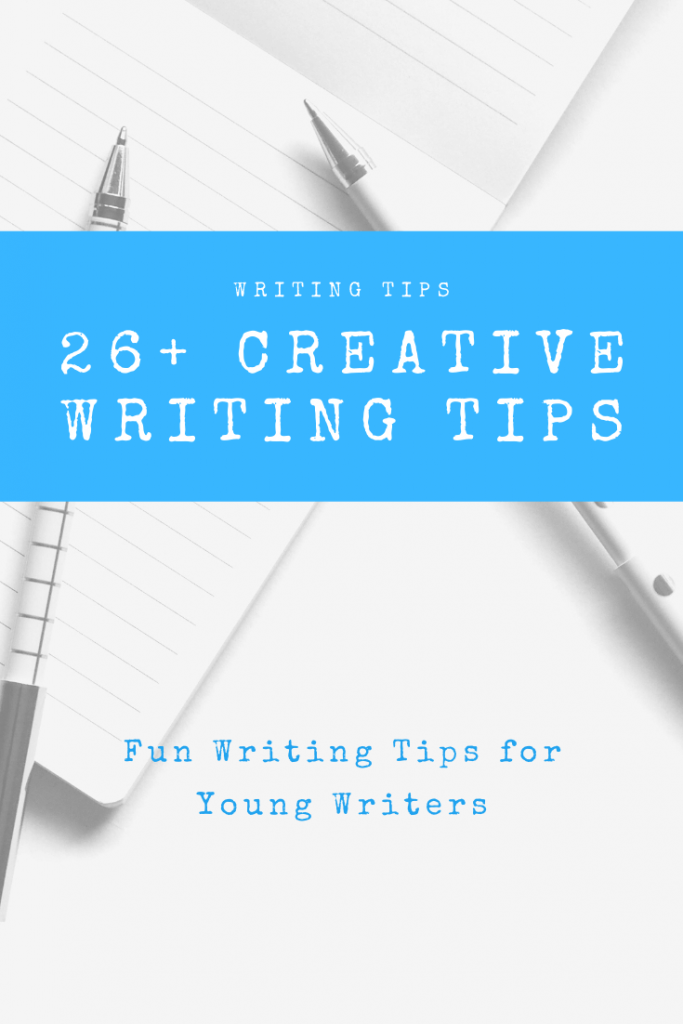
Marty the wizard is the master of Imagine Forest. When he's not reading a ton of books or writing some of his own tales, he loves to be surrounded by the magical creatures that live in Imagine Forest. While living in his tree house he has devoted his time to helping children around the world with their writing skills and creativity.
Related Posts
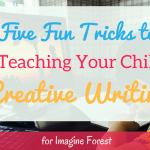
Comments loading...
- Writing Courses Online
- Course Testimonials
latest posts

How to Improve Your Writing in Three Easy Steps


Verbeter Jou Kans Om ʼn Kortverhaal Kompetisie Te Wen Só

Topics to Write About: How to Choose

Free Writing Competition – My Writing Journey

Logical Flow: The Key to Compelling Writing

Can You Make a Living From Travel Writing? We Ask Travel Writer Gabi Logan

Four Habits of Successful Writers

Famous Quotes on Writing

10 Effective Ways to Improve Your Creative Writing

Writing a story is a craft that requires constant tweaks, edits and trial and error by the writer. Here are ten tips to improve your creative writing and save you hours of painful re-writing in the future.
(1) Don’t underestimate your reader
You have a fantastic plot, your characters are realistic, the setting is ideal and you want to make sure that the reader gets every little detail that you have in mind. Great!
The only problem is that you may be tempted to bombard your reader with many intimate details so that they see it exactly as you do. In-depth descriptions can be useful and effective, but don’t overdo it. Keep your writing neat and tight; don’t waste space on long, rambling descriptions about things that aren’t necessary to your story.
Wouldn’t it be ideal if editors received submissions and decided to look past the typos and incorrect formatting because they think it might be a little gem of a story? The fact is that if your manuscript is full of errors or doesn’t follow the required guidelines then it’s going in the trash.
Don’t rely on your computer’s spell checker. If you make a typo, the computer will not warn you if you’ve still spelt a valid word. Your gorgeous heroine meets the bog (boy) of her dreams? The wealthy doctor places his golf ball on his tea (tee)?
(3) Give Your Characters Life
Characters are vital to your story so treat them with care and give them that breath of life that you, the writer, have the power to give. Give them unique characteristics; make them believable by making them have a purpose, motivation and conflicts to resolve.
(4) Use Strong Words
You want your writing to sound decisive, so use words that get the point across. Did Bob’s really big headache cause him a lot of pain or did Bob’s migraine cause excruciating pain? But remember not to overdo it: don’t use words that the reader won’t understand, you want to use strong words, not confusing or extravagant ones.
(5) Show Don’t Tell.
Who hasn’t heard that one before? But it’s a valid point and a useful rule for all writers. Fiction is for entertainment, so entertain your reader! Give them an excuse to escape into the reality that you have created. Let them see, hear, feel, smell, laugh, cry, love and hate. Show your reader the world that you’ve created, don’t just tell them about it.
(6) Check your Commas
While commas can be effective many inexperienced writers tend to sprinkle their sentences with them. When placed incorrectly, commas can chop up your sentences and sometimes even alter the meaning. Brush up on your high-school grammar; your work will improve with that alone.
(7) Grab their Attention from the Start
Opening lines are often referred to as ‘the hook’ because that’s exactly what you want them to be. You get the reader’s attention and reel them in for the rest of the story. Try something powerful to kick-start your story. For example: ‘Mark’s back broke with an audible crack’ or ‘Eliza didn’t realize that she was going blind’ or ‘The bullet that pierced Henry’s back and left him paralyzed was meant for a homeless man’. Each of these lines makes the reader ask ‘why?’ and once they ask that question, the reader will keep on reading until they find the answer.
(8) Give Your Reader a Satisfactory Ending
You can leave the reader speculating or wondering why at the end of your story, but try to resolve as much as you can. If your reader finishes the last sentence and is still asking questions about what happened to who and why, then you still need to tie up the loose ends.
(9) Sober up
Think of writing as going out to a bar: you go out, the lighting is dim, it’s noisy, maybe you drink too much but you meet a person who’s attractive, witty, shares the same interests as you and you’re smitten by them. A few days later you meet for coffee: are they as good looking or charming as you remember?
This can happen with writing. You become intoxicated with the feeling of success and think that you have written an award-winning piece. The question is, once you’ve sobered up, is it as good as you thought it was? Put your manuscript away and try not to think about it for a couple days. Then take it out and read it with a clear, open mind. Read it through once from beginning to end, then break it up into sections, then read it sentence by sentence. Is it as good as you remembered? If so, then well done! But the odds are that if you were too excited about finally wrapping it up, then you’ll find some points to revise.
(10) Challenge Yourself
Are you trying too hard to write in a specific genre or style? Do you only write short stories or novels or poems or movie scripts? Give that creative muscle a workout and try something different. It will be a refreshing exercise for your mind and you might be surprised by the result. If you don’t succeed then you have still learnt a valuable lesson.
About the Author:

Photo Credit: Flickr.com_gudmd.haralds

you might also like


10 Creative Writing Skills and How To Improve Them
Discover 10 Creative Writing skills along with some of the best tips to help you improve these abilities.

Creative writing is a skill that can be used in many different ways. Whether you’re writing a novel, a short story, a poem or even just a grocery list, creative writing can be a helpful and rewarding skill to have. In this guide, we’ll discuss what creative writing is, how it can be used and how you can improve your own creative writing skills.
Imagination
Originality, flexibility, storytelling.
Imagination is an important creative writing skill because it allows you to create new worlds and characters. It also allows you to think outside the box and come up with original ideas. When you practice your imagination, you can improve your ability to think creatively and come up with new ideas.
To improve your imagination, try brainstorming new ideas, daydreaming, or writing short stories or poems. You can also practice visualizing a scene before you write it down. If you can see the scene in your head, it will be easier to write it down.
Creativity is an important skill for writers because it allows them to come up with new ideas and develop new stories. A creative writer can come up with unique characters, settings and plotlines that other writers might not think of. Additionally, creativity can help writers come up with different ways to say things and make their writing stand out.
To be a creative writer, you need to be able to think outside the box and come up with new ideas that haven’t been done before. You also need to be able to develop these ideas into full stories and write them in a way that is unique and interesting.
Originality is important in creative writing because it allows you to stand out from the crowd. When you’re writing a story, poem, essay or any other type of creative work, you want to make sure that it’s original so that it can be appreciated for its own merits.
To be original, you don’t have to come up with something completely new. You can take inspiration from other sources and then add your own twist to it. For example, you can take a plot from a movie you saw and then change the characters or setting. Or you can take a line of poetry and change the words or the order that they’re in.
Being original is a great way to impress your readers and win them over.
Fluency is the ability to read a text quickly, accurately and with proper expression. When we read fluently, we are able to focus on the meaning of the text rather than on decoding the words. Fluent readers are also able to understand multiple meanings of words and can use context to determine the correct meaning.
Fluency is an important skill for writers because it allows them to focus on the content of their writing rather than on the mechanics of writing. When writers are able to focus on the content, they are able to produce better writing.
Flexibility is important in creative writing because it allows you to be open to new ideas and to change your mind as you write. It also allows you to experiment with different styles and genres. When you’re flexible, you can try new things without feeling like you have to stick with one style or genre forever.
Flexibility also allows you to be open to feedback. If you’re flexible, you can listen to feedback and consider whether it would be helpful to change something about your writing. If you’re rigid, you might be less likely to take feedback seriously.
Eloquence is the ability to speak or write in a clear and effective way. It’s a skill that all writers need to have, whether they’re writing fiction or non-fiction. When you’re able to eloquently express your ideas, you’re more likely to engage your readers and keep them interested in what you have to say.
Eloquence comes from practice and experience. The more you write, the more comfortable you’ll feel with the written word. You’ll also start to develop your own style and voice. As you become more eloquent, you’ll be able to better communicate your ideas and tell your story.
Persuasion is an important skill for writers because it allows them to convince their readers to see things their way. When you’re able to persuade your readers, you’re able to influence their thinking and behavior. This is a powerful tool and should be used carefully.
To persuade your readers, you need to understand their perspective and then craft a compelling argument that will convince them to see things your way. You also need to understand the different types of persuasion, including ethical and unethical persuasion.
Storytelling is an important skill for writers because it allows them to connect with their readers and tell a compelling story. A good storyteller can capture their audience’s attention and keep them interested in the story. A writer who is skilled at storytelling can use language to create vivid images in the reader’s mind and build suspense.
Storytelling is also an important skill for public speakers. A good speaker can use storytelling to engage their audience and keep their attention. A skilled storyteller can use language to create vivid images in the mind of their audience and build suspense.
Vocabulary is an important skill for creative writers because it allows them to use language in new and interesting ways. A strong vocabulary can help writers to describe things in detail, create interesting characters and settings, and develop complex plots. Additionally, a good vocabulary can help writers to avoid using clichés and to write in a more original way.
Grammar is important in creative writing because it helps you to communicate your ideas clearly and concisely. Good grammar can also help you to build suspense and create a mood in your writing. Additionally, good grammar can help you to avoid common writing mistakes such as run-on sentences, comma splices and comma errors.
How to Improve Your Creative Writing Skills
1. Read, read, read One of the best ways to improve your writing is to read as much as you can. By reading widely, you expose yourself to different styles of writing and different ways of structuring stories and arguments. The more you read, the more you’ll develop an understanding of what makes good writing and what doesn’t.
2. Write, write, write The only way to get better at writing is to do it. The more you write, the more you’ll develop your own style and voice. It’s also important to experiment with different genres and styles of writing to find the one that suits you best.
3. Get feedback One of the best ways to improve your writing is to get feedback from others. Ask a friend or family member to read your work and give you their honest opinion. If you’re a student, ask your teacher for feedback. If you’re a professional writer, consider hiring a developmental editor.
4. Join a writers’ group Joining a writers’ group is a great way to get feedback on your work, as well as to meet other writers and learn from them. Many writers’ groups meet regularly to discuss their work and offer feedback.
5. Take a class Taking a creative writing class is a great way to improve your writing skills. You’ll get feedback from your instructor and your classmates, and you’ll be able to practice your writing in a structured setting.
6. Use prompts Writing prompts are a great way to get your creative juices flowing. By starting with a prompt, you’ll have something to focus your writing on, and you’ll be less likely to get stuck.
10 Computer Hardware Skills and How To Improve Them
10 deductive skills and how to improve them, you may also be interested in..., what does a soccer referee do, what does a hospice liaison do, what does an infusion nurse do, what does a hospice volunteer coordinator do.
How to Boost Your Creativity – Strategies for Generating Ideas and Overcoming Writer's Block

Do you ever find yourself stuck when it comes to writing or unable to come up with creative solutions to a problem? Don’t worry—you are not alone. Everyone experiences writer's block or a lack of creativity at some point.
At times, as writers, we may be really eager to write about a particular topic, only to be hindered by a mental block that makes it difficult to articulate our thoughts effectively. Despite our passion for writing, we may struggle to develop a cohesive idea that aligns with our intentions.
This common phenomenon is often referred to as " writer's block ," and it affects not only book or article writers but also songwriters.
In this article, we will explore tools that can help writers generate titles aligned with their intentions and also optimize the title for search engine optimization (SEO). Additionally, we will discuss causes and strategies for overcoming writer's block.
What is Writer's Block?
Writer's block is a temporary condition that impedes a writer's ability to produce new written content or causes a significant decrease in creativity and productivity.
This form of mental paralysis can hinder progress on any project or piece of writing, making it difficult to focus, find inspiration, and stay motivated. The resulting frustration can often lead to procrastination and a sense of being stuck, ultimately hindering the completion of a project within the desired timeframe.
What Are the Causes of Writer's Block?
Various factors can lead to writer's block, such as:
- Stress : High levels of stress or exhaustion can make it difficult for writers to concentrate and come up with fresh ideas.
- Fear or self-doubt : Writers struggle with anxiety and self-doubt, which can make it difficult to feel motivated and productive. If you're currently experiencing this type of writer's block, you're not alone.
- Lack of inspiration : Writers may struggle to find new and creative ideas. It's common for writers to face challenges, which result in a lack of motivation and a feeling of being stuck .
- Environmental factors : External factors such as noise or interruptions can disrupt a writer's concentration and hinder their ability to produce quality work.
- Perfectionism : Some writers strive for perfection and may become overwhelmed by the pressure to create flawless content, resulting in difficulty getting started or completing a project.
- Physical or mental health issues : As the saying goes, health is wealth. Medical conditions such as depression, anxiety, or chronic pain can affect a writer's ability to focus and be productive.
- Network Issue : such as low bandwidth or internet disruptions, can cause distractions, and frustrations, and ultimately lead to procrastination. As a result, by the end of the day, you may forget what you had intended to write about initially.
How Do You Overcome Writer's Block and Boost Your Creativity?
- Free writing : keep a journal and write without any expectations or limitations. Simply jot down whatever comes to mind without worrying about grammar or structure. This technique can help generate new ideas and inspire your writing. I use this technique often and find that it helps me overcome writer's block and get started on a new piece.
- Take a break : Stepping away from your work for a short period of time can help refresh your mind and provide a new perspective. When you come back to your writing, you may have a fresh perspective or renewed energy that can help you overcome writer's block and move forward with your project.
- Change your environment : This can also help stimulate creativity. Being in a new location can provide fresh inspiration and break up the monotony of writing in the same place. Consider working in a new setting or taking your writing outdoors to help overcome writer's block. This can help you get inspired.
- Try something new : Experimenting with a new genre, style, or format can spark fresh ideas and inspiration. This strategy has been recommended to me by my sister, and I have found it helpful in breaking out writer's block.
- Practice self-care : Taking care of your physical and mental health is crucial in reducing stress and anxiety, which can hinder creativity and productivity. Prioritizing activities such as exercise, healthy eating, and mindfulness practices can help improve focus and promote a positive mindset, thereby stimulating your mind, and ultimately overcoming writer's block.
- Reading Widely : This exposes you to a variety of writing styles. It can help broaden your perspective, increase knowledge, and spark new ideas. Reading can help overcome writer's block and boost creativity. Additionally, reading widely can also improve your writing skills by observing and learning from other writers' techniques and styles.
- The Art of Brainstorming : This can unleash a flood of ideas and inspire creativity by gathering a diverse group of individuals and fostering an environment that encourages the generation of ideas without criticism or judgment.
- Get organized : When faced with writer's block, getting organized can help clear your mind and provide structure, making it easier to focus and get your creative juices flowing.
Tools to Help to You Overcome Writer's Block
There are tools available that can help you generate ideas for articles. This can help you prevent episodes of writer's block.
Article Idea Generator :
This tool uses advanced algorithms and natural language processing to suggest a variety of SEO-optimized article topics based on user input.
Since it's open-source, it also allows for customization to suit individual writing styles, making it a personalized solution for beating writer's block.
This application assists you in getting rid of distractions by preventing certain websites and apps from interfering with your writing process.
By concentrating solely on your writing, you may be able to overcome writer's block and produce better-quality work.
It's worth noting that Freedom has both free and paid versions, and you need to sign up to access all of its features. Additionally, you can download the application to your device.

Headline Generator
The Headline Generator generates attention-grabbing and SEO-friendly titles for social media posts and YouTube captions by analyzing keywords. It saves time, sparks new ideas, and increases engagement and readership. Content creators can use it to boost their online presence.
ProWritingAid
This is an online writing tool that can enhance your writing with suggestions for grammar and style, as well as readability analysis.
By utilizing this tool, you can overcome writer's block and improve the quality of your work. However, you need to sign up to access all of the features.

Writer’s block can be a frustrating and daunting experience for anyone, regardless of skill level. It can sap your creativity and leave you feeling stuck and unmotivated.
Luckily, there are plenty of tools out there to help you overcome writer’s block, boost your creativity, and stay productive.
These are just a few examples of the numerous software tools available to help prevent writer's block. Ultimately, the best tool for you will depend on your individual needs and preferences as a writer.
Keep exploring different tools and trying new things until you find what works best for you.
With some patience and determination, you find yourself writing with renewed energy and enthusiasm.
Here's a helpful article you can read about the power of rest and how it helps you be more creative:
If you found this article helpful, please consider sharing it with other Technical writers who may benefit from it.
If you're interested in reading more of my articles, feel free to check out my blog . Additionally, you can connect with me on Twitter and LinkedIn to stay up-to-date on my latest work.
Thanks for reading💖
👩🏽💻Software developer | Technical writer ✍🏽 | public health❤️🩹
If you read this far, thank the author to show them you care. Say Thanks
Learn to code for free. freeCodeCamp's open source curriculum has helped more than 40,000 people get jobs as developers. Get started
70 Creative Writing Prompts to Inspire You to Write
by Tom Corson-Knowles | 11 comments

Writing prompts are a useful tool and resource for any writer, from beginners to published authors. A good prompt can give you the inspiration you need to craft a paragraph, a book, or an entire series.
You can also use them just for writing practice and to get your creative juices flowing. See where these ideas take you.
Fantasy Writing Prompts
- In your character’s world, only strong magic–users are allowed to survive past their 13th birthday. Your character has no magical ability—but even at 11 years old, they’ve discovered a way to fake it.
- Your character is granted one day in the land of the dead to retrieve their deceased beloved, only to discover that their one true love faked death to escape marriage.
- A mysterious statue appears in the forest that makes perfect duplicates of any human being that touches it. Your character is one such duplicate—and your “sponsor-body” is wanted for murder.
- Your character is a witch-hunter, tasked to track down and slay a powerful target—who is currently pregnant with your character’s child.
- A monster emerges from the forest and forces your character to care for its newborn offspring, which begins to look more human the longer your character cares for it.
- Your character is one of a species of sea creatures that inhabit the very deepest part of the ocean. This species has created an advanced civilization—and they’re getting ready to break the surface and take their rightful place as Earth’s rulers, with your character at the helm.
- Your character discovers that a certain mythical being is real—and they’re about to go extinct.
- Your character falls in love with a magical being. To keep their love alive, your character has to fight not only their family, but their entire race.
Historical Fiction Writing Prompts
- Your character is the daughter of a poor clergyman in mid-19th-century England. Without a dowry, she has little chance for marriage. Without a husband, she’s doomed to a spinster’s life as a governess or servant. In 1854 she joins Florence Nightingale’s group of female nurses bound for the Crimean Peninsula, where she discovers that the hell of war extends into the hospital at Scutari.
- Your character is an artisan in 12th-century Ireland at Clonmacnoise, a monastery that anchored a wealthy community of art, learning, and craftsmanship on the Shannon River. Medieval life is good in this beautiful town … until the Vikings arrive.
- England, 1776: A young astronomer has receives the job of a lifetime: traveling with the famous Captain Cook on his voyage to discover the fabled Northwest Passage. After the rigorous journey takes the crew from Tahiti to Siberia, damage to the ship’s mast forces a stop for repairs in Hawaii. Turns out the natives aren’t as friendly as they thought.
- Your character is one of the hundreds of thousands of craftsman tasked with creating the terracotta army in ancient China. He molds each soldier’s face after someone he knows: his father, his grandfather, a friend from his village, etc., and thinks about their lives and legacies as he works.
- Research the history of your own city or town. Imagine you lived there 50, 100, or even 200 years ago. What would your life have been like?
Horror/Thriller Writing Prompts
- Your character has a stalker with the ability to stop time. The stalker uses this ability to manipulate your character—and their efforts are escalating.
- Your character’s lover died in a horrible accident—but one day they simply return, and nobody but your character remembers that they died.
- Your character and their college friends attend their first off-campus party, and discover too late that the fraternity throwing the bash is a cult—and very serious about the concept of brotherhood.
- Your character is marooned on a tiny desert island. One morning, an idol appears outside their shelter’s front door. It’s stone—except for the real human head on top.
- Your character’s family moves into a new house with an in-ground pool that the previous owners paved over. At night, your character can hear something screaming beneath the concrete—something that isn’t human.
- Your character’s neighbor is an older man who mostly keeps to himself; your character often sees him taking walks or puttering around his garden. But when your character knocks on the old man’s door to invite him to a block party, things take a turn for the sinister.
- Your character is a mobile phone. The phone has just been purchased by a woman who turns out to be a criminal mastermind.
- Your character is a regular office clerk who just discovered that your company is brainwashing its employees. The goal of the company is menacing.
- Your character is on their way to work when they get stuck in a massive traffic jam. Suddenly, in the distance, there is a huge explosion.
- Your character is a serial killer, confessing to his crimes.
- Your character is at a Halloween party at a bar. Everyone is in costume when a man suddenly drops dead.
- Your character is out for a jog early in the morning, trips, and loses consciousness. When they wake up, they are in a morgue surrounded by dead and dissected bodies.
Mystery Writing Prompts
- A powerful pharmaceutical company recently released a new drug to market that dampens the arousal response in human beings. Your character is a private detective brought in to solve an unusual murder. The weapon? A lethal dose of this new drug, which was previously thought to be harmless.
- Your character’s child has been bringing home peculiar drawings from school for the past two weeks. Your character thinks nothing of it, until they realize that each drawing corresponds to one in a series of brutal murders that have plagued their tiny town.
- A marine zoologist is vacationing on a beach in a foreign country when they read about a local political figure who was killed in a shark attack. But from the photos, your character realizes that no shark made those puncture marks on the victim’s stomach—and that the accident may have, in fact, been murder most foul.
- A young police detective must find the kidnapped daughter of a powerful city planner. The hitch? She was at a Star Trek convention when she was kidnapped, and the only description of the culprit is that he “looked like Mr. Spock.”
- After taking a DNA test, your character discovers that their genetic material was altered in the womb. But your character was adopted, and has no records of who their birth parents are, or where they were born.
- Your character has been happily married to their partner for 25 years. But one day, a mysterious stranger shows up claiming to be your partner’s spouse and demanding to know what your character is doing in this stranger’s home.
- Your character is a retired military officer who is ready to leave his past behind him. One day, you accidentally walk in on a bank robbery in progress—and these aren’t ordinary criminals.
- Your character finds out that their deceased twin had multiple passports IDs with different names and faces. To find out more, your character must assume these identities in his place.
- Your character, an important New York businessperson, wakes up naked and alone in a strange, foreign land, with no recollection of how you got there. The native people take you in, but you don’t speak their language and know nothing about the culture. You must learn to communicate in order to get home.
Romance Writing Prompts
- After moving into a new house, your character begins to receive love letters addressed to the previous occupant. The letters have no return address, but they are so beautifully written that your character begins to fall in love with the writer, despite never having met the author.
- Your character is the first person in history to fall in love. They cannot describe the feeling to anybody else, especially not the person for whom they’ve fallen head over heels.
- Your characters have been married for over 700 years; when they die, they are reincarnated with all their memories, and simply find each other again.
- When your character’s country loses a long war, your character is tasked with negotiating the surrender. The person across the table holds the fate of both countries in their hands … and they’re pretty darn cute, too.
- Boy meets girl. Boy falls in love with girl. The catch? Their parents are engaged to be married!
- Your character is a teenager who writes short, fictional romance stories and posts them to a blog that they believe no one reads. One day, a fan starts responding to the stories, and your character connects with the fan on many levels, creating their own idealized, fictional romance story online. Now, they must decide whether they’re willing to let go of their “perfect” love story to meet the real (and inevitably, imperfect) person on the other side of the screen.
- Your character was born deaf and your character’s spouse was just involved in an accident that made them blind. After being together for six years, they must re-learn how to navigate the world together.
- Your character has a mental condition that landed them in a rehab facility. There, your character meets a recovering addict, and they connect instantly and begin to find healing in each other.
- Your character dreams of a person they’ve never met and wakes up convinced it is their true love.
- Your character shows up for an interview for their dream job, and discovers that their could-be boss is also their ex.
Science Fiction Writing Prompts
- Your character wakes up on a slab in a high-tech medical facility, hooked up to strange machines and occupying a body you don’t recognize. Before the doctors arrive, you hear a voice in your head: it’s your new body’s original owner, and they want it back.
- The aliens that land in your backyard strike a deal with your character: Murder one innocent person on the planet, and they will spare the earth. Refuse, or reveal the aliens’ existence to the world, and the planet is doomed.
- Your character is captain of a long-distance spaceship taking thousands of Earthling colonists to a new planet. One day, completely by accident, you discover what this spaceship uses for fuel, and are faced with a terrible moral dilemma of how to handle this information.
- Your main character is the warden of a virtual-reality prison. One day, a notorious murderer attempts to orchestrate a “breakout.”
- Your character is a child whose stuffed toy comes equipped with a nanny-cam and primitive AI. One day, the toy decides to take your character’s safety into its own mitten-like hands.
- Your character is an average college student. Somehow, your character discovers that everything they’re doing—every movement they make and every word they say, even in private—is being tracked and recorded. Now they must figure out who is recording and why—without the recorder knowing what they’re doing.
- Your character washes up on a remote island that has never been visited by an outsider before. Turns out, there’s a whole civilization there—but these “people” have been isolated for so long, they’ve evolved differently than people in the rest of the world.
- Your character is a troubled teenager who discovers that he has the power to see people’s futures by touching them. When you accidentally bump into a man on the subway, you see the man piloting a spaceship—and it’s moving towards your city. Now, you must find the man—and convince everyone else that the danger is real.
Comedy Writing Prompts
- Over Christmas, your character’s parents decide to take the family to the Caribbean. The first day there, both of your parents get sunburned and decide to spend the rest of the vacation indoors, leaving you and your little brother to your own devices.
- Your character is a reality TV judge, but not one of the judges that appears on TV—you’re one of the judges that decides which contestants even get to be on TV. After being subjected to a string of terrible singers, your character finally discovers someone great, and finds themselves strangely invested in the success of this contestant.
- Your character is a superfan of a popular musician. They wait in line to get front row seats to every show, spend outrageous amounts of money on paraphernalia on eBay, and have plastered nearly every wall of their apartment with posters and ticket stubs. One day, your character finally gets a chance to meet the musician—and he’s not what anyone expected.
- Your character is a schoolteacher who is watching two kids argue over a toy in the sandbox when suddenly, an alien creature rises out of the sand. The students decide to make it the class pet.
- Your character’s life is extremely mundane, until a stray dog starts showing up on their front porch every day.
Memoir/Nonfiction Writing Prompts
- Describe a time when you wanted to experience a spiritual moment or looked for spiritual guidance. Why were you in this situation? What were you hoping to get from it?
- Tell the story of your life in inverted chronological order.
- What was the happiest moment of your life? What made it the happiest?
- Write about an addiction. Include as much detail as possible, including how it started and your journey to overcoming it.
- Write about an experience that made you feel ashamed or guilty. How did it impact you? What have you done to move on?
- Think about the ways in which you’ve changed over the years. Can you identify any turning points? Be specific and describe those moments.
- Write about a job or career move that changed your life.
- Write about how you met your current partner or spouse. Do you think it was fate? What events led to you two meeting?
- Write about a person who has had a profound impact on your life—either positive or negative. How have you changed because of them? What have they done to cause your life to change?
- Write a biography of someone in your family who immigrated from one country to another.
- Create a cookbook in which every recipe is tied to a specific person or moment in your life.
- Describe something you’ve done that you’re proud of. How did you get to that moment? How can others learn from your experience?
- Tell the story of how the seed of faith was planted in your life. When did your spiritual journey began, who influenced and guided you in discovering your faith, and at what point did you realize you needed to change your life?
- Write about a memory of your favorite pet. What can animals teach us about ourselves?
- Think about a time when you learned a new skill. What made you want to learn it? Who did you learn from? How did you practice? How did you improve?
Creative Writing Prompts Can Boost Your Writing Skills
Using writing prompts can boost your creativity and improve your writing skills in a number of ways by:
- Helping to overcome writer’s block
- Exercising your imagination
- Increasing your rate of practice
- Teaching you more about yourself
If you’re still not sure using a writing prompt would be good for you, that’s great! If you feel you are against using writing prompts, then you have reason enough to explore it.
As they say, the opposite of love is not hate—it’s apathy. Strong feelings mean strong opinions and emotions, and writing with strong emotions can be incredibly productive and healing.
Did you find this post helpful? Let us know in the comments below!
If you liked this post, you might also like:
72 Journal Prompts to Boost Your Creative Writing Skills
Writing Motivation: 7 Tips for Staying Productive
46 Apps and Sites to Improve Your Writing Skills
75 Quotes About Writing for When You Feel Like Putting the Pen Down
Tom Corson-Knowles is the founder of TCK Publishing, and the bestselling author of 27 books including Secrets of the Six-Figure author. He is also the host of the Publishing Profits Podcast show where we interview successful authors and publishing industry experts to share their tips for creating a successful writing career.
11 Comments
Nice prompts! Can you do more on fantasy?
I love this. So helpful
thanks, so glad you found the prompts helpful! :)
Is there a way I can like this blog? I wish it was on Playstore so I could a rate it a 5. Good work, people.
Thank you, Mercy! We’re happy to have you here :)
Thank you for these. I will use some of them for my writing group.
You’re very welcome, we’re glad you liked them! :)
It is very useful for me as a beginner writer. Thankyou for your hard work.
we’re so glad you found these prompts helpful! :)
A useful tool for beginning and continuing writers. Thank you for the endeavor.
Glad you found the prompts helpful, Bernard! :) Let us know how they work for you!

Learn More About
- Fiction (223)
- Nonfiction (71)
- Blogging (47)
- Book Promotion (29)
- How to Get Reviews (9)
- Audiobooks (17)
- Book Design (11)
- Ebook Publishing (13)
- Hybrid Publishing (8)
- Print Publishing (9)
- Self Publishing (70)
- Traditional Publishing (53)
- How to Find an Editor (11)
- Fitness (4)
- Mindfulness and Meditation (7)
- Miscellaneous (117)
- New Releases (17)
- Career Development (73)
- Online Courses (46)
- Productivity (45)
- Personal Finance (21)
- Podcast (179)
- Poetry Awards Contest (2)
- Publishing News (8)
- Readers Choice Awards (5)
- Reading Tips (145)
- Software (18)
- Technology (18)
- Contests (4)
- Grammar (64)
- Word Choice (64)
- Writing a Book (64)
- Writing Fiction (195)
- Writing Nonfiction (79)

- Top Courses
- Online Degrees
- Find your New Career
- Join for Free
7 Ways to Improve Your Writing Skills
Writing, like any other skill, is something you can get better at with time and practice. Learn how.
![how to boost creative writing [Featured Image]: A woman with curly hair and wearing a white long sleeve shirt, writing in her notebook, while sitting in front of her computer.](https://d3njjcbhbojbot.cloudfront.net/api/utilities/v1/imageproxy/https://images.ctfassets.net/wp1lcwdav1p1/Swr0yrIwsHwMYKHTCYbTJ/b42ad0391e4bc6531bac05ac70b6061c/GettyImages-1335876736__1_.jpg?w=1500&h=680&q=60&fit=fill&f=faces&fm=jpg&fl=progressive&auto=format%2Ccompress&dpr=1&w=1000)
From sending emails to preparing presentations, writing is often a day-to-day task in many professions spanning diverse industries. Writing skills go beyond grammar and spelling. Accuracy, clarity, persuasiveness, and several other elements play a part in ensuring your writing is conveying the right message.
In this article, we'll explore various aspects of writing skills and offer tips for improving yours.
If you'd like to start enhancing your writing skills now, two popular options on Coursera are University of California Irvine's Academic English: Writing Specialization and University of Michigan's Good with Words: Writing and Editing Specialization .
What are writing skills?
Writing is a technical skill that you use to communicate effectively through the written word. Though these may vary depending on what you’re writing, there are several that transcend categories. Writing skills can more specifically include:
Sentence construction
Research and accuracy
Persuasiveness
Each of these components can influence the quality of writing.
Why are writing skills important?
Being able to write well is a form of effective communication , which many employers see as a crucial job skill . In fact, strong communication—spanning written, verbal, non-verbal, and visual—is among the nine common employability skills that employers seek in job candidates.
Regardless of your role, with good writing skills, you can clearly transcribe your thoughts into meaningful messages, enabling you to share your ideas, build relationships, and strengthen your professional image.
Learn more: Important Communication Skills and How to Improve Them
How to improve your writing skills
Writing, like any other skill, is something we can get better at with time and practice. Here are some strategies for developing your own written communication:
1. Review grammar and spelling basics.
Grammar and spelling form the foundation of good writing. Writing with proper grammar and spelling communicates your professionality and attention to detail to your reader. It also makes your writing easier to understand.
Plus, knowing when and how to use less-common punctuation, like colons, semicolons, and em-dashes, can unlock new ways to structure sentences and elevate your writing.
If you’re looking to strengthen your grammar and spelling, start by consulting a writing manual. The Elements of Style by William Stunk and E.B. White has long been considered a staple for writers. You can find similar resources at your local library, bookstore, or online.
2. Read what you want to write.
Knowing what a finished piece of writing can look like can guide your own. If you’re trying to write a humorous short story, read humorous short stories. Writing a book review? Find a few and take note of how they’re structured. Pay attention to what makes them good and what you want to emulate (without plagiarizing, of course). If you’re working on a school assignment, you can ask your instructor for examples of successful pieces from past students.
Make reading a part of your everyday life to improve your writing. Try reading the news in the morning or picking up a book before you head to bed. If you haven’t been a big reader in the past, start with topics you’re interested in, or ask friends and family for recommendations. You’ll gradually begin to understand what subjects, genres, and authors you enjoy.
3. Proofread.
While it’s tempting to submit work as soon as you’re done with it, build in some time to revisit what you’ve written to catch errors big and small. Here are a few proofreading tips to keep in mind:
Set your work aside before you edit. Try to step away from your writing for a day or more so you can come back to it with fresh, more objective eyes. Crunched for time? Even allotting 20 minutes between writing and proofreading can allow you to approach your work with renewed energy.
Start with easy fixes, then progress to bigger changes. Starting with easier changes can get you in the rhythm for proofreading, allow you to read through your work once more, and clear distractions so you can focus on bigger edits. Read through your work to catch misspellings, inconsistencies, and grammar errors. Then address the larger problems with structure or awkward transitions.
If you could say something in fewer words, do so. Being unnecessarily wordy can cloud your message and confuse the reader. Pare down phrases that are redundant, repetitive, or obvious.
Read out loud. Reading out loud can help you find awkward phrases and areas where your writing doesn’t flow well.
Should you use computer spelling and grammar tools?
Many computer-based tools—like spell check on your word processor, or Grammarly — can help you find and fix simple spelling and grammar errors. These tools are not perfect but can help even the most seasoned of writers avoid mistakes. Take note of any frequently highlighted words or phrases so that you can avoid the same mistakes in the future.
4. Get feedback.
Whether you’re writing emails or essays, asking for feedback is a great way to see how somebody besides yourself will interpret your text. Have an idea of what you’d like your proofreader to focus on—the structure, conclusion, the persuasiveness of an argument, or otherwise.
Approach a trusted friend, family member, coworker, or instructor. If you’re a student, your school might also have a writing resource center you can reach out to.
You might also consider forming a writing group or joining a writing class. Find writing courses online, at your local community college, or at independent writing workshops in your city.
5. Think about structure.
Grammar and spelling keep your writing consistent and legible, but structure ensures the big ideas get across to the reader.
In many cases, forming an outline will help solidify structure. An outline can clarify what you’re hoping to convey in each section, enable you to visualize the flow of your piece, and surface parts that require more research or thought.
Structure might look different depending on what you’re writing. An essay typically has an introduction, body paragraphs, and a conclusion. A fiction piece might follow the six-stage plot structure: exposition, rising action, climax, falling action, resolution, and denouement. Choose what’s best for your purposes.
Like many skills, one of the best ways to improve your writing is to practice. Here are a few ways you can get started:
Start a journal or a blog.
Join a class or writing workshop.
Practice free writing.
Write letters to friends or family.
Put together an opinion piece for your local newspaper or publication you like.
7. Know some common fixes.
Even if a text is grammatically correct, you may be able to make it more dynamic and interesting with some polish. Here are some common ways you can sharpen your writing:
Choose strong verbs (for example, “sprinted,” “dashed,” or “bolted” instead of “ran”).
Avoid passive voice.
Vary sentence length.
Cut unnecessary words.
Replace cliches with original phrasing.
Showing your writing skills in a job search
Your writing skills will shine throughout the job search process , whether or not you intend to show them off. This is because job applications are largely written materials, including your cover letter , resume , and email communications . Use these opportunities to demonstrate your writing skills to prospective employers by submitting clear, accurate, and engaging materials.
Additionally, if you have specialized expertise, such as experience with legal writing, medical writing, technical writing, or scientific writing, you can note that in a resume skills section and further detail that experience within your cover letter or during your interviews .
Getting started
Whether you’re a scientist or a product manager, journalist or entrepreneur, writing effectively will enable you to communicate your ideas to the world. Through practice, exposure, and familiarizing yourself with basic rules, you’ll be able to use your writing to say exactly what you want to say.
If you’re looking for a structured way to expand your writing skillset, explore writing courses on Coursera —the first week is free.

Build job-ready skills with a Coursera Plus subscription
- Get access to 7,000+ learning programs from world-class universities and companies, including Google, Yale, Salesforce, and more
- Try different courses and find your best fit at no additional cost
- Earn certificates for learning programs you complete
- A subscription price of $59/month, cancel anytime
Give your team access to a catalog of 8,000+ engaging courses and hands-on Guided Projects to help them develop impactful skills. Learn more about Coursera for Business .
Keep reading
Coursera staff.
Editorial Team
Coursera’s editorial team is comprised of highly experienced professional editors, writers, and fact...
This content has been made available for informational purposes only. Learners are advised to conduct additional research to ensure that courses and other credentials pursued meet their personal, professional, and financial goals.

What is Creative Writing? A Key Piece of the Writer’s Toolbox
Not all writing is the same and there’s a type of writing that has the ability to transport, teach, and inspire others like no other.
Creative writing stands out due to its unique approach and focus on imagination. Here’s how to get started and grow as you explore the broad and beautiful world of creative writing!
What is Creative Writing?
Creative writing is a form of writing that extends beyond the bounds of regular professional, journalistic, academic, or technical forms of literature. It is characterized by its emphasis on narrative craft, character development, and the use of literary tropes or poetic techniques to express ideas in an original and imaginative way.
Creative writing can take on various forms such as:
- short stories
- screenplays
It’s a way for writers to express their thoughts, feelings, and ideas in a creative, often symbolic, way . It’s about using the power of words to transport readers into a world created by the writer.
5 Key Characteristics of Creative Writing
Creative writing is marked by several defining characteristics, each working to create a distinct form of expression:
1. Imagination and Creativity: Creative writing is all about harnessing your creativity and imagination to create an engaging and compelling piece of work. It allows writers to explore different scenarios, characters, and worlds that may not exist in reality.
2. Emotional Engagement: Creative writing often evokes strong emotions in the reader. It aims to make the reader feel something — whether it’s happiness, sorrow, excitement, or fear.
3. Originality: Creative writing values originality. It’s about presenting familiar things in new ways or exploring ideas that are less conventional.
4. Use of Literary Devices: Creative writing frequently employs literary devices such as metaphors, similes, personification, and others to enrich the text and convey meanings in a more subtle, layered manner.
5. Focus on Aesthetics: The beauty of language and the way words flow together is important in creative writing. The aim is to create a piece that’s not just interesting to read, but also beautiful to hear when read aloud.
Remember, creative writing is not just about producing a work of art. It’s also a means of self-expression and a way to share your perspective with the world. Whether you’re considering it as a hobby or contemplating a career in it, understanding the nature and characteristics of creative writing can help you hone your skills and create more engaging pieces .
For more insights into creative writing, check out our articles on creative writing jobs and what you can do with a creative writing degree and is a degree in creative writing worth it .
Styles of Creative Writing
To fully understand creative writing , you must be aware of the various styles involved. Creative writing explores a multitude of genres, each with its own unique characteristics and techniques.
Poetry is a form of creative writing that uses expressive language to evoke emotions and ideas. Poets often employ rhythm, rhyme, and other poetic devices to create pieces that are deeply personal and impactful. Poems can vary greatly in length, style, and subject matter, making this a versatile and dynamic form of creative writing.
Short Stories
Short stories are another common style of creative writing. These are brief narratives that typically revolve around a single event or idea. Despite their length, short stories can provide a powerful punch, using precise language and tight narrative structures to convey a complete story in a limited space.
Novels represent a longer form of narrative creative writing. They usually involve complex plots, multiple characters, and various themes. Writing a novel requires a significant investment of time and effort; however, the result can be a rich and immersive reading experience.
Screenplays
Screenplays are written works intended for the screen, be it television, film, or online platforms. They require a specific format, incorporating dialogue and visual descriptions to guide the production process. Screenwriters must also consider the practical aspects of filmmaking, making this an intricate and specialized form of creative writing.
If you’re interested in this style, understanding creative writing jobs and what you can do with a creative writing degree can provide useful insights.
Writing for the theater is another specialized form of creative writing. Plays, like screenplays, combine dialogue and action, but they also require an understanding of the unique dynamics of the theatrical stage. Playwrights must think about the live audience and the physical space of the theater when crafting their works.
Each of these styles offers unique opportunities for creativity and expression. Whether you’re drawn to the concise power of poetry, the detailed storytelling of novels, or the visual language of screenplays and plays, there’s a form of creative writing that will suit your artistic voice. The key is to explore, experiment, and find the style that resonates with you.
For those looking to spark their creativity, our article on creative writing prompts offers a wealth of ideas to get you started.
Importance of Creative Writing
Understanding what is creative writing involves recognizing its value and significance. Engaging in creative writing can provide numerous benefits – let’s take a closer look.
Developing Creativity and Imagination
Creative writing serves as a fertile ground for nurturing creativity and imagination. It encourages you to think outside the box, explore different perspectives, and create unique and original content. This leads to improved problem-solving skills and a broader worldview , both of which can be beneficial in various aspects of life.
Through creative writing, one can build entire worlds, create characters, and weave complex narratives, all of which are products of a creative mind and vivid imagination. This can be especially beneficial for those seeking creative writing jobs and what you can do with a creative writing degree .
Enhancing Communication Skills
Creative writing can also play a crucial role in honing communication skills. It demands clarity, precision, and a strong command of language. This helps to improve your vocabulary, grammar, and syntax, making it easier to express thoughts and ideas effectively .
Moreover, creative writing encourages empathy as you often need to portray a variety of characters from different backgrounds and perspectives. This leads to a better understanding of people and improved interpersonal communication skills.
Exploring Emotions and Ideas
One of the most profound aspects of creative writing is its ability to provide a safe space for exploring emotions and ideas. It serves as an outlet for thoughts and feelings , allowing you to express yourself in ways that might not be possible in everyday conversation.
Writing can be therapeutic, helping you process complex emotions, navigate difficult life events, and gain insight into your own experiences and perceptions. It can also be a means of self-discovery , helping you to understand yourself and the world around you better.
So, whether you’re a seasoned writer or just starting out, the benefits of creative writing are vast and varied. For those interested in developing their creative writing skills, check out our articles on creative writing prompts and how to teach creative writing . If you’re considering a career in this field, you might find our article on is a degree in creative writing worth it helpful.
4 Steps to Start Creative Writing
Creative writing can seem daunting to beginners, but with the right approach, anyone can start their journey into this creative field. Here are some steps to help you start creative writing .
1. Finding Inspiration
The first step in creative writing is finding inspiration . Inspiration can come from anywhere and anything. Observe the world around you, listen to conversations, explore different cultures, and delve into various topics of interest.
Reading widely can also be a significant source of inspiration. Read different types of books, articles, and blogs. Discover what resonates with you and sparks your imagination.
For structured creative prompts, visit our list of creative writing prompts to get your creative juices flowing.
Editor’s Note : When something excites or interests you, stop and take note – it could be the inspiration for your next creative writing piece.
2. Planning Your Piece
Once you have an idea, the next step is to plan your piece . Start by outlining:
- the main points
Remember, this can serve as a roadmap to guide your writing process. A plan doesn’t have to be rigid. It’s a flexible guideline that can be adjusted as you delve deeper into your writing. The primary purpose is to provide direction and prevent writer’s block.
3. Writing Your First Draft
After planning your piece, you can start writing your first draft . This is where you give life to your ideas and breathe life into your characters.
Don’t worry about making it perfect in the first go. The first draft is about getting your ideas down on paper . You can always refine and polish your work later. And if you don’t have a great place to write that first draft, consider a journal for writing .
4. Editing and Revising Your Work
The final step in the creative writing process is editing and revising your work . This is where you fine-tune your piece, correct grammatical errors, and improve sentence structure and flow.
Editing is also an opportunity to enhance your storytelling . You can add more descriptive details, develop your characters further, and make sure your plot is engaging and coherent.
Remember, writing is a craft that improves with practice . Don’t be discouraged if your first few pieces don’t meet your expectations. Keep writing, keep learning, and most importantly, enjoy the creative process.
For more insights on creative writing, check out our articles on how to teach creative writing or creative writing activities for kids.
Tips to Improve Creative Writing Skills
Understanding what is creative writing is the first step. But how can one improve their creative writing skills? Here are some tips that can help.
Read Widely
Reading is a vital part of becoming a better writer. By immersing oneself in a variety of genres, styles, and authors, one can gain a richer understanding of language and storytelling techniques . Different authors have unique voices and methods of telling stories, which can serve as inspiration for your own work. So, read widely and frequently!
Practice Regularly
Like any skill, creative writing improves with practice. Consistently writing — whether it be daily, weekly, or monthly — helps develop your writing style and voice . Using creative writing prompts can be a fun way to stimulate your imagination and get the words flowing.
Attend Writing Workshops and Courses
Formal education such as workshops and courses can offer structured learning and expert guidance. These can provide invaluable insights into the world of creative writing, from understanding plot development to character creation. If you’re wondering is a degree in creative writing worth it, these classes can also give you a taste of what studying creative writing at a higher level might look like .
Joining Writing Groups and Communities
Being part of a writing community can provide motivation, constructive feedback, and a sense of camaraderie. These groups often hold regular meetings where members share their work and give each other feedback. Plus, it’s a great way to connect with others who share your passion for writing.
Seeking Feedback on Your Work
Feedback is a crucial part of improving as a writer. It offers a fresh perspective on your work, highlighting areas of strength and opportunities for improvement. Whether it’s from a writing group, a mentor, or even friends and family, constructive criticism can help refine your writing .
Start Creative Writing Today!
Remember, becoming a proficient writer takes time and patience. So, don’t be discouraged by initial challenges. Keep writing, keep learning, and most importantly, keep enjoying the process. Who knows, your passion for creative writing might even lead to creative writing jobs and what you can do with a creative writing degree .
Happy writing!
Brooks Manley

Creative Primer is a resource on all things journaling, creativity, and productivity. We’ll help you produce better ideas, get more done, and live a more effective life.
My name is Brooks. I do a ton of journaling, like to think I’m a creative (jury’s out), and spend a lot of time thinking about productivity. I hope these resources and product recommendations serve you well. Reach out if you ever want to chat or let me know about a journal I need to check out!
Here’s my favorite journal for 2024:

Gratitude Journal Prompts Mindfulness Journal Prompts Journal Prompts for Anxiety Reflective Journal Prompts Healing Journal Prompts Cognitive Behavioral Therapy Journal Prompts Mental Health Journal Prompts ASMR Journal Prompts Manifestation Journal Prompts Self-Care Journal Prompts Morning Journal Prompts Evening Journal Prompts Self-Improvement Journal Prompts Creative Writing Journal Prompts Dream Journal Prompts Relationship Journal Prompts "What If" Journal Prompts New Year Journal Prompts Shadow Work Journal Prompts Journal Prompts for Overcoming Fear Journal Prompts for Dealing with Loss Journal Prompts for Discerning and Decision Making Travel Journal Prompts Fun Journal Prompts
Inspiring Ink: Expert Tips on How to Teach Creative Writing
You may also like, what color represents creativity.
How to Start a Bullet Journal + 25 Bullet Journal Ideas
The road to creative brilliance: embracing the explicit-implicit interaction (eii) theory, leave a reply cancel reply.
Save my name, email, and website in this browser for the next time I comment.
- Productivity
- Favorite Journals
- Bipolar Disorder
- Therapy Center
- When To See a Therapist
- Types of Therapy
- Best Online Therapy
- Best Couples Therapy
- Best Family Therapy
- Managing Stress
- Sleep and Dreaming
- Understanding Emotions
- Self-Improvement
- Healthy Relationships
- Student Resources
- Personality Types
- Guided Meditations
- Verywell Mind Insights
- 2024 Verywell Mind 25
- Mental Health in the Classroom
- Editorial Process
- Meet Our Review Board
- Crisis Support
How to Boost Creativity
Kendra Cherry, MS, is a psychosocial rehabilitation specialist, psychology educator, and author of the "Everything Psychology Book."
:max_bytes(150000):strip_icc():format(webp)/IMG_9791-89504ab694d54b66bbd72cb84ffb860e.jpg)
Amy Morin, LCSW, is a psychotherapist and international bestselling author. Her books, including "13 Things Mentally Strong People Don't Do," have been translated into more than 40 languages. Her TEDx talk, "The Secret of Becoming Mentally Strong," is one of the most viewed talks of all time.
:max_bytes(150000):strip_icc():format(webp)/VW-MIND-Amy-2b338105f1ee493f94d7e333e410fa76.jpg)
Creativity is the ability to come up with or recognize ideas to solve problems, communicate with others, or entertain.
Creativity is all about finding new ways of solving problems and approaching situations. This isn't a skill restricted to artists, musicians, writers, or "right-brained" thinkers; it is a useful skill for people from all walks of life . If you've ever wanted to boost your creativity , these tips can help.
Commit Yourself to Creativity
The first step to increasing creativity is to devote yourself to developing your creative abilities. Do not put off your efforts. Set goals, enlist the help of others, and put aside time each day to develop your skills. For example, if you are interested in painting, schedule time regularly to learn and practice your skills.
Boost Creativity by Becoming an Expert
One of the best ways to develop creativity is to become an expert in this area. By having a rich understanding of the topic, you will be better able to think of novel or innovative solutions to problems. One way to develop expertise is by reading about creative people and listening to them speak.
Reward Your Curiosity
One common roadblock to developing creativity is the sense that curiosity is an indulgence. Rather than reprimanding yourself for following an internet rabbit hole, reward yourself when you are curious about something. Give yourself the opportunity and the time to explore new topics.
Rewarding yourself is important, but developing intrinsic motivation is also crucial. Sometimes, the true reward of creativity is the process itself, not the product.
Take Risks to Build Creativity
When it comes to building your creative skills, you must be willing to take risks to advance your abilities. Although your efforts may not lead to success every time, you will still be boosting your creative talents and building skills that will serve you well in the future.
For example, sharing your work in a creative writing course might feel intimidating. But the critique you receive from classmates and teachers can be invaluable.
Build Your Confidence
Insecurity in your abilities can suppress creativity, which is why it is important to build confidence. Note your progress, commend your efforts, and always be on the lookout for ways to reward your creativity.
Make Time for Creativity
You won't be able to develop your creative talents if you don't make time for them. Schedule some time each week to concentrate on some type of creative project.
Making time for creativity might involve saying no to some things that are draining your available time, or even choosing to let go of things in your schedule that are not bringing you joy. Sometimes, it might even involve asking others to help with tasks or take care of childcare and other household duties so you have some free time for your creative pursuits.
Overcome a Negative Attitude
Focus on eliminating negative thoughts or self-criticisms that may impair your ability to develop strong creative skills. Recognize these as roadblocks and work to overcome them.
When you find yourself dwelling on negative thinking, make an active effort to challenge those faulty ideas and replace them with more realistic or positive ones.
Fight Fear of Failure
The fear that you might make a mistake or fail in your efforts can paralyze progress. Whenever you find yourself harboring such feelings, remind yourself that mistakes are simply part of the process. While you may occasionally stumble on your path to creativity, you will eventually reach your goals.
Brainstorm New Ideas
Brainstorming is a common technique in both academic and professional settings, but it can also be a powerful tool for increasing creativity.
Start by suspending your judgment and self-criticism. Then start writing down related ideas and possible solutions. The goal is to generate as many ideas as possible in a relatively short span of time. Next, focus on clarifying and refining your ideas in order to arrive at the best possible choice.
As unlikely as this may seem, recent research points to dim light as a trigger for creativity. Darkness may free you from perceived constraints and encourage you to take creative risks that may seem intimidating in bright lighting.
Explore Multiple Solutions
The next time you approach a problem , try looking for a variety of solutions. Instead of simply going with the first idea you have, take the time to think of other possible ways to approach the situation. This simple activity is a great way to build both problem-solving and creative thinking skills.
Keep a Creativity Journal
Start keeping a journal to follow your creative process and track the ideas you produce. A journal is a great way to reflect back on what you have accomplished and look for other possible solutions. This journal can be used to save ideas that can later serve as future inspiration.
Use Mind Maps and Flow Charts
A mind map is a way to connect ideas and look for innovative answers to questions. Create a mind map by writing down a central topic or word. Next, link related terms or ideas around the central word. While similar to brainstorming, this technique allows for branching ideas and offers a very visual way of seeing how ideas are linked.
As you start to develop a new project, create a flow chart to track the project from start to finish. Look for various paths or sequences of events that might occur. A flow chart can help you visualize the final product, eliminate potential problems, and create unique solutions.
Challenge Yourself and Create Opportunities
Once you have developed some basic creative skills, it is important to continually challenge yourself to further advance your abilities. Look for more difficult approaches, try out new things, and avoid always returning to the same solutions you have used in the past.
In addition to challenging yourself, you also need to create your own opportunities for creativity. This might involve tackling a new project or finding new tools to use in your current projects.
Try the Six Hats Technique
The "six hats" technique involves looking at a problem from six differing perspectives. By doing this, you can produce more ideas than you might have had you only looked at the situation from one or two points of view.
- Black hat : Use a negative perspective. Which elements of the solution won’t work?
- Blue hat : Think broadly. What is the best overall solution?
- Green hat : Think creatively. What are some alternative ideas?
- Red hat : Look at the situation emotionally. What do your feelings tell you?
- White hat : Look at the situation objectively. What are the facts?
- Yellow hat : Use a positive perspective. Which elements of the solution will work?
Find Inspiration to Boost Creativity
Never expect creativity to just happen. Look for new sources of inspiration that will give you fresh ideas and motivate you to generate unique answers to questions. Read a book, visit a museum, listen to your favorite music or engage in a lively debate with a friend.
Use whatever strategy or technique works best for you. Do you enjoy video games? Research indicates that playing video games can help increase your creativity.
Consider Alternative Scenarios
When approaching a problem, ask "what if..." questions to consider each possible scenario. If you take a specific approach, what will the outcome be?
By looking at these alternatives beforehand, you'll be better able to develop creative solutions to problems.
Try the Snowball Technique
Have you ever noticed how one great idea often leads directly to another? You can take advantage of this by using a "snowball technique" when you are generating ideas for a project. If an idea isn't appropriate for your current work, set it aside to work on later, or implement it in a future project.
Frequently Asked Questions
Strategies that can help stimulate creative thinking include challenging yourself to think about things differently, engaging in leisure activities that reduce stress, having social interactions with other people, and taking a break from a task to go for a walk.
Give yourself time to be creative. Engage in hobbies and pursue the things that spark your interests. Allow yourself to daydream or imagine different scenarios. Perhaps most important, allow yourself the freedom to pursue different ideas and take risks. Not every idea will pan out, but the process and practice will help you boost creativity and develop a stronger imagination.
Franken RE. Human Motivation . 3rd ed. Brooks/Cole Publishing Company.
Steidle A, Werth L. Freedom from constraints: Darkness and dim illumination promote creativity . J Environ Psychol . 2013;35:67-80. doi:10.1016/j.jenvp.2013.05.003
Tilly M. How to create a mind map (+examples) . The Institute of You.
De Bono E. Six Thinking Hats . Penguin, Limited.
Blanco-Herrera JA, Gentile DA, Rokkum JN. Video games can increase creativity, but with caveats . Creat Res J . 2019;31(2):119-131. doi:10.1080/10400419.2019.1594524
By Kendra Cherry, MSEd Kendra Cherry, MS, is a psychosocial rehabilitation specialist, psychology educator, and author of the "Everything Psychology Book."
Purdue Online Writing Lab Purdue OWL® College of Liberal Arts
Welcome to the Purdue Online Writing Lab

Welcome to the Purdue OWL
This page is brought to you by the OWL at Purdue University. When printing this page, you must include the entire legal notice.
Copyright ©1995-2018 by The Writing Lab & The OWL at Purdue and Purdue University. All rights reserved. This material may not be published, reproduced, broadcast, rewritten, or redistributed without permission. Use of this site constitutes acceptance of our terms and conditions of fair use.
The Online Writing Lab at Purdue University houses writing resources and instructional material, and we provide these as a free service of the Writing Lab at Purdue. Students, members of the community, and users worldwide will find information to assist with many writing projects. Teachers and trainers may use this material for in-class and out-of-class instruction.
The Purdue On-Campus Writing Lab and Purdue Online Writing Lab assist clients in their development as writers—no matter what their skill level—with on-campus consultations, online participation, and community engagement. The Purdue Writing Lab serves the Purdue, West Lafayette, campus and coordinates with local literacy initiatives. The Purdue OWL offers global support through online reference materials and services.
A Message From the Assistant Director of Content Development
The Purdue OWL® is committed to supporting students, instructors, and writers by offering a wide range of resources that are developed and revised with them in mind. To do this, the OWL team is always exploring possibilties for a better design, allowing accessibility and user experience to guide our process. As the OWL undergoes some changes, we welcome your feedback and suggestions by email at any time.
Please don't hesitate to contact us via our contact page if you have any questions or comments.
All the best,
Social Media
Facebook twitter.
Explore Jobs
- Jobs Near Me
- Remote Jobs
- Full Time Jobs
- Part Time Jobs
- Entry Level Jobs
- Work From Home Jobs
Find Specific Jobs
- $15 Per Hour Jobs
- $20 Per Hour Jobs
- Hiring Immediately Jobs
- High School Jobs
- H1b Visa Jobs
Explore Careers
- Business And Financial
- Architecture And Engineering
- Computer And Mathematical
Explore Professions
- What They Do
- Certifications
- Demographics
Best Companies
- Health Care
- Fortune 500
Explore Companies
- CEO And Executies
- Resume Builder
- Career Advice
- Explore Majors
- Questions And Answers
- Interview Questions
The Most Important Writing Skills (With Examples)
- Alertness Skills
- Technology Skills
- What Is Work Life Balance
- Reading Comprehension Skills
- Persistence Skills
- Business Skills
- Concentration Skills
- Coordination Skills
- Writing Skills
- Visual Skills
- Time-Management Skills
Find a Job You Really Want In
Strong writing skills are necessary for any career. Being able to write clearly, concisely, and effectively are skills that will serve you well for your entire career. Getting your thoughts down clearly can help with emailing, note taking, and record keeping. Writing is also a major form of communication in most workplaces.
Even if writing has never been your forte, there are certain writing skills that you can focus on to improve it. And if you write for a living, then there afre always opportunities to get better. If you’re looking to improve your writing skills, then this article will highlight important skills and give suggestions to improve them.
Key Takeaways
Some of the most important writing skills include correct grammar, conciseness, and writing for your audience and platform.
Outlining, good organization, and research skills are also important writing skills to have.
You can improve your writing skills by practicing, working with others, and reading.

The top 10 most important professional writing skills
How to improve your writing skills, how to demonstrate your writing skills to a potential employer, writing skills faq, references:.
- Sign Up For More Advice and Jobs
While there are many valuable writing skills, these are some of the most important ones to develop.
Grammar, spelling, and punctuation. Grammatical or spelling errors can be caught by anyone, and will make you look lazy or incompetent. A strong understanding of grammar and spelling are important, but so is the ability to make use of spellcheckers and grammar checking tools.
Poor grammar and spelling can lose you opportunities. Many employers will reject resumes out of hand if they have too many spelling or grammatical errors because it shows a lack of attention to detail. Clients are also less likely to work with business that have typos or grammatical mistakes in their communications.
How to improve: For grammar, style guides are an excellent way to get better with it. Many of them will cover grammar, parts of speech, and how to use punctuation properly — even more obscure ones like semicolons and dashes. Reading and listening to the way that people structure sentences can also help.
For spelling, practice is the best way to get better. English spelling is anything but intuitive, but making use of dictionaries and knowing the roots of words can make it easier. Spellcheckers are also invaluable, as they’ll catch errors and typos.
Outlining. Drawing up an outline can be invaluable in a longer piece of writing, but it can help you organize your thoughts for a piece of any length. Outlines can have many benefits, including helping you organize your thoughts, allowing you to focus on the writing process when you write, and giving your writing structure.
It’s important to note that not every writer is an outliner. Some writers prefer to leave that to the editing process rather than creating an outline up front. If you struggle with organization, then making outlines could help tremulously. Even if you don’t, it’s likely worth trying — it could improve your writing. How to improve: Most people work on an outline from top down. Put in the big ideas first, then flesh out the sub-topics. However, there are many different ways to create an outline, and you should experiment until you find one that works for you.
Conciseness. Being direct and getting to the point are good skills to learn to be an effective writer. Remember that the person you’re communicating with has other demands on their time, and will likely be annoyed if your writing is too circuitous.
That being said, being too brief can make you seem laconic. There’s a balance between excessive wordiness and being brusque. It takes practice to get it right, but reading what other people write and reading back what you wrote to yourself can help you get the sense of how it comes off.
How to improve: The best thing to do to avoid being overly wordy is to focus on what it is you want to say. If your natural tendency is to add a lot of unnecessary words, you can cut those out. If you tend to be so direct that you leave out information, add some extra when you read over it again.
As with all communication, context matters. Who you’re talking to can change the way you’d put something, as well as the sort of news you want to convey. Sometimes being less direct is preferable. For most business communications, however, it’s considered polite to take up as little of the other person’s time as possible.
Word choice. While this may seem obvious, word choice is a key writing skill. The words you choose convey different tones and meanings, even if they’re synonyms. There are noticeable differences between:
I apologize for the inconvenience.
I didn’t mean to put you out.
Sorry about the hassle.
The delay was my mistake.
I’m sorry for the trouble.
While all of these sentences convey an apology for a minor problem, the tone and connotation of the words make them all feel different. Some are less formal, some less genuinely apologetic.
How to improve: This largely boils down to practice. People typically have a particular voice when they write, just as when they speak. However, if you consider how you alter your speech patterns depending on the situation, that gives you a major clue as to how to alter your writing to fit the occasion.
Dictionaries and thesauruses are wonderful resources for this. If you want to find a different way to say a word, then the thesaurus will give you a list of synonyms — but each word has its own unique connotation. That means you can say exactly what you want to say.
Editing. Being able to edit is arguably the most important skills writers need to learn. Every writer will tell you that first drafts aren’t fit to put out there. How do you get a first draft to become a polished pice of writing? Editing!
If possible, it’s best to return to edit your writing after letting it sit for a while. Of course that isn’t always possible, but at the very least you’ll need to reread what you’ve written. And if you make chances, you should read it again, as you can end up with some very peculiar sentence structures that way.
How to improve: Again, practice is the best way to improve your editing skills. That being said, reading is another excellent way to get better at it. Knowing how others phrased things or got their point across is a great way to learn.
Having someone else read your writing can also be invaluable, particularly if they’re a proficient writer themselves. But even if they aren’t, they can point out issues in your sentence structure or will notice phrasing or word choice that doesn’t come of the way you intended it to.
Tailor your writing to your audience. Always keep in mind your audience when writing anything for work.
This is important not just for maximizing the clarity of your writing, but also for making clients, managers, and stakeholders feel that you understand them and their needs.
Depending on the audience, consider the appropriate:
Tone. The proper tone to use depends on the audience and type of document.
For example, when writing to consumers, you typically want to communicate with a conversational tone that makes them feel like they’re talking to a real person.
If you’re writing to business-to-business clients or creating project proposals , on the other hand, then you should adopt a more professional tone.
Terminology. Consider whether all parties reading any document you’re writing will understand all the contained terminology.
If you’re an engineer writing a training guide for a piece of software, you’ll want to use more general language if the guide is meant for new hires than if it’s for existing team members.
How to improve: Spend time reading writing that is aimed at a particular audience. Work to imitate it, making sure that your writing feels genuine. The more you read and write to this particular audience, the more natural it’ll become.
Research. Being able to do research is another important writing skill. It’s important to establish credibility in your writing by knowing what you’re talking about — and not being caught using incorrect information. If you do your research, too, you can make use of:
Numbers. Statistics and numbers are highly meaningful and memorable, making them great rhetorical tools for conveying your points to others. Being able to quote numbers and percentages also makes you appear knowledgable and like you’ve done your research.
Testimonials. Human brains are wired to highly-value social proof. If you can demonstrate that your boss , colleagues, or previous clients trust you, that’ll make a strong, positive impression on the party you’re currently dealing with.
Citations. If you’re serious about your research, you should include citations to your research materials. While this won’t be necessary for most communications, if you’re trying to prove a point or sell an idea, citing reputable sources strengthens your position.
How to improve: Being good at research is another skills that takes practice, And, believe it or not, research. You need to gain the skills and knowledge to recognize a reputable source, and take information you’ve obtained and turn towards the point you’re trying to make.
Knowing when to stop. One of the hardest things for many writers is letting go. There’s only so much editing you can do before you’re no longer improving what you wrote, and instead just changing it.
How to improve: Take breaks from your writing. Many people will get stuck in a cycle of reading and rereading what they wrote and seeing anything that could be perceived as a flaw. Chances are when you return to it, it’ll be better than you thought it was.
Adapting for the platform. The writing techniques you use don’t just vary by audience, but by the platform as well.
If you’re tasked with writing an email, social media post, or blog post, make sure to research strategies and writing samples for that particular platform before you begin.
How to improve: Different platforms have different ways that their text is presented. Some have different styles as well, due to either limitations or legacy. Using the platform is a good way to learn about the differences in style and writing. Then you work to imitate it.
Organization and structure. Most people tend to dedicate 80% of their attention to the first 20% of any piece of writing they read.
This means that for business emails and documents, a disorganized and illogical structure could cause readers to miss important language.
A few helpful tips for structuring your writing are:
Put the important information at the front. Especially for business emails, most people will appreciate it if you get straight to the point.
Separate different thoughts. The smaller your walls of text, the more legible it’ll be and the more willing people will be to do more than just skim it.
After you write an email or document, read over it and identify where cohesive thoughts start and end, then simply separate them with blank lines.
How to improve: Improving the structure of your writing boils down to putting time into the structure. Remember how essays had a format you had to follow? Most professional writing is the same way. Making use of outlines and making sure that your thoughts are ordered is an excellent start. And don’t be afraid to rearrange things in an edit to make it more organized.
If, after reading this article, you feel that some of your writing skills aren’t up to par, there are a few ways you can improve them, including practicing, working with others, and reading.
Practice, practice, practice. The more you write, the better you get. If you have an idea for an article — even if it’s just a paragraph — write it down. Say yes to projects that involve writing, and keep a journal of your ideas or random writing projects. No one has to read it, so take the pressure off and just write.
Read your work out loud. Before you publish, submit, or send anything you’ve written, read it out loud first. This will help you see errors and awkward sections that your eye would’ve skimmed over otherwise, and it’ll help you start to notice your voice, bad habits, and strong points.
Involve someone else in your writing. Whether it’s asking someone to edit your work, taking a class, or finding a writing partner , getting someone else’s feedback on your work is invaluable. Even if they aren’t necessarily a writing expert , they can tell you where they’re confused or fully engaged, which is valuable in itself.
Read all you can. The more good writing you read, the better writer you become. You’ll start to subconsciously incorporate what you read into your own writing, and you’ll get a better idea of what voice and style you want to emulate. Even if it’s just 30 minutes a day, set aside time to read well-written articles and books.
Claiming to have excellent writing skills and showcasing them are two different things. However, if you’re looking to do so professionally, there are several different ways that good writers can showcase their skills.
Resume. If you’re saying that you’re a good writer, you’d better write a good resume. Resumes are how employers are introduced to prospective employees, meaning that they’re how you make a good first impression.
Cover letter. Be sure to include a cover letter when you apply for a job. As cover letters shouldn’t be any longer than a page , it’s an excellent way to show that you can convey the needed information concisely and clearly.
Thank you for your consideration email. While thanking recruiters for taking the time to meet with you is always a good idea, sending a well written thank you will up your stock as a competent writer.
What are good writing skills?
Good writing skills are the ability to be clear, concise, and engaging with your writing. Having proper spelling and grammar are also a must. Good writers need to be able to:
Get a point across clearly.
Edit their work.
Make use of research.
Choose the right words.
How do you demonstrate writing skills?
When applying for a job, writing skills can be demonstrated by the resume and cover letter. However, writing skills often don’t need to be directly demonstrated, as they’re shown in day to day communications.
MasterClass — 9 Crucial Skills for Professional Writers
Florida International University — 6 Ways to Improve Your Creative Writing Skills
How useful was this post?
Click on a star to rate it!
Average rating / 5. Vote count:
No votes so far! Be the first to rate this post.

Chris Kolmar is a co-founder of Zippia and the editor-in-chief of the Zippia career advice blog. He has hired over 50 people in his career, been hired five times, and wants to help you land your next job. His research has been featured on the New York Times, Thrillist, VOX, The Atlantic, and a host of local news. More recently, he's been quoted on USA Today, BusinessInsider, and CNBC.
Recent Job Searches
- Registered Nurse Jobs Resume Location
- Truck Driver Jobs Resume Location
- Call Center Representative Jobs Resume Location
- Customer Service Representative Jobs Resume
- Delivery Driver Jobs Resume Location
- Warehouse Worker Jobs Resume Location
- Account Executive Jobs Resume Location
- Sales Associate Jobs Resume Location
- Licensed Practical Nurse Jobs Resume Location
- Company Driver Jobs Resume
Related posts

What Are Compassion Skills? (With Examples)

Concentration: What It Is And How To Improve It

Mechanical Engineer Skills For A Resume

How To Include Spatial Orientation Skills In Your Resume
- Career Advice >
- Resume Skills >
- Productivity Skills >
- Grades 6-12
- School Leaders
NEW: Classroom Clean-Up/Set-Up Email Course! 🧽
Best Websites for Teaching & Learning Writing
Our favorite free and paid writing resources across the web!

Writing is one of the most important skills students can learn in school. Writing skills are linked to reading skills and to overall academic achievement. Luckily, there are loads of interesting and engaging websites to help make writing instruction fun. To help you get started, here’s a list of the best writing websites for teaching and learning.
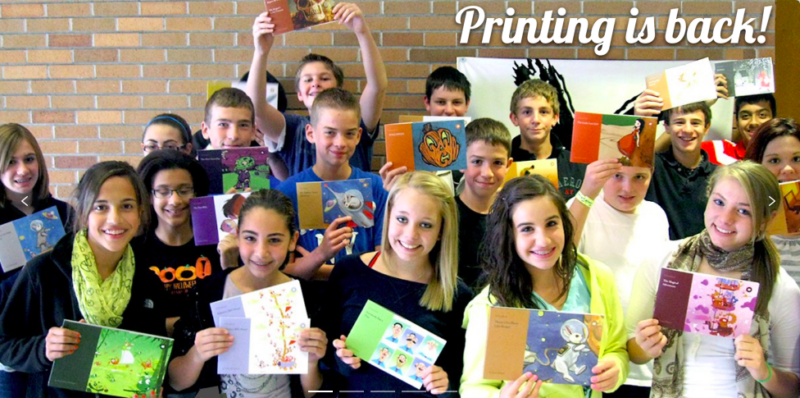
With 9 million members and 800,000 participating K-12 classrooms, Storybird is the world’s largest language arts program. With Storybird, students can create short, visual stories on their own or with friends. In addition, this writing curriculum is aligned with Common Core standards and offers over 600 lessons, quizzes, and writing prompts created by seasoned educators and authors.
Cost: Free trial, subscription
Writing A-Z
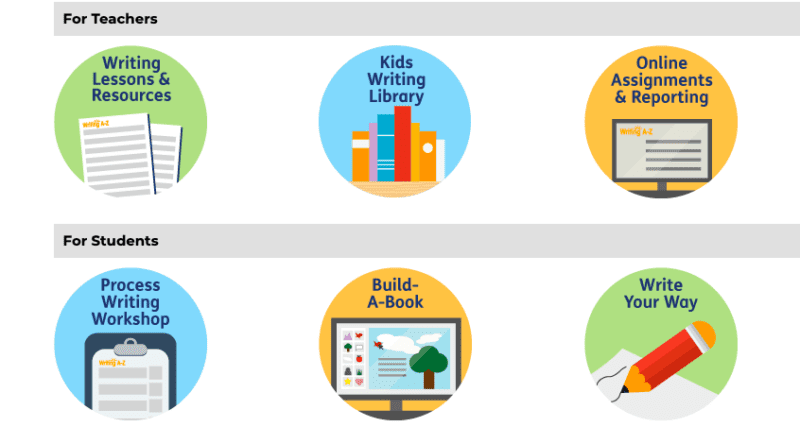
With thousands of downloadable and projectable resources for writing instruction, as well as a collection of interactive online writing tools, Writing A-Z helps teachers meet the needs of every student at every learning level. In addition, teachers can track students’ progress, making individualized instruction a snap.
Story Jumper
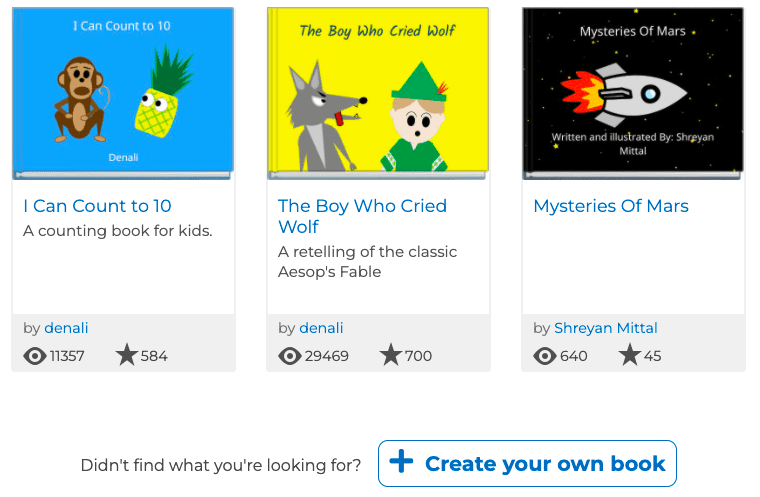
StoryJumper is a free storybook creation site for students in grades 1-8. Students create their own original stories, then add their own artwork or access images from StoryJumper’s library. Kids can write alone, collaborate with classmates or even connect with students around the world. In addition, the site includes teacher guides, writing projects, templates, and more.
Cost: Free, Prices vary for printed books

Features an expansive, curated collection of story-starts created by renowned authors such as Jeff Kinney (Diary of a Wimpy Kid) and Jeff Bruel (Bad Kitty). Students read the first chapter of a story, then write, edit and revise the next chapter themselves online. As a class project, teachers can assign all students the same story starter. Once all the stories are written, students can anonymously read other entries and peer assess and vote for the best version of the story.
Cost: $12.99 per book
Write About

An authentic classroom writing community and publishing platform built by teachers for teachers. Access units and lessons, free choice and creative writing tips, journaling lessons, quick writes, and more for students K-12.
Cost: Free, Premium and Premium Plus versions
Storium.edu
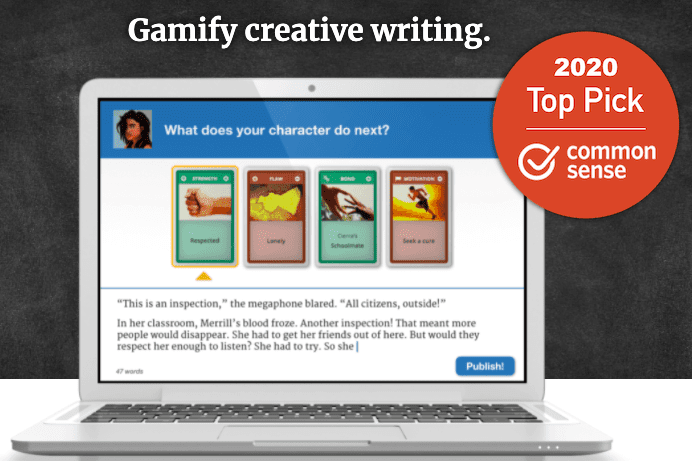
This innovative, collaborative writing game revolves around digital story cards that represent different aspects of storytelling and character development. Along with visual cues, the cards serve as writing prompts, helping students figure out what to write next at each step of the game. Students take turns playing story cards and adding to the story. Paragraph by paragraph, they collaboratively write their own original story simply by playing the game.
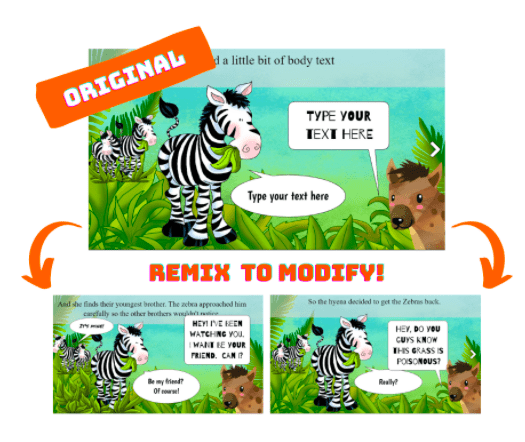
Elementari integrates coding into writing as students create and publish simple interactive and animated digital stories. Using the online platform, students write and code, share, and remix interactive stories using professional illustrations and sounds. Teachers can monitor progress and offer personalized feedback to help students grow as writers.
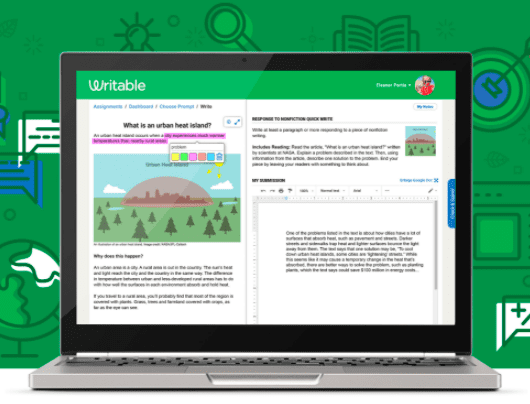
Access 1000+ writing assignments and prompts organized by collection, genre, or grade level with Writable. Scaffold instruction and motivate your students to become purposeful, proficient writers. Also available: Skills activities, graphic organizers, quick writes, response to reading, and much more
Magnetic Poetry
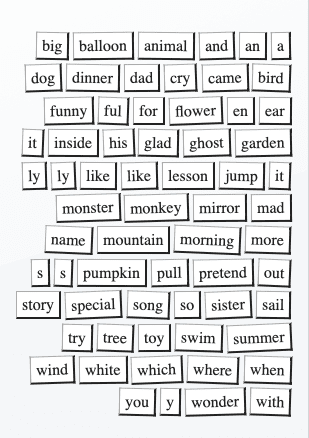
Just like the fridge magnets we all know and love, this tool offers a selection of words and screen space for students to create their own poetry. They can request more words, start over and even share their poetry electronically. Magnetic Poetry is a perfect choice as a writing station or an option during creative play.
Make Beliefs Comix
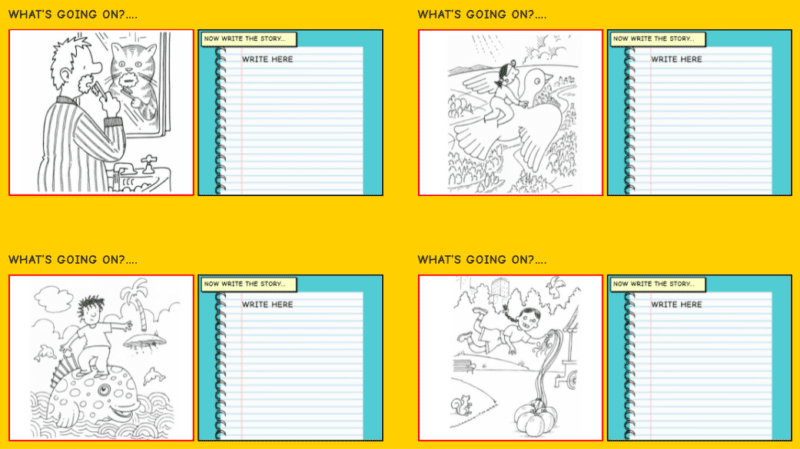
Students of all ages love creating their own worlds through comic strips. MakeBeliefs Comix provides story ideas and comic starters as well as a gallery of comics for inspiration. Students choose from a wide cast of characters with different looks and moods and then write the words and thoughts for them. Also featured on this site: videos, writing tools, lesson plans, a special needs section, and an ideas exchange.
Read, Write, Think
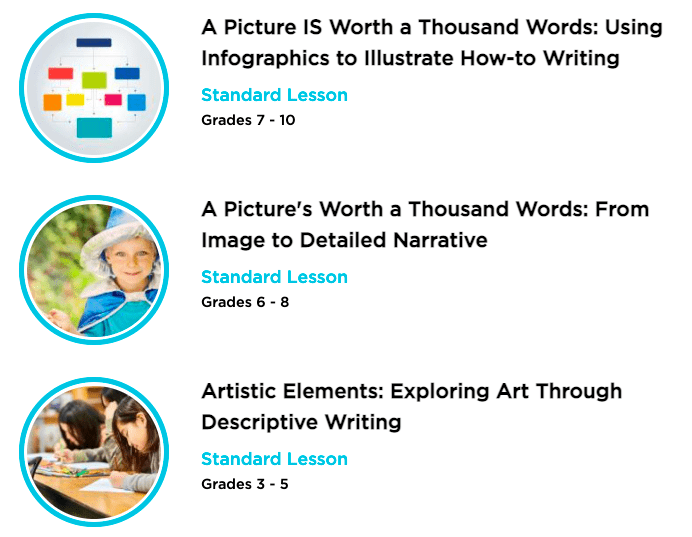
Sponsored by the National Council of Teachers of English, this site offers high-quality, standards-aligned education materials for students K-12. Featuring hundreds of lesson plans, calendar resources, printouts, and interactive tools such as story maps, plot diagrams, timelines, and more.
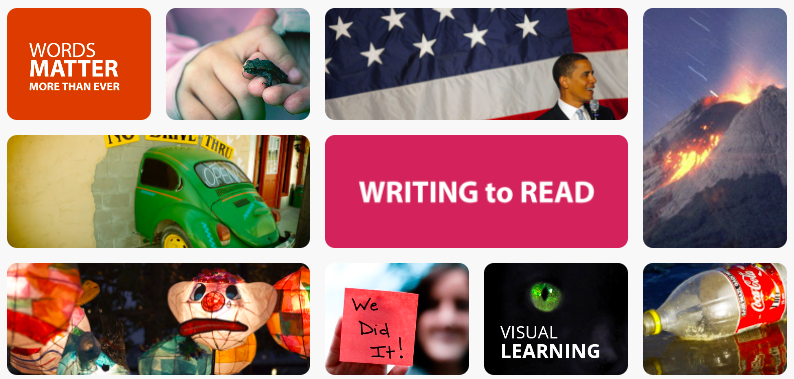
PicLits is an e-learning website that utilizes photography and keywords to improve students’ literacy skills with an emphasis on interactive, visual learning. Inspired by an image, students create a caption, sentence, story, paragraph, poem, or even a quotation to capture the essence, story, and/or meaning of that image.
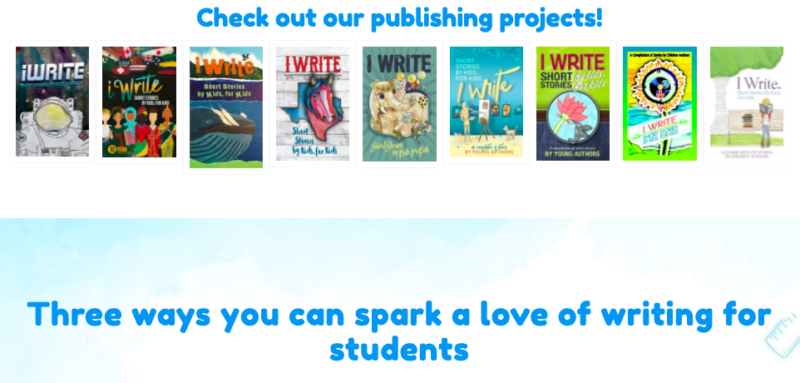
iWrite offers free online creative writing and illustration activities for kids in grades 1-8. In addition, they help writers take advantage of innovative online writing clubs, camps, workshops, and publishing opportunities. iWrite TV offers videos on topics like brainstorming, genre and theme, setting and description. and more.
Grammarly for Education

Grammarly helps students polish up their communication skills. A great student writing aid, it allows students to check their writing for typos, commonly confusing words, tricky sentence structure, and more. And Grammarly has hundreds of informative blogs such as H ow to Write a Research Paper, How to Write a Poem, and Grammar Tips.
Cost: Free basic plan, Subscription Education options.
StoryboardThat

StoryboardThat is an easy drag-and-drop creation platform with cross-curricular applications for writers K-12. With over 3,000 lesson plans and activities , teachers can create materials and lessons for their classes which will help students can take ownership of their voice and learning.
Grammar Girl
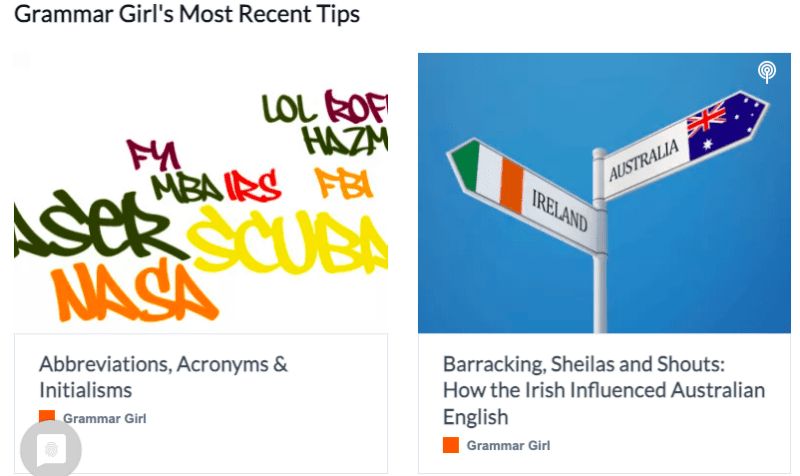
One of Writer’s Digest’s 101 best websites, Mignon Fogarty offers “Quick and Dirty Tips” with blogs and videos such as Top Ten Grammar Myths and Can You Start a Sentence with And to help students become the best writers possible.
NaNoWritMo Young Writers Program
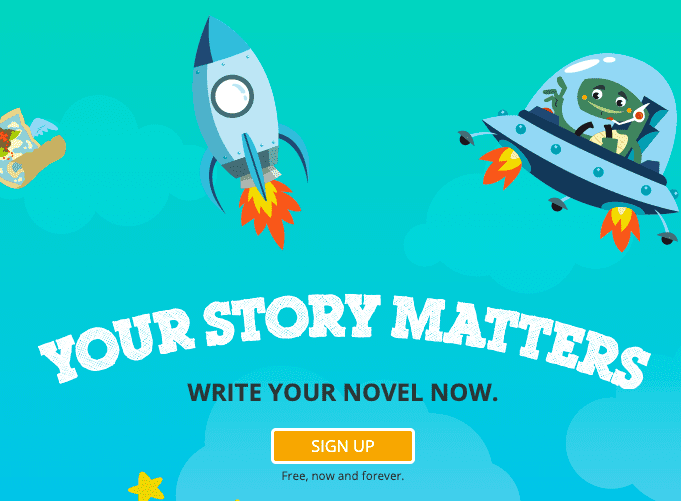
NaNoWritMo’s Young Writers Program supports young writers and K-12 educators as they participate in National Novel Writing Month each November and offers smaller writing challenges year-round. Kids can track their word-count goal for the month and draft their novel right on the site. Plus, they can get support from published authors and an international community of fellow novelists.
Power Poetry
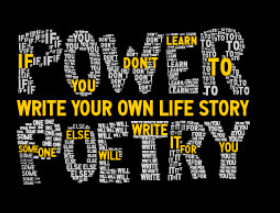
The largest online poetry community in the world and a safe, creative, free place for teen poets and teachers. Chock full of resources, there are lesson plans, classroom activity guides, and printable worksheets to help you in the classroom.
Poetry Foundation Teen Section
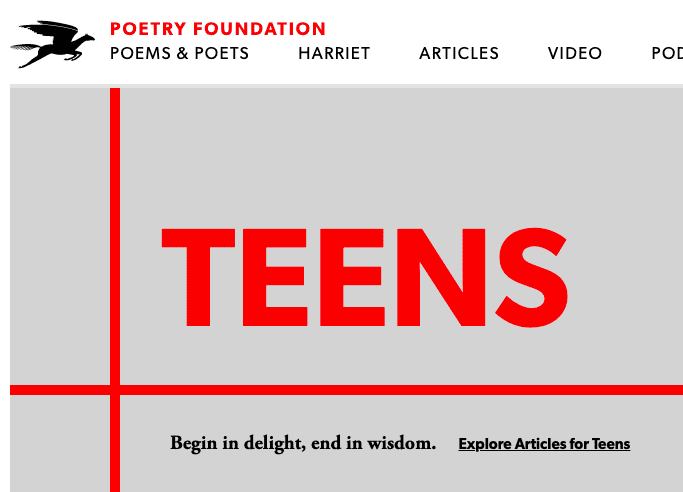
The Poetry Foundation offers a variety of articles, videos and podcasts to help teens in all aspects of poetry. You’ll find tips on understanding and writing poems along with featured poems by famous poets. The Poetry Foundation also has a Children Section as well as a Teacher Section.
Time4Writing

Free writing resources for students K-12 in seven main categories. Each category includes a selection of fun writing games, instructional videos, printable writing worksheets, and other writing tools. This site also offers online courses with writing instruction by certified teachers.
Cost: Free resources, Fees for online courses
What are your favorite writing websites for the classroom? Share in the comments below!
Want more suggestions be sure to subscribe to our newsletter so you can get our latest picks..

You Might Also Like
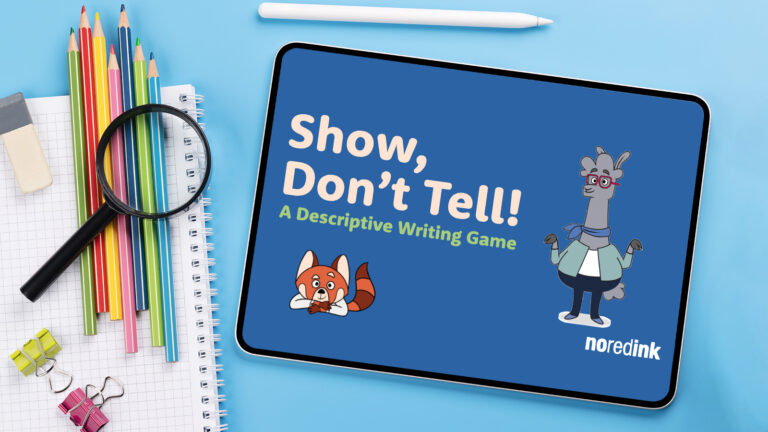
Improve Students’ Writing With This Free “Show, Don’t Tell” Game
"I'm loving the descriptive writing I'm seeing in my students' work!" Continue Reading
Copyright © 2024. All rights reserved. 5335 Gate Parkway, Jacksonville, FL 32256
- Our Mission
Strategies for Giving Secondary Students Plenty of Practice Writing
Frequent practice is key when it comes to improving writing skills, and teachers can foster this growth by requiring students to write often.

Writing can be difficult to start. You can be filled with ideas, yet finding the combination of words that brings ideas to life can take time. Even among those who are confident in their writing skills, compositions rarely come together in one attempt. No matter how good the first draft looks, the ones that follow will be better by far.
Translating these ideas for students is complicated. However, there is one aspect that’s simple, concrete, and impactful in how much it can help student writers build experience and confidence in their skills. The answer is… write often. Writing is a muscle that needs constant exercise. With more endurance, students can get more crafting done within set time periods.
Collecting lots of content becomes a reservoir of ideas and sample writings that students can use to practice the author’s craft along with the writing process. What follows are different strategies that engage students in getting out their thoughts by building a collection of writing pieces that they can use for a variety of purposes throughout the year. With increased stamina, there’s much that writers can complete for a variety of purposes and audiences.
Quick Write–Free Write Combo
How do we assist writers when it comes to generating ideas and capturing them on the page? The following combo strategy is a reliable way to help writers accomplish this goal for expression. An important first step is to warm up the students with a conversation about the topic. For example, it could be based on a reading or a video. Structured discussion protocols can aid the focus and engagement. Immediately after the warm-up conversation, have the students dive into the writing combo.
Set the timer for two to four minutes, depending on the newness of this strategy to the learners. Have them write without pausing, anything they recall from the warm-up conversation, plus any insights they picked up since. It’s important that writers do not stop to fix grammar or spelling. Just capture thoughts and ideas. When time is up, they review their writing and underline or highlight at least three different passages and/or phrases that resonate for them.
For step two, students complete the free write. Double the time allocated for the quick write. Learners select one of their chosen passages and post it below the quick write content. As writers, they expand on their choice with more details, context, and perspective. They can pause to think about what and how they want to write something. If they run out of things to write, they can pick another passage to copy down and continue the process. By the end of this combo, writers will have a rough draft to expand and shape as part of the writing process.
Pictures as Muses
Constructing ideas can feel like an exercise in abstractions. Pictures provide concrete context for writers to study, pull out details, and compose connections and speculations that fire up one’s intellect and imagination across any subject area. The optimal picture has lots of detail, has contrasting viewpoints, and/or reflects a thought-provoking context.
The image at left represents climate change, and the image at right represents a story starter: “I followed the music into the woods. A voice sang in my head, ‘What took you so long?’”

Other sources for pictures include The Mysteries of Harris Burdick , by Chris Van Allsburg; online photo galleries; and websites of news outlets.
Teacher Modeling
Many students believe in the myth that their teachers are perfect writers, requiring only one draft. Teachers modeling their imperfect early drafts with think-alouds about their writing process can have a positive impact on student writers. Share decisions about the author’s craft, such as word-choice changes and expanding details based on the target audience. Showing the imperfections helps students see in real time how writers improve the content through rounds of revisions and edits. Use drafts that you complete by participating in the strategies above alongside your students.
You can share your original draft to demonstrate through think-alouds how to edit and revise ideas. Use generative AI as a thought partner. Its purpose is to give feedback based on specific author’s craft questions, suggestions for adding content, and grammar checks. The intent is to model how to make the writer’s original content even better, and not to automate a first draft. View an example generative AI author craft conversation in this PDF .
Make Work Public
Having a publication deadline and an accessible location for the results can motivate writers to use the writing process. Submissions to the teacher have no other witnesses, unless the work will be published in a public area such as a classroom blog, a hallway, or by an outside organization. The act of submitting student writing for consideration counts as publication because an outside audience is viewing the work. Not only the best work is published. Instead, any work that fulfills the minimum requirements of quality should be published. The message to students is “Your thoughts matter.”
These strategies give student writers much practice through meaningful purpose and intention. As they collect writing pieces from the exercises, they can draw on the ideas to practice the author’s craft and to compose their best draft for publication. Try these exercises yourself to know how students will feel. As with any workout, take time to reflect on their volume of content creation and crafting to show them their growth as writers.
SEO Content Writing Services
SEO content writing is the art of creating compelling content for visitors while following SEO best practices to ensure your content is findable and drives qualified visitors from search.
SEO content writing services are an essential part of every digital marketing program.
By entering your email address, you agree to receive emails from Brafton in accordance with our Privacy Policy . You may unsubscribe from these communications at any time.
Amplify Your Brand Through SEO Content Writing
You may have (or should have) heard of “SEO” but might be asking yourself “What is that, and why do I need it? Do I actually need it?” To summarize briefly, SEO content writing involves the strategic placement of keywords throughout your online content to help it rank higher on search engine results pages (SERPs).
To quickly answer those second and third questions: yes. Every single person on the internet uses a search engine. Online searches are arguably the primary driver of traffic to the web pages of businesses relevant to the searcher’s query. In the age of web users having answers to their questions at their fingertips within milliseconds, your business simply can’t afford not to optimize its online content.
While paid marketing is important, this kind of unpaid organic marketing is invaluable. By using a content writing service to produce SEO content, you can get an incredible amount of proverbial bang for your buck and, after all, ROI is the end goal of any marketing effort.
Regardless of the field or industry your business is in, it can undoubtedly benefit from employing professional content writing services to boost its search engine rankings.
Higher Rankings, Traffic and Conversions
Quantity-over-quality copywriting is obsolete. Yesteryear’s content writing service is insufficient for today’s SEO strategy. Modern search engines feature complex algorithms built to separate relevant, valuable online marketing from web content utilizing outdated SEO practices. Haphazardly inserting keywords into shallow content now only serves to damage your brand’s standing on search engine results pages (SERPs) and in the eyes of your target audience. That’s why every Brafton SEO writer is trained on the latest best practices, incorporating cutting-edge marketing techniques tailored to boost your online presence and cater to your readers’ wants and needs. Melding journalism, creative writing and digital marketing proficiency, our professional writers collaborate with strategists and SEO consultants to ensure every piece of marketing hits the mark, regardless of the type of content.
Brafton writers, strategists and consultants work together to develop an engaging content marketing strategy that resonates with potential customers and results in website content that ranks on SERPs. Your brand requires high-quality web content crafted with search engine optimization in mind.
Serve Searcher Intent with High Quality Content
Search engines are no longer fooled by keyword stuffing and other black hat SEO techniques. An “SEO article” loaded with desirable search terms is liable to do more harm than good for your SEO endeavors. Rather, modern search engines care about searcher intent. Your audience has questions, and your website content must provide answers.
Our SEO experts help you satisfy searcher intent for each keyword you target. Our philosophy is one keyword, one blog post (or landing page) — no aimless “article writing” with multiple keywords peppered into your blog. Quality content crafted to serve searcher intent turns visitors into clients and ensures your website isn’t lost in the digital shuffle.
From commercial queries to informational searches, our SEO content writers work tirelessly to ensure your content marketing meets the demands of your target audience.
See Keyword Research and Creative Intent in One Place
All SEO writing begins with developing Brafton’s unique Search Performance Brief (SBP). This is a document that outlines the keyword the content strategist has decided to optimize for, as well as the rationale and content strategy behind that decision.
Your strategist will use several platforms during their keyword research to determine which target keywords to optimize for (that your site can rank for), starting with Google. By conducting plenty of searches, they will establish which keywords to target by analyzing autofill questions, related searches and the “People also ask” section of search results. Through examining these results, the strategist can discover what your potential leads actually search for.
We create a complete blueprint that will help your writer create high quality content.
The resulting SPB includes:
- Keyword data.
- SERP targeting direction.
- TF-IDF (term frequency-inverse document frequency) evaluation details.
- And much more.
Finally, and most importantly, your dedicated SEO content writer weaves this information — and your brand guidelines — into the most comprehensive piece of content on the web for your target keyword. This is content writing for SEO perfected.
Once the writing has been completed, your writer will leverage an AI content planning and optimization platform to determine the content’s quality and to make adjustments as needed.
As part of our SEO services, all content is sent to project managers and the client in question for review and approval.
Every piece of SEO copy that doesn’t receive an SPB — from blog posts to gated downloadable assets (e.g. eBooks and white papers) to press releases — is mapped out by our SEO content writers to ensure it serves searcher intent, supports your business goals, follows industry best practices, aligns with similar trending topics, features appropriate keywords and phrases and stands out from existing content on the web.
Data-led content creation is the only way to optimize copywriting that will perform well on search and drive the most qualified traffic directly to your website. Project managers stand by to act as client advocates, examining every article outline for SEO and audience engagement opportunities. Following multiple rounds of edits and revisions, your content is delivered through our proprietary software.
Case Studies

Page 1 Results for Rosterfy: And How You Can, Too

How Brafton Has Helped ViewSonic Shape Its Brand

443% Boost in Traffic (and Counting…) for Quench
Lean on your team of seo experts.
Beyond SEO content writers, the Brafton team is composed of certified strategists and consultants experienced in developing effective content strategies that enhance SEO. Utilizing the latest techniques in line with your commercial objectives, your team will execute organic, long-term action plans designed to maximize your search engine rankings and ensure you stay on top. In addition to online marketing insight, team members leverage industry-leading software products and content development services to support your digital marketing efforts. We don’t just deliver routine metrics reports detailing your SEO progress and return on investment; we also conduct a competitive content analysis to identify potential SEO opportunities and make sure you’re not falling behind the competition.

Boost SEO with Compelling Visuals
You must create quality content to perform well in SERPs, but SEO writing is not enough. Modern search engines give preferential treatment to websites featuring visual marketing assets, from custom images, and infographics, to live video and animated clips.
Visual content marketing engages website visitors and helps your content stand out from competitors. Don’t settle for an SEO article writing service that can’t also do visual content marketing. Enhance your content strategy and augment your SEO strategy by incorporating multimedia content:
Graphic Design
Design makes you human. Great design makes you memorable. Brafton’s unlimited graphic design service can deliver artwork that underscores your brand message & captures the attention of your potential customers.
Video Services
93% of brands acquire customers with videos on social media. Video ads are the No. 1 way consumers discover new brands. And 84% of consumers say a brand’s video has convinced them to buy a product or service.
Lead Magnet Creation
A lead magnet is exactly what it sounds like: Something you use to attract leads. Incentivize leads, impress prospects and prove your value with lead magnet content from Brafton. This is how you generate SQLs.
Seize Social SEO Opportunities
Our team members don’t just create great content; they post it and promote it, too. Social media can be leveraged to help boost SEO standing, making it an integral part of modern optimization efforts. Brafton social media strategists design robust campaigns to generate website traffic, increase brand awareness, grow social links and demonstrate thought leadership. In conjunction with website-focused content marketing efforts, social strategies boost online presence while targeting potential customers where they spend their time.

Fuel Your SEO with Incredible UX
Well-designed UX is not only vital for guiding web visitors and keeping them on-site, it’s essential for SEO. Organic sharing of your website is among the most important SEO ranking factors, and UX plays a major role in whether visitors will share your site with others. Our SEO consultants can identify potential problems with your website UX and recommend fixes geared toward providing an enjoyable experience that’s more likely to be shared. Consultants also conduct professional health checks on your website to resolve any lingering issues interfering with your SEO efforts.
Make Sure Your SEO Stays Strong
Creating SEO friendly optimized content is not a one-and-done endeavor. Online content requires continual upkeep to support relevance. Whether it’s brand new SEO copywriting or reoptimizing existing copy, you’ll also need to produce content continuously to create value in the eyes of target audiences and search engines.
The results of SEO writing aren’t instant — they can take anywhere between 2 and 12 months to make themselves visible — it’s nonetheless important to strive to improve them constantly, especially given that SEO best practices are always evolving, with some changes toppling formerly highly-ranked web content and forcing it into the unseen chasms of SERPs.
At Brafton, we’re not just in the business of article writing. As part of our SEO copywriting services, our expert writers, strategists and consultants pride themselves on staying up to date with SEO changes. They will always provide appropriate recommendations to clients to keep search strategies effective for your business. We ensure that your SEO copy is always optimized to support your digital marketing strategy. It’s content creation with a purpose.
Not in the US?
Check out our international SEO writing services:
United Kingdom
Check out Brafton’s SEO writing services in the United Kingdom »
Check out Brafton’s SEO writing services in Australia »
Check out Brafton’s SEO wiritng services in Germany »
Ready to start creating?
- Font Generator
- Word Counter
- Add Text to Photo
- Go to the text page
- Generate text
- Open AI writer
- Go to the AI writer page
- Profile Picture Maker
- Sharpen Image
- Compress Image
- Rotate Image
- Resize Image
- HEIC to JPG
- Color Palette from Image
- Image Mirror
- Go to the Image page
- Calendar Maker
- Color Palette
- Go to the design page
- Letter cases
- Symbol Text
- Smileys & People
- Animals & Nature
- Food & Drink
- Travel & Places
- Mathematical
- Roman Numerals
- Translations
- Grammar checker
Paraphraser
- Blog titles
- Meta description
- Social media bio
- Story ideas
- Video titles
- Business names
- Email writer
- Side hustle ideas
- Landing page titles
- Product description
- WebM to MP4
- Go to the video page
- Color Picker
- Color Wheel
- Color Codes
- Go to the color page
- PDF to Word
- Excel to PDF
- Word to PDF
- Go to the convert page
- Compress PDF
- Go to the PDF page
- Photo editor
- AI image enhancer
- AI image generator
- Background changer
- Collage maker
- Background remover
- Go to Picsart all-in-one editor
100% free AI Writer - Quickly generate text
Picsart's AI Writer takes the pain out of writing text for social media, websites, documents, ads, and other online activities. We want everyone to create text with AI, so we made it free and easy to use! 🙌
Generate an example text with AI:
All ai writer tools.
Find your specific AI text tool, like generating a cool Instagram caption, a new Social Media Bio, or a fun story.
Article Writer
Use this tool to write the articles for you. Customize the input as much as you want to create high-quality SEO content.
We expand text. Do you have a short text and want to add more details? Expand now!
Title Generator
Without a catchy title, you won't catch the attention. Let this tool generate the titles for you. They are often better.
Idea Generator
This idea generator creates the ideas for you - No matter the topic. Give it a try!
Keyword Generator
Keywords can help you get started with landing pages, blog posts, and whole websites.
Grammar Checker
Quickly check your text's grammar to ensure you are doing everything correctly.
(Video) Script Generator
Level up your (video) creations with generated scripts that guide you through the creation process.
Simply, we shorten text. Do you have a long text and want to capture the essence? Give it a try!
Story Generator
A story can sell, explain, or visualize a thought or concept. Let us help you tell a good one!
Generate personalized digital ads with enterprise-grade marketing copy for any kind of business.
Social Media Bio
Create a unique and customized social media bio for all major social media platforms in minutes for personal or professional needs.
Easily and quickly rephrase copy into unique content for academic, SEO, marketing, and other uses.
Slogan Generator
Create a memorable and catchy slogan for your brand or business in seconds that will help users remember you easily.
Business Name Ideas
Find great names for your new buiness ventures with this simple tool; describe your business and have results in moments.
Hashtag Generator
Find the best hashtags for your new post which can generate additional clicks and views.
Product Descriptions
Create the perfect description for your products to attract and intrigue your customers to click and buy.
Image Caption Generator
Every good Instagram post needs a catchy caption to increase engagement on your post and profile.
Outline Generator
Landing page outlines improve the page structure and readability, increasing conversions.
Prompt Generator
Prompt writing is hard, so let us help you generate the perfect prompt for your next idea or project.
Paragraph Generator
Writing paragraphs takes time. This generator lets you quickly create paragraphs for landing pages, articles, social posts, etc.
Meta Description Generator
Nowadays, AI generates better meta data copy than most people, so what are you waiting for?
A true lifesaver. Save time and quickly summarize articles, social posts, essays, documents, or websites.
Easily translate your text to the most popular languages online. Swap, rephrase, and copy your translated text.
Essay Writer
Essays are tough, so we would like to help. Not to replace, but to make better quality content.
Email Writer
Lots of people spend hours per day sending emails. It's time to become more productive and send more emails faster.
- High-quality results & experiences
- 20+ AI accurate text tools 🎯
- Quick time to resolution 🚀
- People love our AI Writer (4.8/5) ❤️
What is an AI Writer and what does it do?
Benefits of using ai tools for writing, write ai text for these use cases.
The process of creating SEO content is significantly reduced by AI. You can now easily create SEO briefs that result into draft outlines, and written content for landing pages and blog articles.
How to get the best results from AI tools
Become a prompt master.
AI is all about writing a prompt that gets you what you want. It is best to use more than fewer words. Use descriptive words and give restrictions or limitations to fine-tune your result.
Make Optional Required
AI Tools give you optional fields to generate a result quicker, but if you want better results, we suggest treating the optional fields as important as the required fields.
Rephrase it!
Nobody is perfect. If your results are in the right direction, but it needs fine-tuning - rephrase. Most AI tools allow you to rephrase after generating a result.
Human touch.
AI is useful in many different scenarios but is mainly there to help you. Feel free to adjust the results to add that human touch and beat your competition.
What is an AI writer?
How does an ai writer work, how are ai writers impacting the writing industry, how can businesses and writers benefit from ai writers, can an ai text generator produce unique content, what is the best ai text generator.
- Text Tools 6 tools
- Image Tools 14 tools
- Video Tools 6 tools
- Design Tools 6 tools
- Color Tools 5 tools
- Convert Tools 16 tools
- PDF Tools 10 tools

COMMENTS
A creative writer strives to tell unique stories in a distinctive voice. Yet with all the fiction writing already out there in the world, it can be hard to feel that your work is legitimately creative compared to the competition. You could be a first-time writer completing in a high school creative writing course, a hobbyist working on your first novel, or a seasoned pro with an MFA who's ...
Continuously seek to learn and grow as a writer by attending workshops, reading about writing, and experimenting with new techniques. Remember, improving your creative writing skills takes time and dedication. Patience, persistence, and a willingness to learn are key to becoming a better writer.
Download Article. 1. Block off time to write every day. Your writing skills will improve with practice. Set aside 20 to 30 minutes (or longer, if you can) to write about anything you want to. Try keeping a journal and writing about your day, or use a notebook to sketch out character ideas and book plots.
Among both exercises to improve writing skills and fun writing exercises for adults, writing metaphor lists is one of the best writing exercises out there. A metaphor list is simple. On a notebook, create two columns. In one column, write down only concrete nouns. Things like a pillow, a tree, a cat, a cloud, and anything that can be perceived ...
Writing practice is a method of becoming a better writer that usually involves reading lessons about the writing process, using writing prompts, doing creative writing exercises, or finishing writing pieces, like essays, short stories, novels, or books. The best writing practice is deliberate, timed, and involves feedback.
1. Start by spending more time writing. In Outliers, Malcolm Gladwell famously claims that it takes 10,000 hours of practice to achieve greatness in any skill. Even if you only put in two hours more per week than usual, any increase in the time you spend writing will accelerate your improvement.
Here are eight ways you can improve your creative writing skills. 1. Find Inspiration. The first step for any creative writing project is to find your inspiration. This can come from a variety of sources, such as your own life experiences, your interests and passions, or even something as simple as a newspaper article or a conversation with a ...
2. Start journaling your days. Another easy way to get started with creative writing is to keep a journal. We're not talking about an hour-by-hour account of your day, but journaling as a way to express yourself without filters and find your 'voice in writing'. If you're unsure what to journal about, think of any daily experiences that ...
The purpose of creative writing exercises is to expand your imagination and to spark new ideas or thoughts, encouraging you to practice writing these before you start on your next project. Themed writing prompts can be helpful here, breaking down your prompts into different buckets like: Food. Animals. Landscapes.
Creative writing isn't just about writing stories. You could write poems, graphic novels, song lyrics and even movie scripts. But there is one thing you'll need and that is good creative writing skills. Here are over 26 tips to improve your creative writing skills: Read a wide range of books; When it comes to creative writing, reading is ...
Here are ten tips to improve your creative writing and save you hours of painful re-writing in the future. (1) Don't underestimate your reader. You have a fantastic plot, your characters are realistic, the setting is ideal and you want to make sure that the reader gets every little detail that you have in mind. Great!
3. Get feedback. One of the best ways to improve your writing is to get feedback from others. Ask a friend or family member to read your work and give you their honest opinion. If you're a student, ask your teacher for feedback. If you're a professional writer, consider hiring a developmental editor. 4.
Prioritizing activities such as exercise, healthy eating, and mindfulness practices can help improve focus and promote a positive mindset, thereby stimulating your mind, and ultimately overcoming writer's block. Reading Widely: This exposes you to a variety of writing styles. It can help broaden your perspective, increase knowledge, and spark ...
Creative Writing Prompts Can Boost Your Writing Skills. Using writing prompts can boost your creativity and improve your writing skills in a number of ways by: Helping to overcome writer's block. Exercising your imagination. Increasing your rate of practice. Teaching you more about yourself.
Learning to write fiction is like training for a marathon. Before you get ready for the main event, it's good to warm up and stretch your creative muscles. Whether you're a published author of a bestselling book or a novice author writing a novel for the first time, creative exercises are great for clearing up writer's block and getting your creative juices flowing.
So you've decided to start writing a story, but you don't know what to do and what to avoid. In this video, I will give you tips and best practices for creat...
Here are some strategies for developing your own written communication: 1. Review grammar and spelling basics. Grammar and spelling form the foundation of good writing. Writing with proper grammar and spelling communicates your professionality and attention to detail to your reader. It also makes your writing easier to understand.
5 Key Characteristics of Creative Writing. Creative writing is marked by several defining characteristics, each working to create a distinct form of expression: 1. Imagination and Creativity:Creative writing is all about harnessing your creativity and imagination to create an engaging and compelling piece of work.
One of the best ways to develop creativity is to become an expert in this area. By having a rich understanding of the topic, you will be better able to think of novel or innovative solutions to problems. One way to develop expertise is by reading about creative people and listening to them speak. 3.
9 Writing Challenges to Boost Your Creativity. Even the most accomplished full-time fiction and nonfiction writers experience lulls when working on a novel, short story, essay, theater script, or screenplay. Some writers may feel a sinking suspicion that they're recycling story ideas, themes, and character archetypes. Other authors may ...
Mission. The Purdue On-Campus Writing Lab and Purdue Online Writing Lab assist clients in their development as writers—no matter what their skill level—with on-campus consultations, online participation, and community engagement. The Purdue Writing Lab serves the Purdue, West Lafayette, campus and coordinates with local literacy initiatives.
Action: In creative writing, action should occur for a reason—characters' actions should be based on their motivations, their points of view, and their previous choices. A protagonist's actions should always propel them toward their main goal in a way that is related to the plot events at hand. A character's goals affect their character ...
Key Takeaways. Some of the most important writing skills include correct grammar, conciseness, and writing for your audience and platform. Outlining, good organization, and research skills are also important writing skills to have. You can improve your writing skills by practicing, working with others, and reading.
Access units and lessons, free choice and creative writing tips, journaling lessons, quick writes, and more for students K-12. ... PicLits is an e-learning website that utilizes photography and keywords to improve students' literacy skills with an emphasis on interactive, visual learning. Inspired by an image, students create a caption ...
The following combo strategy is a reliable way to help writers accomplish this goal for expression. An important first step is to warm up the students with a conversation about the topic. For example, it could be based on a reading or a video. Structured discussion protocols can aid the focus and engagement.
This is content writing for SEO perfected. Once the writing has been completed, your writer will leverage an AI content planning and optimization platform to determine the content's quality and to make adjustments as needed. As part of our SEO services, all content is sent to project managers and the client in question for review and approval.
An AI Writer consists of single or multiple tools powered by artificial intelligence (AI) that generate or edit text for you (Writer). The text is often used for content on social media, websites, blogs, landing pages, advertisements, and much more. Quicktools by Picsart offers a variety of AI writer tools, including text tools that generate ...
Students and Teachers. Introductory Pricing Terms and Conditions Creative Cloud Introductory Pricing Eligible students 13 and older and teachers can purchase an annual membership to Adobe® Creative Cloud™ for a reduced price of for the first year. At the end of your offer term, your subscription will be automatically billed at the standard subscription rate, currently at (plus applicable ...